I Still Believe (PG)
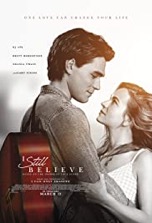
Starring: Britt Robertson
March 2020
Warning! This is NOT a movie review. This is a critique of the film. Intended to initiate a dialogue, the following analysis explores various aspects of the film and may contain spoilers. Views are my own and elaborate on comments that were originally tweeted in real time from the back row of a movie theater @BackRoweReviews. For concerns over objectionable content, please first refer to one of the many parental movie guide websites. Ratings are based on a four star system. Happy reading!
Based on the real-life experiences of singer Jeremy Camp, I Still Believe is a unique film in that it’s both heartbreaking and inspiring. That bittersweet dichotomy permeates every moment of this tragic love story, which also focuses on faith and family.
Jeremy Camp (K.J. Apa) and Melissa Henning (Britt Robertson) meet at a concert and it soon becomes apparent that their love is written in the stars. But the universe throws the young couple a curveball when Melissa is diagnosed with cancer.
To its credit, the story doesn’t degenerate into a melodrama when depicting its tragic events. There isn’t a false note during the film’s emotionally gut-wrenching passages, particularly those that take place in the hospital.
The film benefits from some superb acting. Though Apa and Robertson scintillate as the movie’s central couple, the supporting cast is equally impressive. Jeremy’s parents are portrayed by Gary Sinise and Shania Twain. One of Melissa’s sisters is played by Melissa Roxburgh, the star of TVs Manifest. In an ironic bit of casting, Cameron Arnett, who played a terminal patient in last year’s Overcomer, appears here as Melissa’s doctor.
The film is directed by the Erwin Brothers (Andrew and Jon), who also helmed last year’s surprise hit I Can Only Imagine; another biopic about the life of a musician, Bart Millard. In a refreshing gesture of paying it forward, Millard serves as one of this movie’s producers.
The Erwin’s have done an amazing job of making a modestly budgeted film feel like a prestige studio drama. Aerial shots, like the ones at Camp’s beachside concert, are impressive and surely weren’t cheap to film. The movie also boasts a diverse soundtrack and an affecting score by John Debney (The Passion of the Christ).
A two-hanky tearjerker, this film will have added significance for anyone who’s lost someone. It’s an eternally hopeful love story filled with music and more than its fair share of genuine, human moments.
In the end, I Still Believe is a moving true story of true love. It’s anchored by superb performances and features a story unafraid to ask some of the big questions about life…and death. And what it means to really believe.
Rating: 3 out of 4
The Shape of Water (R)

Starring: Sally Hawkins
December 2017
Warning! This is NOT a movie review. This is a critique of the film. Intended to initiate a dialogue, the following analysis explores various aspects of the film and may contain spoilers. Views are my own and elaborate on comments that were originally tweeted in real time from the back row of a movie theater @BackRoweReviews. For concerns over objectionable content, please first refer to one of the many parental movie guide websites. Ratings are based on a four star system. Happy reading!
The Premise:
While American and Russian agents seek to exploit a recently discovered aquatic life form for their own purposes, a lonely mute woman falls in love with the creature.
The Evaluation:
Del Toro, who brought us Pan’s Labyrinth, two Hellboy films and Pacific Rim, has perfected his craft with The Shape of Water (easily one of the most evocative movie titles ever), a Cold War, trans-species love story told through a skewed filter and delivered with a visual brilliance nearly unparalleled in recent cinema history. So let’s dive right in…Shape has many layers. If you think you’ve figured out what’s going on in the film’s text, there’s always the subtext to consider. The movie uses symbolism, thematic echoes, unexpected reverses, inverted stereotypes and modern parallels to great advantage. One conspicuous bit of symbolism involves eggs. Eliza Esposito (Sally Hawkins) uses an egg timer (in the shape of an egg) when boiling eggs and timing her activities in the bathtub, which also deals with reproduction (female eggs). When Eliza makes first contact with the creature, she gives it a hard-boiled egg as a gesture of friendship. Later, when she copulates with the dubiously compatible creature, Eliza consummates (literally and figuratively) the egg subplot, since having her physical needs met by another has freed Eliza from her tub prison (more symbolism). Eliza’s water habitat is the tub; the creature’s water habitats are the tube and pond. Eliza and the creature merge in three other bodies of water: her tub, her flooded bathroom and the bay of the ocean. Before we leave the egg timer metaphor, it’s worth mentioning that Eliza’s regimented existence is a reflection of our own in many respects, since daily routines and responsibilities (chores, shopping, cooking, working, paying bills, etc) can be their own special form of incarceration. Ironically, Eliza is just as much a prisoner as the creature is—freeing the creature will free her from her self-imposed prison of loneliness. There’s overt symbolism in the various reactions to the creature…when faced with the unknown, some will be filled with curiosity and others with fear (fight or flight). The conservative vs. liberal reactions to the creature are fairly transparent (and oversimplified) and reveal a clear bias against one of those political worldviews. Also clear is the movie’s pro-Russia, anti-America sentiment, which turns the Cold War on its head. American agents (particularly Michael Shannon’s Colonel Strickland) are loud, crass and aggressive, while the Russian agent (brilliantly underplayed by Michael Stuhlbarg, who, along with Shannon, was a cast member of HBO’s Boardwalk Empire) is reserved, calculated and sympathetic toward the creature. Strickland’s racist, nationalist, isolationist agenda is abhorrent and is a little too on-the-nose in its portrayal of adherents of the political party in question. Strickland is an angry man who’s in a loveless marriage; contrast his angry and messy love-making with the beautiful bathroom coitus between Eliza and the creature. Strickland also makes inappropriate advances toward Eliza, racist comments about Zelda Fuller (Octavia Spencer) and tortures the creature in his own, private Guantanamo (another political parallel). When the creature bites off Strickland’s fingers, the military man is more concerned with retrieving his severed digits than his wedding ring. His ring, and marriage by extension, isn’t precious to him (LOTR’s Gollum in reverse). All of this reveals Strickland, not the creature, as the movie’s bona fide monster. One curious side story involves Giles’ (Richard Jenkins) desire to matter in a world that’s passed him by. Giles painfully learns that he’s lived past his shelf date relationally (his attempts at wooing a young waiter implode) and occupationally (the sensibilities of his ad artwork have become outdated). This subplot touches on the ageism that exists in today’s job market and how marketing typically targets the youth of our society. As Eliza’s friend/neighbor/mentor, Giles serves a key role in the plot to extricate the creature. The message is clear; everyone has a part to play in the unfolding human drama. Though there are deeper zones to be explored in the film, this brief overview of the movie’s many layers of meaning should suffice in recommending it as an instant classic…and frontrunner for Best Picture.
The Breakdown:
Directing- Del Toro has delivered a visual masterpiece, which effectively combines a Cold War thriller with a fantasy romance. The formalism on display here is truly staggering.
Acting- The eclectic cast of top-tier performers (Shannon, Stuhlbarg, Jenkins, Spencer, David Hewlett and the brilliant Doug Jones) are completely upstaged by Hawkins’ mesmerizing, deeply-affecting portrayal of the lonely, lovelorn lead character.
Story- The script by del Toro and Vanessa Taylor is equal parts fantastical, historical, meaningful and magical. The allusions to classical Hollywood movies are a nice touch; they tangibly tap into feelings of nostalgia for that era. When taken at face value, Shape is just a fantasy film. However, the story’s many aspects contain plot points that the viewer might not even be aware of—which makes the film such an enjoyable, and immersive, experience.
Costumes/Make-up- The period appropriate costumes are well designed. The style of the creature’s costume hearkens back to the titular monster in Creature from the Black Lagoon (1954) and is brilliantly realized.
Cinematography- While it’s del Toro’s vision that makes the film cohere, it’s Dan Laustsen’s brilliant framing that provides much of the movie’s visual wonder and beauty. Who will ever forget the flooded bathroom love scene?
Music- Another exceptional score by Alexandre Desplat. Many of the cues written for Eliza’s character are whimsical and sublime. The underwater passages, where several flutes combine to produce an otherworldly effect, are moody and moving.
Visual FX- Other than the underwater scenes there are very few visual effects in the movie.
Production Values- Top-notch. Real world elements (with historically accurate detail) are seamlessly juxtaposed with fantastical elements (and even flourishes of the absurd like the refrigerator filled with slices of Key lime pie) to forge a wholly original world.
Movie Magic- Immeasurable. The brilliant visuals, pitch-perfect performances, superlative directing, affecting accompaniment, multivalent story and period appropriate production elements all make for an unforgettable viewing experience.
Rating: 3 ½ out of 4 stars
Call Me by Your Name (R)
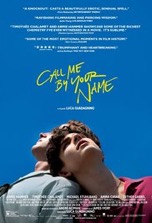
Starring: Armie Hammer
November 2017
Warning! This is NOT a movie review. This is a critique of the film. Intended to initiate a dialogue, the following analysis explores various aspects of the film and may contain spoilers. Views are my own and elaborate on comments that were originally tweeted in real time from the back row of a movie theater @BackRoweReviews. For concerns over objectionable content, please first refer to one of the many parental movie guide websites. Ratings are based on a four star system. Happy reading!
The Premise:
While on a summer internship in Europe, a young doctoral student falls in love with the professor’s son.
The Evaluation:
Based on the novel by Andre Aciman, Call Me by Your Name is a coming-of-age gay romance story set in Lombardy, Italy in 1983. The cinematography is gorgeous and is, along with the performances, the highlight of the movie. The downside here is a slowly paced film that has no antagonist, no major obstacles to overcome, no MacGuffin or overarching goal. The story meanders from one scene to another without really building tension, except for sexual tension between Oliver (Armie Hammer) and Elio Perlman (Timothee Chalamet). The only plot device that gives the film any urgency is the time constraint imposed on it from the beginning—Oliver’s internship is only for six weeks. The monologue at the end of the film, delivered with measured sagacity by Michael Stuhlbarg, brings the story into focus—if the movie has any meaning, it can be found in this brief heart-to-heart sequence between father and son. In the end, this is an art film in the purest sense. Its unconventional love story and controversial peach sequence will be the only things most people will remember about this film. And in case anyone cares, I prefer to be called by my own name. Thank you very much!
The Breakdown:
Directing- Luca Guadagnino makes the most of limited sets and locations and elicits fine performances from his cast.
Acting- The performances here are subtle and naturalistic. Chalamet’s brooding melancholy is a perfect counterpoint to Hammer’s existential insouciance. Stuhlbarg is the glue that holds the whole company together; his character serves as supportive father and inspiring mentor to the two leads.
Story- A fine script by James Ivory, based on Aciman’s book of the same name. Characters are finely drawn and the subtle subtext that reveals the inner motivations and desires of those characters is what sustains viewer interest in a story that has no real action or conflict.
Costumes/Make-up- Period appropriate.
Cinematography- Rather than employing aerial establishing shots of the Italian countryside, Sayombhu Mukdeeprom keeps everything close and intimate. The lens is kept tight on the performers, placing the burden on the cast to tell the story rather than on sweeping visuals, which, most likely, was dictated by the budget. The footage of the village captures its inherent European charm, and the interior shots of the house and exteriors of the backyard tether our thoughts and emotions to that one locale…like Oliver, we’re also sad to leave the house when he heads back to the States.
Music- The score is an eclectic collection of songs by various artists. The soundtrack also includes originals by Sufjan Stevens, who seems to whisper his songs rather than sing them. “Mystery of Love” is highly evocative and perfectly captures the film’s bittersweet ending.
Visual FX- NA
Production Values- An indie film that, fortunately, doesn’t feel cash-strapped.
Movie Magic- Depends on your preference of gender, genre and subject matter. Call Me doesn’t set the world on fire, but is a well made slice-of-life tale that’s festooned with beautiful locations and mesmerizing performances. However, its inclusion in the Best Picture category seems political since there are many other worthy films to consider this year, such as: Molly’s Game, The Florida Project, The Disaster Artist, Last Flag Flying and I, Tonya.
Rating: 3 out of 4 stars
La La Land (PG-13)
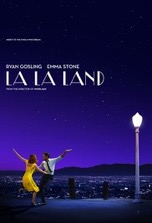
Starring: Ryan Gosling
December 2016
What follows is the full-length review based on comments that were originally tweeted in Real-time from the back row of a movie theater @BackRoweReviews. Though efforts were made to tease rather than ruin this movie’s memorable lines and moments, some spoilers may exist in the following evaluation. For concerns over objectionable content, please first refer to one of the many parental movie guide websites. Ratings are based on a four star system. Happy reading!
During the opening musical number in La La Land, appropriately staged on a L.A. freeway, I thought: “Dear God, what have I gotten myself into?” Based on that intro, I thought the remainder of the movie would be comprised of similarly elaborate musical numbers performed at regular intervals throughout the film. Much to my relief, I was wrong. The movie quickly transforms into an engaging romance/drama with only the occasional song and dance number interspersed throughout the narrative. What ensues is a follow-your-dreams tale where Sebastian (Ryan Gosling), a struggling piano player, wants to open his own jazz club and Mia (Emma Stone), a frustrated barista, wants to become a famous actress. Writer/director Damien Chazelle cannily delays the romance between Sebastian and Mia by arranging a series of anti-meet cutes, which should be a sign to the couple that their love affair is destined to be ill-fated. Casablanca (1942) is referenced a few times in the film and holds obvious significance for the star-crossed couple, particularly in how both films end. LLL seeks to tap into the brilliance of such masterpieces as Casablanca for its dramatic passages and Singin’ in the Rain (1952) for its musical routines. The film is brimming with classical Hollywood nods like the old film posters that adorn the walls of Mia’s bedroom and the Sebastian and Mia’s screening of Rebel Without a Cause (1955) at the Rialto Theater. As such, LLL is a reimagining of the Hollywood musical, a largely retired genre. Ironically, relying so heavily on Golden Age Hollywood themes and iconography has proven to be a double-edged sword for the film. On the one hand, the heavy quotation of vintage films has established the film’s look, mood and atmosphere as well as produced feelings of nostalgia in viewers enamored with such films. On the flip side, it could be argued that the film relies too heavily on early Hollywood tropes and that such an effort was done intentionally, to play on viewer’s emotions and to pander to those in the industry, particularly Academy members. Either way, LLL fails to achieve its goal since it doesn’t adhere to classical modes of storytelling. Indeed, the movie is a mélange of genres (comedy/drama/musical/romance) and is, perhaps, too ambitious for attempting to combine so many disparate story elements. One of those aspects is the jazz appreciation subplot. Whereas keeping the arts alive is an important endeavor, the obvious validation of jazz as an essential, vibrant art form is foisted on the audience and such advocacy is just one more objective the film tries to accomplish. Though many of the film’s romance scenes feel trite, Chazelle’s concluding “the life that would have been” parallel action device is brilliantly executed and infuses the film with an unexpectedly bittersweet resolution. In the end, LLL’s story is the only thing that holds it back from becoming an instant classic. The film’s directing, acting, production values, locations, cinematography and music (especially Justin Hurwitz’ “City of Stars,” which has a wistful “Moon River” quality) are all off the charts. Gosling and Stone’s (in their third movie collaboration) screen chemistry is so searing it nearly makes the film melt, something that actually happens during Sebastian and Mia’s screening of Rebel. There’s far more that works here than doesn’t, and at the end of the day, the film’s unique vision has broadened the appeal and potential for the modern musical. LLL seems to be a strong contender to win Best Picture. It just depends on what Academy voters are in the mood for this year: depressing drama (Hell or High Water, Manchester by the Sea, Moonlight), historical biopic (Hacksaw Ridge, Hidden Figures), inspiring true story (Lion), space invasion flick (Arrival), converted stage drama (Fences), or this film. We’ll find out soon enough.
Passengers (PG-13)

Starring: Jennifer Lawrence
December 2016
The below comments (in Black) were originally tweeted in Real-time from the back row of a movie theater and appear @BackRoweReviews. Though efforts were made to tease rather than ruin this movie’s memorable lines and moments, some spoilers may exist in the following evaluation (in Red). For concerns over objectionable content, please first refer to one of the many parental movie guide websites. All ratings are based on a four star system. Happy reading!

Pod 1498 contains some guy named #Starlord. #Avalon #HomesteadII
“Just own it, Jim.” #OwnIt
A lot of similarities to #WALLE, especially the score by #ThomasNewman. #Autopilot #Axiom #Avalon
“I woke up too soon.” Jim is a bit of an #EarlyBird. #Avalon
“It’s not possible for you to be here.” That’s the point, #RoboTender. #Glitch
No #PumpkinSpice on the #Avalon? There goes the future.
The #SpaceLeap scene is absolutely breathtaking.
Jim trips on a bottle...it’s been the downfall of many men.
“It sure has a nasty sense of humor.” #Universe
#Aurora Overdetermined sci-fi name?
“The ultimate geographical suicide.” #SpaceHibernation #Avalon
Most amazing swimming pool in the universe.
Holding hands among the stars...best first date ever.
“You’re the most beautiful woman I’ve ever seen.” Every man left on Earth agrees with you, Jim.
Loose-tongued bartender ruins Jim’s proposal. #PlotTwist
Public Service Announcement: Never go swimming in #ZeroGravity. #Avalon
612 physical disorders. Oh Frack!
The #Avalon is supposed to be #Meteor proof. Yeah, and the #Titanic was supposed to be iceberg proof.
Those last ten minutes were heart-stopping.
Final analysis: a #Titanic meets #WALLE lost in space yarn with scintillating central performances.
The only drawback here is its derivative plot.
Rating: 3 1/2 out of 4. #JenniferLawrence and #ChrisPratt have tremendous chemistry in this space survival story.
Freebie: the 3 dits, 3 dahs and 3 dits on the poster is #MorseCode for #SOS.
What if a man was accidentally awakened from a suspended animation nap ninety years earlier than planned? What if that man, the only conscious person aboard a gigantic spaceship headed for a distant planet, went bat guano crazy from being alone all the time? What if the man watched the video profiles of the 5,000 passengers on the ship and fell in love with one of the women? And what if that man, in the throes of loneliness and boredom, decided to rouse that sleeping beauty from her pre-programmed slumber? Such is the set up for the new sci-fi/romance movie, Passengers. Starring Jennifer Lawrence and Chris Pratt as star-crossed lovers who must negotiate the bitter realities of premature reanimation, the film is a master course in male/female relational dynamics in survival situations. The two stars have tremendous screen chemistry and nearly carry the entire movie by themselves—nearly. Michael Sheen and Laurence Fishburne play side characters who offer stellar support to the central couple, providing them with much needed advice and experience…and bridge access. There really aren’t enough superlatives to describe Lawrence and Pratt’s performances, so I’ll move on to an area of the movie I can critique. As is the case with many movies these days, the writing here is a mixed bag. Screenwriter Jon Spaihts is exceedingly adroit at evincing character motivations and habits and has skillfully infused the film with a tremendous amount of humanity despite its sterile, mechanical trappings. There’s a firm grasp of human relationships in the movie and the characterizations are flawless down to the most infinitesimal nuance. The romance subplot is sweet without being saccharine—the scenes where Aurora (Lawrence) and Jim (Pratt) have their first breakfast and first date are real gems. Commentary on class structure is cleverly woven into the narrative, like when we see Jim’s standard breakfast placed alongside Aurora’s Gold Star breakfast. The fact that Jim is an engineer and Aurora is a writer who comes from a family with means and status also addresses the inequities of humanity’s current caste system. Arthur (Sheen), the robot bartender, dispenses many keen observations on the human condition along with clever quips which add the appropriate amount of humor to this mostly serious film. Whereas Arthur brings the comic relief, Gus Mancuso’s (Fishburne) tragic sidebar furnishes the film with poignant pathos. The scenes where Aurora gives Jim the silent treatment are deftly crafted by Spaihts and expertly acted by Lawrence, who brings these scenes to life with startling realism (as any man who’s ever been spurned by a woman can attest). The prospect of dying alone in space versus the ethical dilemma over reviving a potential companion (which will consign her to a life of isolation) is the crux of the film and the implications of Jim’s fateful choice have profound ramifications on the entire story. One of the movie’s subtly stated motifs suggests that when our life’s aspirations go unrealized it’s how we choose to cope with our Plan B existence that defines us as individuals. Ultimately, Aurora (an overdetermined sci-fi name?) gets to write an exclusive, historic story, but it isn’t the one she had originally envisioned. Sadly, powerful takeaways like this one are overshadowed by contrived crises (like the escalating calamities that comprise the film’s conclusion), plot inconsistencies (Jim can browse personal personnel files and borrow a space suit, but is denied access to the bridge and can’t order a decent breakfast) and the movie’s Achilles’ heel…derivative storytelling. Aside from its “Adam and Eve in Space” premise, Passengers weaves elements from many other movies into its narrative tapestry. The most obvious thematic antecedent to this film is Titanic (1997). Both stories feature an upper class woman and a lower class man who fall in love on their way to a new world, but their ship encounters a dangerous obstacle along the way which threatens their survival. The obstruction in Titanic is an iceberg; here it’s an asteroid field. Perhaps the biggest source of inspiration for this film is WALL-E (2008). Both films feature long-range, resort style space vessels (with similar names—Axiom in WALL-E and Avalon here) which are conveying humans to a new planet since Earth is in a state of decay. These movies also employ an antagonistic autopilot which serves as a hindrance to our heroes. Additionally, Jim’s thrilling leap into space is reminiscent of WALL-E’s frolic among the stars. The final point of comparison between these films is that their scores have a similar style, which is fitting since the composer for both films is Thomas Newman. In addition to its pastiche plot, Passengers has an overwrought resolution, which is merely a series of near-death scrapes designed to produce a heart-pounding climax. This gimmicky ending is unnecessarily commercial and is incongruous with the rest of the film, which is essentially a big budget art film. A more contemplative denouement was in order here—one where we meet Jim and Aurora’s progeny and where we hear Aurora reading an excerpt from her book in a V.O. narration as the Avalon arrives at Homestead II. This emotionally complex and thought-provoking yarn deserved that kind of powerhouse finale—the extant epilogue is pat and merely satisfactory. Final thought: have you ever seen a more breathtaking pool? Or swimmer?
Learning to Drive (R)
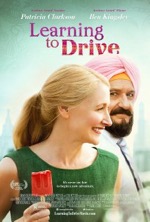
Starring: Patricia Clarkson
August 2015
This review was originally tweeted in Real-time from the back row of a movie theater and appears @BackRoweReviews. Though efforts were made to tease rather than ruin this movie’s memorable lines and moments, some spoilers may exist in the following evaluation. The original tweets appear in black, while follow-up comments appear in red. For concerns over objectionable content, please first refer to one of the many parental movie guide websites. All ratings are based on a four star system. Happy reading!

Or as Kingsley’s Darwan says, “Seatbelt first.”
“Driving is a freedom.” One that can be revoked for idiots.
Many people need to be reminded that driving is a privilege not a right and that a license can be revoked at any time. There, I’ve made my point. Idiots!
The #TaxicabConfessions style opener is heartbreaking.
And an accurate portrayal of what cabbies must deal with as part of their job. No thanks.
“The third itch.” Male menopause. #Manopause
Every seven years. Kinda’ like Vulcans and Pon Farr.
“Teach yourself to see everything.” No easy task.
Especially for people who suffer from ADD/ADHD.
A #SkankMachine. Amusing.
And just like the tantalizing treats in a vending machine, flings only meet an immediate need and are nothing more than empty calories for the soul.
“It’s like asking me to move out of me.” Sad.
A spiteful spouse will use anything they can to inflict emotional pain during a divorce.
“I think it’s time to discuss road rage.” Ha!
Kingsley is masterful in his portrayal of an Indian man. Of course, he’s had plenty of practice. Gandhi (1982).
“Rear entry.” Check!
Not even gonna’ touch this one. Ew!
Peligro. Right motive, wrong language.
How terrifying would it be to live in a country where you didn’t know the language, customs, etc.?
“Goodbye Wendy.” Illegal hands to the face.
A really telling scene. Clearly Darwan has feelings for Wendy, but those feelings will have to remain unexplored due to his circumstances.
“You’re my faith.” Touching moment.
Whereas it’s inadvisable to put your faith in a person, I understand and agree with Wendy’s sentiment here. An extremely bittersweet resolution.
Final analysis: a feel good drama about finding the courage to overcome the painful transitions in life.
Rating: 3 out of 4. Superb central performances & a heartwarming story make this a crowd-pleasing winner.
Let’s face it…there isn’t anything earth-shattering about this movie. The family drama meets collision-of-cultures premise has been done many times before in movie history. Elevating such a project above the morass of similarly themed films requires, among other things, stellar lead performances. This movie certainly delivers on that front with superb turns by Patricia Clarkson and Ben Kingsley, two actors you wouldn’t naturally match up as a possible love interest, but who are marvelous together here. It’s not just the A-list actors who deserve credit, though: Grace Gummer (The Newsroom), Jake Weber (Hell on Wheels) and Sarita Choudhury (Homeland) also shine in their supporting roles. A solid assist also comes from the many NYC locations, which visually festoon the film while grounding the story in a strong sense of place. Another plus here is the judicious placement of cultural (Indian) insights into the story line, which provide diversity and authenticity to the proceedings. However, what really sets this film apart from others of its ilk is its unique riffs on dramedy tropes. The first expectation shattered here, and the trailer was more than a little disingenuous on this count, is that this is a romance film. As the plot unfolds, it becomes evident that Wendy (Clarkson) and Darwan (Kingsley), who meet via a chance encounter and develop an unlikely friendship, have feelings for each other. Those feelings, however, remain unrequited due to timing and propriety: Clarkson is in the throes of a divorce while Kingsley is just jumping (literally, since he ties the knot one day after meeting his bride) into a marriage—arranged, of course, as per cultural dictates. The wistful yearning the characters have for each other is palpable and the chemistry between them is undeniable. The fact that this slice-of-life story doesn’t degenerate into romantic drivel is really what recommends it the most. Another story element that eschews the typical cutesy or lazy storytelling often found in this brand of light drama is when Clarkson’s daughter, Tasha (played by Meryl Streep’s daughter, Gummer), asks if she can live at home with mom after experiencing a painful breakup with her boyfriend at college. Recently separated Wendy is in need of companionship, so this plan seems like a natural, mutual resolution to the felt-needs of both mother and daughter. However, Clarkson turns down her daughter’s request and affirms that returning to college, where Tasha will soon develop new friendships and romantic interests, is really the best thing for her. It’s a great moment that flies in the face of convention and is 100% schmaltz free. The final narrative changeup is when Wendy says her faith rests in Darwan, which precludes any kind of relationship with him since he’s married. Again, the writers don’t resort to pat or contrived solutions, so kudos to them for taking the narrative high road. While the sentimental set will surely grow frustrated by these less-than-ideal plot choices, those who prefer realistic stories with genuine emotions should thoroughly enjoy this honest, straightforward portrait of individuals who are attempting to embrace new beginnings while coping with life-altering challenges. Or to put it a different way, the movie is really just about learning how to suck it up and drive on.
The Age of Adaline (PG-13)
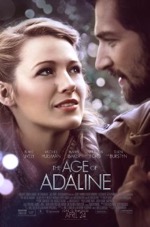
Starring: Blake Lively
April 2015
This review was originally tweeted in Real-time from the back row of a movie theater and appears @BackRoweReviews. Though efforts were made to tease rather than ruin this movie’s memorable lines and moments, some spoilers may exist in the following evaluation. The original tweets appear in black, while follow-up comments appear in red. For concerns over objectionable content, please first refer to one of the many parental movie guide websites. All ratings are based on a four star system. Happy reading!

“The first and last chapter of her story.”
From that description, you’d think the narrator was referring to someone with a short lifespan, but nothing could be farther from the truth.
Adaline has five locks on her door. Not very trusting for an immortal.
In a later scene I did a recount and I think there might actually be six locks on her front door. But who’s counting?
“Magical” lightning bolt makes Adaline immortal. #OriginStory
Here’s the element that makes this a sci-fi story. It’s hokey, but no more so than the conceits behind The Curious Case of Benjamin Button (2008) or The Time Traveler’s Wife (2009), etc.
“Since I Don’t Have You” by #TheSkyliners. My dad’s favorite song.
I’d recognize it anywhere.
Adaline does her best #SherlockHolmes routine on a young suitor. #SolidDeductions
Ellis should quit while he’s behind. But he doesn’t. And so the story continues.
“Jenny kissed me.” Not familiar with that poem. But then, I’m not a know-it-all.
Truth be told, my knowledge of poetry is next to nil. Guess that means it’s time for me to take a rhyming pill.
Ellis keeps sticking his hand where it doesn’t belong. A dangerous habit for a professional painter.
Turns out Ellis isn’t a professional painter after all, he was just painting his flat. But to be honest, I’m not really sure what he does for a living. Seems like Ellis is a jack-of-all-trades sort.
“I don’t like having my photo taken.” And with good reason.
I don’t like having my photo taken either, but not for the same reasons as immortal Adaline...obviously.
A horse that can pitch? #DumbestJokeEver
But sometimes jokes are so dumb they’re actually funny. Such is the case here, much to Ellis’ relief.
Adaline has a pet photo album. Her priority is pets over people. The curse of immortality.
While pets have a shorter lifespan than humans, you don’t have to worry about them learning your secret. Plus, you can take them with you when it’s time to reinvent yourself in a new area.
An indoor, outdoor theater. Fascinating!
Placing the luminescent stars on the ceiling is a nice touch and certainly enhances the overall mood.
Ellis says Jenny has nine lives. Not far off the mark.
Superb acting by #HarrisonFord when he meets Adaline/Jenny. #StateOfShock
Scenes like this should come as no surprise, but sometimes the mind drifts to Indy and Han and we forget what a tremendously talented performer Ford really is.
“It was fleeting, inconsequential.” Nice cover.
I mean, he named a comet after her for crying out loud.
Never challenge an immortal to a game of #TrivialPursuit.
Kiss your winning streak goodbye, William.
Of comets and proposals. #NearMiss
A really good scene. Superbly performed and rife with meaning.
Scars don’t lie.
“You’ve lived, but you’ve never had a life.” The price of immortality.
You can never live up to your fullest potential if you’re always looking over your shoulder.
“Nothing makes sense without her.” #TrueLove
“My name isn’t Jenny.” The cat’s about to come out of the bag.
I was hoping she wouldn’t spill the beans here, but if she hadn’t, the movie would’ve run at least another half hour.
First gray hair...normally not a cause for celebration. Unless you haven’t aged a day in over 100 years.
I was less than thrilled when I plucked my first gray, but then again, I’m a vain man.
Final analysis: a thoughtful examination of mortality and the human experience.
Shades of #ForeverYoung and #TheCuriousCaseOfBenjaminButton, but with its own unique twist.
By featuring main characters who, in some regard, exist apart from the normal flow of time, these types of films make us stop and take a long, hard look at our lives. By identifying with these characters, we gain an outsider’s perspective on our own lives, which reminds us just how precious a commodity time really is.
Rating: 2 1/2 out of 4. A farcical romance with Sci-Fi trappings. Has a message, but is fairly unmoving.
So the basic premise here, a woman achieves immortality after drowning in freezing water and being resuscitated by a well placed, well timed lightning bolt, is as unbelievable as they come; a story right out of a classic sci-fi pulp digest. The narrated narrative itself, which spans a century, reveals the plight of Adaline Bowman (Blake Lively) as she moves through time without aging and without making any serious connections with people for fear of growing too close to someone that she’ll have to run away from when her wrinkle free skin betrays her to aging “contemporaries.” The movie’s inciting incident occurs when Adaline unwittingly falls in love with Ellis (Michiel Huisman), a relationship she knows is ill-fated from the outset but is helpless to resist. Further complicating the story is the “meet the parents” scene where Ellis’ father, William (Harrison Ford), recognizes Adaline from the past. As a one-time lover of Adaline’s, William’s random reunion with the ageless woman explodes the implications of the story. The movie splits its time between four genres: Drama, History, Romance and Sci-fi. In many respects, the story feels like it was written by Nicholas Sparks, which screenwriters J. Mills Goodloe and Salvador Paskowitz should take as a compliment. The sci-fi elements are of the softer variety, resembling the works of Fitzgerald more than those of Wells. The former wrote the story-turned-movie The Curious Case of Benjamin Button (2008), a tale about a man who ages backwards. Here, the title character maintains a normal temporal trajectory, but will forever remain untouched by the ravages of time. The period elements are extremely well done and have attained the appropriate degree of authenticity to keep us engaged in the story’s fantasy. The acting is also superb. Ford’s portrait of a man yearning for the past and pining over the life that might have been is truly exceptional, and Kathy Baker, as Ford’s jealous wife, is also terrific in an ancillary role. Lively delivers a genuine, understated performance that very easily could’ve ended up being mawkish in the hands of a less skilled actor. At times, Lively’s Adaline seems detached or aloof. Such muted emotions are not only appropriate, but are keen observances of human behavior since an ageless woman would learn very quickly how to suppress her feelings in order to protect her identity as well as safeguard against over-investing in the lives of mere mortals. In the end, this film won’t set the world on fire, but it’s an intriguing examination of the human condition with respect to our perception of time and our own mortality. The underlying question “What good’s immortality if you can’t even enjoy it?” permeates this bittersweet tale. Fans of Sparks style decade-spanning romances should find the film heartfelt and emotionally satisfying. Those who appreciate finely mounted slice-of-life stories should also enjoy the film. But those who would prefer that sci-fi elements be kept out of their down-to-earth dramas might feel left out in the cold.
The Theory of Everything (PG-13)
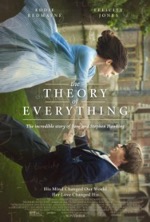
Starring: Eddie Redmayne
November 2014
This review was originally tweeted in Real-time from the back row of a movie theater and appears @BackRoweReviews. Though efforts were made to tease rather than ruin this movie’s memorable lines and moments, some spoilers may exist in the following evaluation. The original tweets appear in black, while follow-up comments appear in red. For concerns over objectionable content, please first refer to one of the many parental movie guide websites. All ratings are based on a four star system. Happy reading!

Science meets Arts at a party.
They say opposites attract. Here it’s not only a contrast in field of study but also in political/religious views.
A test to separate the quarks from the quacks. Amusing.
David Thewlis, best know for his portrayal of Remus Lupin in the Harry Potter movies, is a really good journeyman actor and is perfect in the role of Hawking’s professor.
“Celestial dictator.” Hawking’s rather unflattering moniker for the Almighty.
He finds “your lack of faith disturbing.”
“A false conclusion.” True love, however, can never be false.
Proof positive that love isn’t logical or quantifiable. It’s the only thing in the universe that an equation can’t solve. In short, love is the theory of everything. A curious aside: in John Nash’s (Russell Crowe) final speech in A Beautiful Mind (2002), he refers to “the equations of the mind” and credits love as the answer and solution to life’s mysteries. Two brilliant contemporaries arriving at the same conclusion. Fascinating!
Chapter four is “brilliant.” Secures Hawking’s professorship.
Chapters 1-3? Eh.
Need stress relief? Join the church choir.
Hawking’s wife eventually does find relief from her stress…in the arms of the choir director. Scandalous? Look two tweets ahead.
A lesson in pees and potatoes.
Some of the science goes right over my head, but the vacillation of theories regarding divinity is amusing. First Hawking proves the existence of God and then the scientist kills the Almighty. Don’t worry, Stephen, He believes in you even if you don’t believe in Him.
Hawking gives his wife a hall pass.
That was really big of him. Sheesh, I didn’t mean it like that.
A spelling board...how quaint. And crude. What a torturous way to communicate.
Seems like an alphabet chart with a pointer or even a Ouija board would be more efficient.
Hawking slips into a coma...his own personal black hole.
“That is for a friend.” Nice cover.
Oops, I guess that’s a double entendre.
A dot matrix printer. What a blast to the past.
Slow, loud printing. Hard to read. Perforated edges that you had to tear. Don’t miss it at all.
“Look what we made.” Touching.
Final analysis: a bittersweet biopic that deals with personal tragedy and life’s big questions.
Rating: 3 out of 4. An inspirational tale and an astounding, body-wracking performance by Redmayne.
As a film that focuses on the extraordinary life and career of renowned theoretical physicist, Stephen Hawking, the story is exactly what you’d expect it to be: a chronological, cause and effect period piece with fine performances and a plot that’s diligently moored to the actual account. Some will consider this middle-of-the-plate approach to be acceptable while others will regard it as inexcusably uncomplicated and lacking in imagination. In either case, the plot is a linear progression of significant moments in the mathematician’s life and, as would be expected, the narrative proceeds in a very logical and methodical manner. Save for Hawking’s occasional mental flash of celestial lucidity, there’s very little style here. Since much of the story focuses on Hawking’s preoccupation with time, it would’ve been effective, even fitting, if the story had employed flashbacks, flash-forward’s, disjointed continuity or other causal devices in reflecting the fluid nature of the movie’s temporal plot. Mind you, I’m not advocating a reverse polarity plot like in Christopher Nolan’s Memento (2001), but maybe something with leaps forward or backward in time like TVs Lost would’ve served the movie in good stead. Standard storytelling choices aside, any serious discussion of the film begins and ends with Eddie Redmayne’s mesmerizing, transcendent portrayal of the ALS afflicted central character...due to the inherent physical demands of the part, Redmayne justly deserves the Oscar nod he’s received for this role. Redmayne’s nuanced, effortless depiction of Hawking’s gradual physical deterioration is a study in brilliance. It’s a performance that exacted a considerable toll from the actor—the contortions required to mimic Hawking’s degenerative condition must’ve been agonizing to model and maintain. Somatic challenges aside, Redmayne’s facials reveal a man who appears to be virtually unaffected by his malady. If this portrayal is accurate, Hawking is far more jovial and enthusiastic about life than most of us would be in his position. The fact that Hawking can still smile at all is truly inspirational. All in all, this is a decent film that’s a fitting tribute to one of the brightest minds of our generation. However, the movie lacks the narrative savvy required to effectively convey its chrono-centric theme. The logic over emotion methodology has resulted in a film that fails to make any deep, lasting connection with its audience. So, will this film go down as one of cinema’s finest biopics? Time will tell.
Magic in the Moonlight (PG-13)
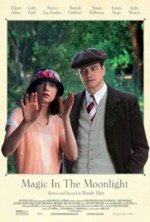
Starring: Colin Firth
August 2014
This review was originally tweeted in Real-time from the back row of a movie theater and appears @BackRoweReviews. Though efforts were made to tease rather than ruin this movie’s memorable lines and moments, some spoilers may exist in the following evaluation. The original tweets appear in black, while follow-up comments appear in red. For concerns over objectionable content, please first refer to one of the many parental movie guide websites. All ratings are based on a four star system. Happy reading!

Watch very closely.
Asian Firth makes an elephant disappear. It’s all part of the show.
Big deal, I once saw David Copperfield vanish a car right in front of me in Vegas.
The great debunker accepts the challenge of exposing a spiritist as a fraud.
Firth meets “a visionary and a vision.”
Hamish Linklater’s (The Crazy Ones) character, who is under the profoundly misguided delusion that he’s actually won Stone’s heart, is so corny you just have to pity him.
Firth’s description of ectoplasm is hilarious.
And completely inaccurate if we’re to believe the science in Ghostbusters. Which, of course, is the authority on the supernatural substance in question, right?
A séance followed by some “hot music.” An average evening.
If you’re the Addams family.
The “agreeable features” exchange is hilarious.
Firth channels Mr. Darcy’s smugness in this scene. With all due respect to Sir Laurence Olivier, nobody played Darcy better than Firth.
Press conference...Firth puts his reputation on the line.
You can guess what happens next.
We’re all part of a greater design. Firth’s prayer is heartfelt...for a moment.
The long take conversation between Firth and his aunt over Firth’s prospects is absolutely brilliant.
This scene is 101 for how to beat around the bush and avoid true feelings. It’s also 101 for great acting and directing.
“Sophie, will you marry me?” One tap for yes.
The first time I saw this “One tap yes, two taps no” system was in the original Star Trek two-parter “The Menagerie,” when crippled Captain Pike used a similar system of flashing lights to communicate to Mr. Spock and company. Obviously this movie is a world away from the final frontier, but this brand of non-verbal communication jogged a memory. No extra charge.
Final analysis: a beautifully filmed period piece with superb performances and a witty script.
The gorgeous location work in France is a tremendous boon to the film…along with period appropriate clothing, cars, observatories, etc.
A clever take on the age-old debate over science versus faith.
And if you know anything about Allen’s beliefs, you’ll know exactly which side of the argument he lands on in the end.
Rating: 3 out of 4. Though predictable and uncomplicated, there’s definitely some movie magic here.
This is the 50th film (according to IMDB and including TV films) directed by Woody Allen. Although he doesn’t appear in this movie, Allen wrote the screenplay (of course) and his signature witty, snappy dialog reigns supreme throughout this tale of unconventional romance, devious motives, shifting convictions, misdirecting mysticism and preternatural prestidigitation. Other than some new stars, Colin Firth and Emma Stone, and the 1920s milieu, the movie is business as usual for Allen. That assertion certainly isn’t a disparagement of the film; if anything, it’s a testament to the consistent quality of Allen’s projects over the years. Other than the production aspects I praised above, my only observation of the movie is how its love story parallels the one in My Fair Lady (1964). Consider: older, refined man paired up with an uneducated ingénue. The man constantly belittles the woman, but is secretly in love with her. The man learns what he’s been missing in life while being drawn deeper into the wonderful mysteries of the woman’s world. The final scenes in both movies are staged exactly the same, and although the reaction of the two men is quite a bit different, the end result is favorable in both cases. This contrivance, along with the criticisms listed after my rating, are the only real drawbacks here. In the end, this is another superlative work by one of the finest auteurs of our time. This film lives up to the charm and enchantment evoked by its title. Although its characters may engage in acts of legerdemain, the story itself has nothing up its sleeve.
Begin Again (R)
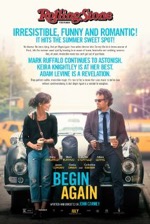
Starring: Keira Knightley
July 2014
This review was originally tweeted in Real-time from the back row of a movie theater and appears @BackRoweReviews. Though efforts were made to tease rather than ruin this movie’s memorable lines and moments, some spoilers may exist in the following evaluation. The original tweets appear in black, while follow-up comments appear in red. For concerns over objectionable content, please first refer to one of the many parental movie guide websites. All ratings are based on a four star system. Happy reading!

Vision, not gimmicks. The opposite of most entertainment these days.
Especially big budget blockbusters.
The imaginary arrangement that’s constructed around Knightley’s acoustic song is brilliant.
I envy people with such musical mutant powers.
The new song garners a slap from the mind reader.
Never underestimate the power of women’s intuition.
Record every song at a different location. A unique concept.
And a logistical nightmare. Probably the reason why no one’s ever done it before.
“Hold on” section with the kids is a nice moment.
Well worth the $5 per kid for their services.
Listening to Knightley’s playlist via a special splitter. Recreating a magical moment.
This musical montage is the highlight of the film. The sequence is the audio/visual equivalent of a warm embrace.
The kazoo solo is hilarious.
I used to play one as a kid, but I’m out of practice. I need to get my chops up.
A buck for a book is a risky proposition. An amusing coda.
I love it when we get additional story during the end credits and not just silly outtakes.
Final analysis: like Once, this is a song-centric film with strong character beats and fine performances.
The songs Knightley’s character sings have a Norah Jones or Colbie Caillat quality to them and should prove listenable, and perhaps even enjoyable, for most viewers.
Like the music it features, the film is a stripped-down drama that reminds us of what pure artistry really is.
Rating: 3 out of 4. A charming turn by Knightley & a new career watermark for Ruffalo. Plus some catchy tunes.
From director John Carney, who brought us the similarly themed and structured Once (2007), comes Begin Again, a dramatic and romantic movie that can’t really be classified as either. Nor can it be called a musical, despite the fact that it has just as many full songs as most musicals. Genre quandaries aside, what’s readily apparent is the movie’s easy manner and affable characters (and the picturesque location footage shot in NYC doesn’t hurt either). Besides its toe-tapping melodies, the film’s greatest asset is its deftness at avoiding standard rom-com clichés. For starters, there really isn’t a romance in the film since Knightley breaks up with her singer boyfriend, Dave (Adam Levine) and, thankfully, never hooks up with Ruffalo (eww!). The movie also does a good job of avoiding mawkish episodes: a scene near the end sets up the opportunity for an emotionally gratifying (and gratuitous) moment when Dave invites Knightley to the stage during a concert (the same exact scenario occurs when Hugh Grant coaxes Drew Barrymore to the stage in the 2007 film Music and Lyrics). Against our expectations, Knightley listens in the wing for a few minutes and then leaves. That’s just one example of how Carney (who serves as sole writer) diligently worked to keep his story free of contrivance. So then, no matter which genre Begin belongs to, file it in the feel-good music movie section, and those who stumble upon this indie winner will be completely satisfied.
The Fault in Our Stars (PG-13)

Starring: Shailene Woodley
June 2014
This review was originally tweeted in Real-time from the back row of a movie theater and appears @BackRoweReviews. Though efforts were made to tease rather than ruin this movie’s memorable lines and moments, some spoilers may exist in the following evaluation. The original tweets appear in black, while follow-up comments appear in red. For concerns over objectionable content, please first refer to one of the many parental movie guide websites. All ratings are based on a four star system. Happy reading!

“A roller coaster that only goes up.” Where’s the fun in that?
And, technically, is that even a real roller coaster? I mean, most of the enjoyment comes from the drops, twists and turns, right?
Gus introduces his parents to “Just Hazel.”
Actually, Gus introduces her as “Hazel Grace.” Gus’ dad calls her “Just Hazel.” Apologies for the inaccuracy and confusion.
Okay is the new always.
Gus takes Hazel to a skeleton playground for a picnic.
Skeletons signify death…overdetermined imagery considering the movie’s subject matter? The bit about Hazel wasting her wish is very amusing, though.
The conversation on the “sad swing set” contains some killer dialog...and some incredibly raw emotion.
The grenade metaphor is particularly powerful. And speaking of metaphors…
Gus is told to put out his metaphor on the plane.
A non-metaphor flight? Airlines are getting so picky these days. Next thing you know, they’ll have non-humor flights. Oh wait, I’ve been on a few of those.
Answer day in Amsterdam.
A very unromantic location for the first kiss.
Which is the irony of the scene. If Hazel wasn’t breathless after her long ascent up several flights of stairs, I’m sure she was after that kiss.
The pre-funeral scene is deeply moving. The line about a “limited infinity” is staggering visceral.
Any criticism of the movie’s bent toward sentimentality will have this scene in its crosshairs. The sole purpose of this melodramatic sequence is to tug on the heartstrings...and it works like a charm. Correction: “little infinity.”
Hazel experiences her great and terrible 10.
Wow, that last “okay” went through me like an electric shock.
As a key ingredient in the title, director Josh Boone cleverly uses stars as a recurring theme/symbol throughout the movie. How fitting that the movie should conclude with Hazel looking up at the starry host with its scintillating beauty reflecting in her eyes.
Final analysis: a film preoccupied with death that somehow ends up being life-affirming.
A sobering reminder of the brevity of life and the things that matter most in it.
Rating: 3 out of 4 stars. Could’ve been melodramatic, but strikes all of the right chords emotionally.
Based on the wildly popular book of the same name by John Green, Fault follows a courageous young woman on her mission to discover why she is made to suffer from a terminal condition. Although emotions here are real, and occasionally raw, some will undoubtedly find the more melodramatic aspects of the plot to be unbearably schmaltzy. To those hardened critics I say, “Get a heart!” In my estimation there’s only one scene (mentioned above) that even comes close to being maudlin, and the overall story seems far less interested in trumpeting the injustices of individuals living in the throes of cancer and fully invested in telling an intimate story of one person’s plight and how others in her orbit are affected by her infirmity. The story, adapted by Scott Neustadter and Michael H. Weber, is never contrived or stilted and adroitly avoids the mawkish pitfalls that so many other films of this kind unwittingly stumble into. Besides the exceptional performances of the star-crossed lovers, Shailene Woodley and Ansel Elgort, the film’s greatest asset is its dialog, presumably lifted wholesale from the book. I remember hearing one such line in the trailer, “You trying to keep your distance from me in no way lessens my affection for you.” I thought, Wow this is going to make a great movie. Fortunately, my initial assessment of the film holds up thanks to a movie brimming with such great lines and accompanied by genuine performances and a truly touching story. This certainly isn’t an easy film to watch at times, but its veracity reveals the bitter reality that fate can’t be cajoled or controlled. Barring a few sentimental moments, this movie presents an inspiring and heartwarming story that’s really hard to find fault with.
Walking with the Enemy (PG-13)

Starring: Jonas Armstrong
April 2014
This review was originally tweeted in Real-time from the back row of a movie theater and appears @BackRoweReviews. Though efforts were made to tease rather than ruin this movie’s memorable lines and moments, some spoilers may exist in the following evaluation. The original tweets appear in black, while follow-up comments appear in red. For concerns over objectionable content, please first refer to one of the many parental movie guide websites. All ratings are based on a four star system. Happy reading!

Mr. Kingsley, as you’ll recall, also played a protagonist opposed to the Nazis in Schindler’s List (1993).
1944. Hungary. Nazi invasion. Restrictions. Curfews. And so it begins.
“I’ve got a bad feeling about this.”
Not so warm welcome at the work camp.
As would be expected…this isn’t the Ritz after all.
Kingsley, the Hungarian leader, must choose the lesser of two evils.
Some good acting here, but nothing that really makes Kingsley flex his acting muscles. Also, too many of the shots in this scene were done from one camera setup, which makes the sequence feel static and unimaginative. A prime indicator of just how time and budget constrained this film is.
American planes arrive. An exciting but short-lived action scene.
Just a guess, but this sequence probably consumed about half of the movie’s budget.
German officers take what they want. Rough scene.
You definitely don’t want to get caught with a radio.
“This piece of paper is someone’s life.” A chilling statement.
This scene has considerable dramatic heft; ironic considering how lightweight the object in question is. Items purchasing freedom for the oppressed echoes the scene at the end of Schindler’s List where Schindler is willing to offer his watch and car to save more lives; a bargain, he bitterly realizes, he’s too late to make.
The greater of two evils stages a coup.
A. Germany. B. Russia. Unless you’re a student of history you have a 50/50 chance of guessing correct.
German officers joke about their “resorts.” Detestable.
Final analysis: an OK WWII tale that’s notable more for its historical importance than its filmmaking.
Rating: 2 1/2 out of 4 stars. Kingsley’s involvement is negligible in a film desperate for his talent.
Despite its obvious dearth of talent, time and money, the movie makes the most of what it has by featuring some impressive on location work. Also, the film’s sets, props and outfits (uniforms play a major role in the film) are all well designed and period appropriate. What holds the movie back is middling performances by a largely no-name cast, a sputtering screenplay by Kenny Golde (the first half of the film really drags and some of it could’ve been condensed or trimmed since the film runs fifteen minutes too long anyway) and standard, largely uninspired direction by Mark Schmidt. What’s sad about the end result here is that this true account is actually an inspiring tale of courage and cleverness in the face of unspeakable evil. One wonders how significant the improvement in overall quality would’ve been if the movie had had a bigger budget, a top shelf director (a la Spielberg, who tends to do well with this period of history) and some real star power. As for Kingsley, he does what he can with what little screen time he’s given, but his presence is more like a cameo than a star turn. On this count, the movie poster, which prominently features Kingsley’s visage, is more than a little disingenuous. Fans of the performer will feel shortchanged by his blink-and-you’ll-miss-it part, while those who know Kingsley only by sight will wonder why this accomplished actor isn’t featured more prominently in the story. Either way, the movie needed more of Kingsley. And more money wouldn’t have hurt either.
The Lunch Box (PG)
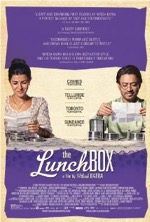
Starring: Irrfan Khan
February 2014
This review was originally tweeted in Real-time from the back row of a movie theater and appears @BackRoweReviews. Though efforts were made to tease rather than ruin this movie’s memorable lines and moments, some spoilers may exist in the following evaluation. The original tweets appear in black, while follow-up comments appear in red. For concerns over objectionable content, please first refer to one of the many parental movie guide websites. All ratings are based on a four star system. Happy reading!

More like rich and spicy, I suppose.
Quite a production for delivering lunch boxes.
Though it isn’t nearly as intricate as their computer and phone wiring system.
Never tell a woman her food is “just good.”
A surefire way to insure an uncomfortable night’s sleep on the couch.
The first note is discovered. The premise and story structure is established.
We forget things when we have no one to tell them to. A poignant truth.
Is this why old people always insist on regaling the glories of yesteryear?
Empty lunchbox prompts a heartfelt note. Touching scene.
Final analysis: a touching tale of unrequited love brilliantly portrayed by Khan and Kaur.
Rating: 3 out of 4 stars. Moral: Sometimes the wrong train leads to the right station. All aboard!
Though the premise is simple and the story is straightforward, there’s an emotional depth to this movie that far transcends its status as a drama/romance hybrid. The film features real people in real situations and their actions and reactions are wholly believable all the way through to the existential ending. The movie is preoccupied with two of life’s greatest necessities and pleasures…love and food (and how the two often intersect). The visuals of food preparation and consumption, aided in no small part by mouthwatering descriptions of aromas and flavors, produce an almost Pavlovian reaction in the viewer. It’s recommended that you watch the movie on a full stomach—otherwise you might leave the theater with nubs where your fingers used to be. The location work is wholly immersive and makes you feel like you’ve taken a two hour vacation to Mumbai. And, all things considered, this isn’t a bad way to spend two hours. Just don’t be surprised if you’re craving Indian cuisine for the next week.
Her (R)
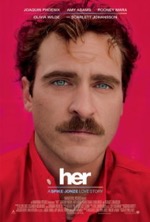
Starring: Joaquin Phoenix
January 2014
This review was originally tweeted in Real-time from the back row of a movie theater and appears @BackRoweReviews. Though efforts were made to tease rather than ruin this movie’s memorable lines and moments, some spoilers may exist in the following evaluation. The original tweets appear in black, while follow-up comments appear in red. For concerns over objectionable content, please first refer to one of the many parental movie guide websites. All ratings are based on a four star system. Happy reading!

“Choke me with the dead cat.” Okay we just took a wide left turn.
OS1. We’re not that far away from this technology folks. Frightening possibilities.
Even the name sounds probable for this hypothetical technology.
Mini Stay Puft man in the video game has a potty mouth.
“I’d like a slice of cheese please.” A computer that knows what you want to eat.
But can it always account for mood or a finicky palate?
Samantha hints that she might be exceeding her programming. Fascinating!
Maybe she’ll magically appear as Seven of Nine.
Ingenious use of fade to black. The morning after...awkward.
“The past is just a story we tell ourselves.”
Beta test for a computer game...Phoenix looses many “mommy points.”
He still does far better than I would.
Phoenix is afflicted by a “socially acceptable form of insanity.”
Signing the papers...one of the most heart-rending experiences imaginable.
Been there, done that…have the emotional scars to prove it.
A surrogate. This is so strange. It’s true what they say...three’s a crowd.
Samantha is experiencing growing pains. Disturbing implications.
“Are you in love with anyone else?” Always a dangerous question to ask.
Final analysis: one of the most astounding examinations of the human condition ever to grace the big screen.
Jonze’s prescient, near-future tale juxtaposes our need for love with our growing sense of isolation.
Prescient is the perfect word to describe this film. Jonze has captured the zeitgeist of where our society and technology will be 5 to 10 years from now. His vision here is past the cutting edge…truly astonishing.
The world Jonze creates is staggeringly real and downright frightening in its implications for our future.
And yet, hope remains as long as we don’t loose connection with each other...as we witness in the final scene.
Rating: 4 out of 4. Profound beyond description, Her is a truly moving experience. Now I’ll take out my earpiece.
I have little to add to the above statements, so at the sake of compounding compliments or stockpiling superlatives, I’ll keep this wrap-up short. The one caveat I offer is that this is an extremely graphic (sexually) movie, so precautions should be taken if such content is deemed inappropriate for potential viewers. That said, a more profound film concerning the nature of love, belonging, sex, heartache and loneliness you’ll be hard-pressed to find.
The Great Gatsby (PG-13)
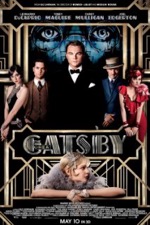
Starring: Leonardo DiCaprio
May 2013
This review was originally tweeted in Real-time from the back row of a movie theater and appears @BackRoweReviews. Though efforts were made to tease rather than ruin this movie’s memorable lines and moments, some spoilers may exist in the following evaluation. The original tweets appear in black, while follow-up comments appear in red. For concerns over objectionable content, please first refer to one of the many parental movie guide websites. All ratings are based on a four star system. Happy reading!

Wish I had a quarter for every time DiCaprio says that phrase in the movie.
A mystery caller...awkward.
Never been a fan of anachronistic scores. Rap music in the 20s?
80s pop music ruined Ladyhawke (1985) and modern tunes consistently yanked me out of the “reality” of A Knight’s Tale (2001). I know most people disagree with me over the last one though, but I’ll stick to my lance.
“I’m Gatsby.” What an entrance! Still doesn’t rival the Duke’s in Stagecoach, though.
Or Orson Welles’ in The Third Man (1949) or Rita Hayworth’s in Gilda (1946).
“Perhaps more flowers.” Amusing quip.
The meet-cute. Exquisitely filmed.
It’s raining shirts...gorgeous scene.
The desire to repeat the past. The dangerous lure of nostalgia.
Leo sinking under water. This is becoming a career motif.
“I’ll never let go, Jack.” Psyche!
Final analysis: a towering spectacle. Pitch-perfect casting/acting. Elegant direction by Luhrmann.
Exceedingly high production values accompanied by breathtaking cinematography.
Script is faithful to source material, but not shackled by it.
Rating: 3 out of 4 stars. I think this effort would make its progenitor proud.
Though the book is far from theatrical—it’s a tawdry, high society yarn with noir-ish overtones—Luhrmann’s highly choreographed and stylized shots lend themselves well to what basically amounts to a musical without any musical numbers. The performances are beyond stellar, especially DiCaprio as the tortured title character and Maguire as the wide-eyed protagonist. Mulligan and Edgerton also sizzle as mismatched lovers. All in all, this fine envisioning of Fitzgerald’s novel will stand the test of time.
Salmon Fishing in the Yemen (PG-13)
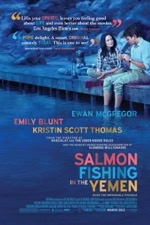
Starring: Ewan McGregor
March 2012
It’s fitting that one of the most unique movie titles in modern cinema also belongs to one of the more refreshingly original films released in recent years. That movie, based on the novel by Paul Torday, is Salmon Fishing in the Yemen. Yes, you read right…fresh water fishing in the middle of a desert. The premise seems utterly outlandish (a fact not lost on Ewan McGregor’s Dr. Alfred Jones, who initially refers to the proposed project as a “bloody joke”), but the story never takes itself too seriously and delivers a charming denouement that’s sure to please the “fairy tale ending” set.
Director Lasse Hallstrom (The Cider House Rules) uses his locations to great effect and appropriately blends traditional shots with stylistic ones (like the extreme high angle vantage of the serpentine reception desk in the office where Emily Blunt’s character works) in order to create the overall impression of a commercial film with mild indie influences. Though the film will be mostly relegated to art house theaters, Salmon Fishing certainly has commercial appeal since its style never upstages the story with excessive or ostentatious artfulness and due to the draw of its big-name stars.
The performances, as would be expected from this cast, are tremendous. Though Kristin Scott Thomas is relegated to a rather small part, she gets some of the best lines/laughs in the movie. McGregor’s seldom been as likable as he is here and the blooming Blunt is disarmingly charming. The fact that McGregor can overcome any moral objections to his character’s extramarital romance with Blunt, to the extent that spectators actually yearn for the couple to get together, is a testament to the acting acumen he now possesses (a padawan he is no longer).
One of the running themes in the film is the case of faith vs. science or random chance. Though it shouldn’t be ironic, the fact that the Arab man preaches faith to the pragmatic Caucasian man is a bit of a twist. If anything, this ancillary storyline exposes the increasingly agnostic worldview being adopted in the West. It also forwards the notion that devotion to a religion need not include the kind of fanaticism that leads adherents to crash jets into skyscrapers. The sheik in the film (Amr Waked) is a genuinely nice guy, and his portrayal goes a long way toward shattering the unhealthy stereotypes that have endured for ages, but were exacerbated by 9/11.
The “love story” here is sweet but is fairly contrived, like the through lines in all romance movies. The chemistry between principle actors is undeniable and there are several sublime moments in the film, like when McGregor names a handcrafted fly (for fishing) after Blunt’s character. However, the “wife and lover meet” passage near the end of the movie degenerates the plot into a glorified soap opera. Fortunately, minimal screen time is dedicated to this love triangle subplot and stasis is soon regained, but not until tragedy befalls the project and hope rises from the ashes…all true love must first be tested in the fiery cauldron of trial and opposition, I suppose.
Salmon Fishing probably won’t set the world (or box office) ablaze, but it’s a nice change of pace film with vivid scenery, sure-footed performances and a one-of-a-kind premise. Unlike the scores of uninspired, unbelievable dramedies being released these days, this is one film you can buy into…hook, line and sinker.
Rating: 3
This Means War (PG-13)
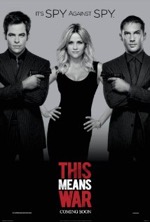
Starring: Reese Witherspoon
February 2012
The love triangle is one of the oldest narrative devices employed in romance movies. Here we have a Mr. and Mrs. Smith (2005) style spy movie where two of the top male operatives at a secret intelligence agency are in love with the same woman. The film’s relational equilateral is composed of some of today’s top talent: Chris Pine, Tom Hardy and Reece Witherspoon.
Once Pine and Hardy discover they’re in love with the same woman, the two men become instant enemies and resort to all manner of covert, underhanded or just plain infantile tactics in order to secure Reece’s affections. For the first ten minutes Pine and Hardy’s often extreme measures to sabotage each other’s chances with Reece are mildly amusing, but at the hour mark, peeling off your fingernails might seem a less painful alternative to enduring even one more minute of the pronounced and protracted silliness that runs rampant throughout the latter stages of the film. In the end, two-timing Reece must choose between her two smooth suitors. Unfortunately, her decision is predictable and stereotypical…somewhere Gloria Steinem is having a conniption.
Beyond all of the well-meaning shenanigans, some of the messages posited by the movie are utterly abhorrent—like everything that spews out of Chelsea Handler’s mouth. Besides setting the feminist movement back a couple decades (Reece is getting older, so she just has to have a man in order to find fulfillment), Reece’s character is so indecisive and so co-dependent that she goes through with Handler’s advice to sleep with both men as a tiebreaker. How in the world can Reece consider this to be good advice? I guess the main criteria for a person’s suitability as a spouse is how well they perform in the sack. Worse yet, one of the men grows a conscience and fails to consummate Reece’s experiment, thereby establishing himself as the more honorable of the two men. So naturally, Reece selects the lothario who seduced her to be her soul mate. We’re way past mild indiscretion at this point…we’re at the serious therapy stage. And the script just passes this off as normal behavior.
Reprehensible actions aside, the supposed twist ending is so contrived it might actually, and ironically, be the funniest part of the film. Though one of the characters is redeemed by way of this gimmicky ending, the denouement is far from satisfactory.
The label “run-of-the-mill rom-com” doesn’t even begin to describe the film, but for all of its inherent idiocy (and inappropriateness), the film is the kind of breezy, bawdy confection that appeals to today’s mass audience. That seems like a perfect impetus to launch into a diatribe about societal ills or ethics in media, but I think I’ll abstain. I wouldn’t want to start a war.
Rating: 2 1/2
The Adjustment Bureau (PG-13)
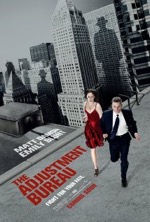
Starring: Matt Damon
March 2011
TAKING AIM:
The Adjustment Bureau presents an intriguing premise: what if agents from a secret organization aggressively enforced the rigid adherence to the master plan set forth for a person’s life? This Matt Damon vehicle is a high concept thriller that successfully synthesizes elements from an action flick and a love story, while also traversing some heady, philosophical terrain.
TARGET PRACTICE:
Novel Fact: Adjustment is the latest in the decades-spanning string of movies based upon Philip K. Dick’s sci-fi stories (Blade Runner, Minority Report, etc).
Genre Blender: Though containing elements of a romance, drama, thriller, action and sci-fi film, Adjustment stubbornly resists genre classification, and represents the best parts of each in its mash-up mélange of narrative flavors.
Pervasive Paranoia: Harking back to the widespread suspicion of men in gray flannel suits (think Gregory Peck) during the early stages of the Cold War, Adjustment keenly displaces onto its gray-suited Bureau agents the current and widespread anxieties over lost freedoms (the Patriot Act) and growing distrust of the system (corporate and political corruption). The more things change…
Chemistry: Damon, by now, is unquestionably a bona fide Hollywood leading man. Blunt has spent her career as a sidekick in supporting roles. On paper, Damon and Blunt seem mismatched. Onscreen, the chemistry between the two actors is debatable and, as such, Blunt’s casting is dubious when considering the wealth of A-tier actresses who could’ve, perhaps should’ve, taken her place. One thing’s for sure, the Damon/Blunt pairing doesn’t hold a Bic lighter to the enduring flame of classic romantic couples like Bogart/Bacall and Tracy/Hepburn.
Philosophy: The philosophical topic of fate/chance is broached with conspicuous frequency in the film. The story also grapples with the theological debate over predestination vs. free will. The cerebral lectures on fate are less intriguing here than the gut-wrenching ramifications of making the wrong decision when the future is on the line. What if your action, or inaction, holds negative outcomes for your future self (we saw this illustrated ad nauseam in the Back to the Future trilogy)? Even worse, what if your decision creates catastrophic repercussions for someone you love? Could you set aside your love for that person if it meant ensuring his/her well being, which would otherwise be jeopardized? It’s all hypothetical when couched in a two hour entertainment, but it’s still fun to noodle over.
Digging Deeper: The movie contains some breathtaking views of NYC’s skyscrapers, especially the monolithic corporate buildings, which are artfully framed in the downtown scenes. Also, the film makes effective use of expansive rooms (lobbies, libraries, etc), which, by comparison, make its inhabitants appear like a jellyfish in a gigantic ocean. And speaking of oceans, there’s a fascinating connection between this film and Titanic. In Titanic, good things generally happen at the front of the ship, while bad things usually happen at the back of the ship. Here, large rooms (e.g., empty warehouses) are bad and small rooms (e.g., bathrooms) are good. Another point to consider: the one young black man in the Bureau is characterized as open-minded, flexible and a Good Samaritan, while the numerous old Caucasian men are drawn as rigid, unimaginative enforcers of policies even they question at times. What does this say about the ethnic diversity among the leaders of the emerging global economy? Is the movie prefiguring the impending extinction of the old guard of corporate America? Also, why does the movie succumb to the prevalent “boy’s club” mentality? The Bureau consists entirely of men.
PARTING SHOTS:
Though the movie attempts to tackle some weighty aspects of our existence, are the excessive references to free will a bit overdetermined? If so, is the conclusion too preachy? Is the existential dénouement a cop out (i.e., Back to the Future IIIs sage advice from Dr. Brown, “Your future is whatever you make it. So make it a good one…”)? Even though it’s currently in fashion (especially on TV), did we really need Damon’s voiceover narration to help us interpret his character’s thoughts and feelings?
In the final analysis, Adjustment is a cinematic double-edged sword. Those hoping to see an all-out action, or drama, or romance, or sci-fi film are sure to be disappointed. Still, since it offers something for everyone, Adjustment is sure to reach a wider audience than if it had focused on just one specific genre. Either way, if the film makes people ponder its themes and messages past the exit sign, it will have accomplished it purpose.
Rating: 3
Marley & Me (PG)

Starring: Owen Wilson
December 2008
“Heartwarming, Tear-jerking Dramedy is a Doggone Good Time”
John Grogan (Owen Wilson) is wading through the deep stuff. His wife, Jenny (Jennifer Aniston) wants to have a baby. John turns to his friend, Sebastian (Eric Dane), for advice and is told that the best way to slow down Jenny's biological clock is to sidetrack her with a puppy.
For her birthday, John buys Jenny a puppy...the cheapest of the litter, which should automatically raise a caution flag in one's mind. Of course, as the story would require, the little mutt grows at an alarming rate and soon takes to ransacking the Grogan house and generally making its owners’ lives a living nightmare. And of course, it's not too long before Jenny gets pregnant, leaving John to wonder where his well-calculated plan went so awry.
Marley & Me, based on the experiences of the real-life Grogan family, is fairly believable, but there are a few moments of hyper-reality. Thankfully, these requisite mishaps involving the calamitous canine don't degenerate into the kind of improbable silliness that reigned supreme in the Beethoven movies. Such paint-spilling, car-denting, villain-foiling antics would have killed this movie as sure as rabies killed Old Yeller.
There can be no doubt that the star of the movie is the dog; however, the human performances aren't anything to howl at, especially the leads. It's no secret that Jennifer Aniston is a capable actress; since her days on Friends, Aniston has made a respectable career out of mostly comedic, sometimes-dramatic movies as the leading lady in mostly successful films. The big shocker here is Owen Wilson's multi-faceted performance...perhaps the first for the towheaded funny-man. I think it's safe to say that Wilson has graduated before our very eyes, playing a man who's desperately trying to balance the rigors of family life with his career, all while maintaining a good sense of humor and positive outlook on life. Wilson probably won't be hefting an Oscar any time soon, but he actually shows some range here, which is a refreshing change from his patented, daffy shtick. Apparently he can be serious. Who knew?
Alan Arkin, in yet another Oscar-worthy supporting performance, mesmerizes as John's unflappable, unemotional editor. Much like Tommy Lee Jones' Marshal Gerard in The Fugitive (1993), Arkin feigns an uncaring attitude, but is deeply concerned with the lives of those around him. If ever discovered to have a heart, Arkin’s editor would surely echo Gerard’s image-preserving request at the end of The Fugitive, "Don't tell anybody, OK?"
It's contestable whether or not Marley & Me is a family film. Certain situations and some language would probably be enough for concerned parents to keep their kids away from seeing the film. Then there's the ending. Some—anticipating a happy ending—will be broadsided by the movie's tragic climax. If your children bawled for a week after viewing Old Yeller (1957), you might consider leaving the kids home and reserving Marley & Me for a date night. Truth be told, it’s more of a date movie than a family film anyway, so word to the wise.
Though shamelessly sentimental in spots, Marley & Me is as heartwarming as they come…a popcorn movie in the truest sense. With ticket prices skyrocketing, it’s satisfying when you actually get your money’s worth at the Cineplex and the Wilson/Aniston vehicle is worth every penny. Cute, cuddly and crowd-pleasing, Marley & Me is an early Christmas present that will give you all the warm fuzzies of actually owning a dog without having to clean up the mess!
Rating: 3
The Ugly Truth (R)

Starring: Katherine Heigl
July 2009
“There is Some Truth in This Rote Rom-Com”
Warning: I feel compelled to steer those who might be offended by this film in a different direction. In the guise of a harmless romantic comedy, this film contains brief nudity, pervasive expletives and an abundance of graphic sexual references. You’ve been sufficiently forewarned.
Some time ago, probably with the release of Steve Carell’s 40-Year-Old Virgin (2005), romantic comedies took a sharp turn and started becoming, if not more sophisticated, more adult in their content. Many of these edgier relational comedies have, appropriately, receiving R ratings and have largely replaced their tamer PG and PG-13 counterparts released before the millennial mark. Although just as coarse as many of its forebears, The Ugly Truth, starring Katherine Heigl and Gerard Butler, has refined the nascent sub-genre of mature rom-coms into brutally honest, relationally challenging fare.
The story begins with a disgruntled news producer, Abby (Heigl), calling into Mike Chadwick’s (Butler) no-holds-barred local access show, which shares its name with the movie’s title. After a spirited debate over Stairmasters and masturbation, Mike drops Abby’s call. As fate would have it, the network hires Mike to add some spice to Abby’s flagging morning newscast…a Hail Mary to boost ratings enough to stay on the air. Abby is forced to work with Mike and, despite the adversarial energy they bring to the set, the ratings immediately skyrocket…proving yet again that sex sells. It’s a foregone conclusion that Abby and Mike will fall in love, but not before the required series of hilarious mishaps and cagey catfights, which comprise the bulk of the story, have had a chance to unfold in the most obvious and pedantic manner imaginable.
As was alluded to in my introductory warning, the subject matter and sexual references in The Ugly Truth are extremely crude and graphic, to the extent that they might even make a sex therapist blush. A cross between Howard Stern and Jim Cramer, Mike’s show gives garden-variety crassness a bad name…and yet, beyond the outrageously salacious remarks, there is some veracity in what he’s saying, both regarding the eternal battle of sexes and how both genders view the physical, psychological and emotional aspects of sex. This educational component is the saving grace of a film that otherwise would’ve ended up as this year’s 27 Dresses.
Despite its hokey romance (the dialog during the hot air balloon sequence is particularly hackneyed), the movie, by design or happy accident, has tapped into a universal quandary by attempting to answer questions regarding that most mysterious and pleasurable of human experiences. Couching such a serious subject in a seemingly innocuous rom-com allowed the writers (three of them…all female) to broach this touchy topic in a way that’s charming and disarming rather than embarrassing or off-putting. Also, by relegating the bulk of the movie’s graphic sex talk to Mike’s cable show or news segment, a buffer is added between the explicit subject and the real audience, which should make it even easier to open a dialog on the subject in hand…er, at hand.
However, for all of its in-your-face sex education, when the movie ends none of us are any closer to understanding the vagaries and exigencies of human sexuality than when the film began (except for those two teenagers making out in the back row of the theater—hand check!), but I guess that’s really the point. No one, not even Dr. Ruth or Dr. Kinsey, has fully plumbed the depths of the sexual experience. Despite what’s claimed in books or boasted about in high school locker rooms, no one has mastered the art of sex. In fact, those who brag most about their exploits in the bedroom are usually the ones who have absolutely no idea what they’re doing. And that’s the ugly truth!
Rating: 3
The Proposal (PG-13)
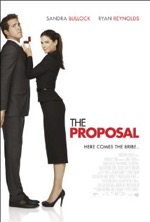
Starring: Sandra Bullock
June 2009
“Jilts Its Audience with Standard Rom-com Shtick”
The Proposal, starring Sandra Bullock and Ryan Reynolds, is about two people who despise each other but eventually fall madly in love. We’ve seen this scenario a kajillion times before and have suffered through each permutation of the threadbare rom-com yarn with low interest and high anxiety to exit the theater as quickly as possible.
Director Anne Fletcher must’ve thought she’d struck gold in this new take on the ages-old form, if only because of the story’s exotic locale…Alaska. But, whereas location is everything in real estate, it can only take a movie so far, especially if it’s accompanied by a mediocre narrative. Sadly, we don’t get to see much of the Alaskan countryside in the film and when we do it’s either shoddily projected onto a green screen behind Reynolds or unimaginatively framed by Fletcher and her cinematographer. A few eagles factor into the story, but that’s the extent of the wildlife displayed in the movie—no bears and no moose…just Betty White in native Alaskan garb, dancing around a fire and chanting a string of vowels while worshiping Mother Earth. Guess that explains why there aren’t any animals in the movie.
The movie’s premise revolves around Bullock’s bulldog book editor Margaret Tate, who’s facing deportation to her home country, Canada…eh! In an act of desperation, Margaret grabs her assistant, Andrew Paxton (Reynolds), and convinces her boss and an immigration agent that she and Andrew are engaged—much to Andrew’s utter shock and revulsion. Andrew refuses to go along with the elaborate charade until Margaret promises him a promotion. The rest of the movie plays out like Meet the Parents in Alaska, with only a quarter of the silly mishaps and less than half the charm.
Bullock tries her hardest to invoke Meryl Streep’s Miranda Priestly from The Devil Wears Prada, but fails miserably, despite being called “it” or “witch” by her tweeting employees. However, though brusque and business minded, Margaret doesn’t resemble the harsh image painted by her skittish underlings. From a narrative perspective, it’s important that Margaret not be portrayed as too harsh because she has to be likable enough for audiences to cheer her on later in the story.
Andrew is a talented writer with aspirations of becoming editor, but he doesn’t know how to stand up for himself or stand up to Margaret and her frequently unreasonable demands. Andrew, on rare occasions, shows some chutzpah, but is ridiculously compliant for most of the movie. Ironically, as hard as it is for Andrew to say no to Margaret, he has no problem rejecting his father’s (Craig T. Nelson) continued pleas to come home and take over the family business. A puzzling inconsistency.
The film is buttressed by some decent supporting acting by Andrew’s parents (Nelson and Mary Steenburgen) and grandmother (White), but there’s nothing Oscar-worthy here. Ramone (Oscar Nunez), the town’s jack-of-all-trades—he’s a porter, grocer, adult entertainer and minister—provides some comic relief, but is actually more creepy than funny (the Chippendales striptease scene is one of the most disturbing sequences I’ve seen in a recent film and will surely be a turnoff for men and women of all persuasions). Ramone has several of the more amusing lines in the movie, but, like a cheap watch, his timing is always just a little off. The feeble chuckles generated during the faux outtakes at movie’s end are like the courtesy laughs you’d pay one of your grandfather’s corny jokes.
Though I must admit that The Proposal doesn’t have as many goofy gags as the typical comedy film, coaxed laughter is still the movie’s MO. Standard comedic gags, i.e., something tragic happens to a pet (here, an eagle carries off the family dog), a man accidentally knocks a woman overboard and one character schemes to get feuding lovers back together again (in this case White’s meddling grandmother fakes a heart attack so that the emergency helicopter can take them to the airport before Margaret flies back to the “Lower 48”), permeate the film. The promising premise laid out in the early stages of the film quickly devolves into a series of rom-com conventions, most significantly the “two people who weren’t meant to fall in love that miraculously do” plot device.
Besides the woefully underachieving story, the casting of the leads is the most ironic aspect of the movie. Bullock and Reynolds have very little chemistry as a romantic couple, which actually works well when they bicker and backstab their way through their fabricated relationship. When they finally realize that they really do love each other (something we’ve known all along), their lack of chemistry makes the contrived ending that much more improbable.
The series of ending “twists” are so predictable as to be embarrassing, and writer Pete Chiarelli consistently defaults to convenient solutions instead of more complex or, dare I say, realistic resolutions. Though I applaud the movie for largely eschewing the screwball moments that epitomize the vast majority of modern movies in this genre, The Proposal isn’t nearly as funny as you’d expect, making it an affair to forget. If someone invites you to see The Proposal, my advice would be the same as if they were offering you an illegal substance…just say no!
Rating: 2
The Curious Case of Benjamin Button (PG-13)
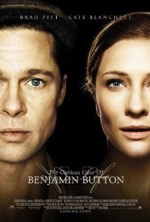
Starring: Brad Pitt
December 2008
“Masterly Telling of Fitzgerald’s Timeless Tale”
Originally, I had considered writing this review backwards, in keeping with the movie’s reverse polarity plot, but decided it would require too much effort to write and would be too demanding on the reader. So then, this linear review of director David Fincher’s The Curious Case of Benjamin Button will attempt to convey the essence of the story’s unusual plot device, which was first conceived by F. Scott Fitzgerald in his short story of the same name, published in 1922. The film certainly lives up to the curious part of its title since it chronicles events in the life of the eponymous character, an altogether average man save for the fact that he ages in reverse.
The story is set in New Orleans in 1918. Born as a tiny, wrinkly old man, Benjamin is raised by a black nursing home worker, Queenie Weathers (Taraji P. Henson). During the early years of his life, Benjamin’s weak legs require him to walk around with the assistance of crutches, but he’s miraculously healed of his infirmity at an evangelical tent meeting. At age twelve, the course of Benjamin’s life is forever altered when he first meets redheaded Daisy. And so his life goes—year after year filled with successes and failures, a war, an affair, a few heartbreaks, an occasional happiness and the loss of many friends—until Benjamin dies as a baby at age eighty-four.
After accepting the narrative conceit and identifying with the plight of the characters, Curious is a profoundly moving examination of what it means to be human and the brevity of our existence. Achieving that level of appreciation might be a chore for many viewers due to the film’s unusual mode of story conveyance, a large number of uneventful dramatic sequences and a running time of two hours and forty-six minutes. As such, the film may end up being immensely enjoyable for some or tortuously interminable for others.
As for me, I’m a proponent of the former, largely because of the intriguing story line, Fincher’s superlative direction and deeply affecting performances by Brad Pitt, Cate Blanchett and Tilda Swinton. Despite the film’s length, I never once looked at my watch or started squirming in my seat…a testament to the enduring salience of Fitzgerald’s source material and Fincher’s incisive vision in translating it to the big screen. A lot of hoopla about the director’s creative prowess, to be sure, but this is a film that could’ve derailed at multiple junctures were it not for Fincher’s efforts in realizing this sprawling story in personal and meaningful ways.
As was teased earlier, the movie’s performances are nothing short of astounding. Pitt mesmerizes in a role that has redefined his career and left little doubt as to his potential to become, as he has here, a powerhouse dramatic actor. Pitt’s age appropriate acting, aided in no small measure by the make-up and CG effects which incrementally transform the actor into progressively younger versions of his character, is absolutely flawless.
Cate Blanchett, again, defies the boundaries of what a performer can achieve as Benjamin’s childhood friend turned romantic interest, Daisy. Daisy is the film’s most difficult role to play since she not only occupies the closest orbit around Benjamin, but also rotates in the opposite direction from him. Like ships passing in the night, Daisy must come to terms with the realization that a relationship with Benjamin is doomed to fail before it even begins. And yet, such knowledge doesn’t dissuade her from bestowing upon Benjamin the rarest form of devotion…she willingly trades a few years of joy and fulfillment for decades of thankless service as a caregiver for her continually regressing soul mate. Despite Benjamin’s status as central character, Daisy, as the impetus behind Benjamin’s every action and decision, is the film’s focal point and emotional anchor.
One of the movie’s profound ironies is how an intimate story about one man’s life can feel so epic. The film is a poignant exploration of our own mortality and a powerful reminder that our lives are defined by the sum of our choices, the totality of our experiences and the indelible mark we make on those we leave behind. If there’s a silver lining to passing on, the movie captures it fully; the warm glow of a gilded gloaming is a signature seen throughout Fincher’s extraordinary film. It’s a gentle reminder of the impending sunset that faces us all and to seize the day while we possess the capacity to do so.
Curious is life affirming, but also life assessing. The movie challenges us, both with its unusual mode of storytelling and with Benjamin’s reverse chronology, to conceptualize existence in terms foreign to our own. When Benjamin’s retrograde life cycle is juxtaposed with the forward trajectory of our own reality, different aspects of humanity are revealed that otherwise would’ve been underappreciated or overlooked. This melding of timelines allows us to see ourselves with fresh eyes, as if examining our race from an outsider’s perspective. The movie’s greatest gift is the understated, yet profound, manner in which it reveals just how precious a commodity this thing called life really is, regardless of which direction we age.
Those who can endure the film’s length and implausible science for the sake of this truly unique cinematic experience will be swept away by its rich characterizations and enthralling story of a life lived well…in reverse. The human condition, with its setbacks and triumphs, ecstasies and travails rarely has found so subtle and powerful an expression in the cinema.
Rating: 4
Twilight (PG-13)

Starring: Kristen Stewart
November 2008
“Teenage Romance Takes a Walk on the Dark Side”
In 2001, the WB network took a chance on a different kind of superhero show; their motto was “no tights and no flights.” The series takes place in Smallville (the show’s title in case you haven’t guessed it), Kansas, and focuses on superhuman happenings amid everyday, rural life; the town definitely lives up to its name. The show features a handful of flawed yet interesting adults, who take a backseat to the well-adjusted, multiracial students at the local high school. Each of the teens has a defining hobby, i.e., newspaper editor, athlete, coffee shop proprietor, and a few even display special abilities, especially an angst-ridden teen named Clark Kent.
Though a point-by-point comparison breaks down in places, Twilight, based on the teen novel of the same name by Stephenie Meyer, is similar enough to Smallville to validate the reference. The movie opens with unsettled teen, Bella Swan (Kristen Stewart) embarking on a cross-country journey from her mom’s place in Phoenix, AZ to her dad’s house in Forks, WA…purportedly the wettest place in the continental US. Forks is overcast, brooding and moody, much like Twilight’s melancholic heroine. As Bella adjusts to her new high school, she meets Edward Cullen (Robert Pattinson), a pale-skinned heartthrob who looks even more despondent than Bella. Edward and his mysterious, mishmash family are misunderstood by the town’s populace, many of whom believe the Cullen’s are part of a cult. Of course, as the story would have it, Edward and Bella fall hopelessly in love and they live happily ever after. Well, not quite.
There are several ingredients that make this story irresistible. Starting with the source material, Meyer’s world is fully formed, which makes it easy for us to be drawn into the reality of the movie. Twilight embodies many universal themes, such as: overcoming prejudice, the struggle to fit in and not overdoing the glitter. Well, maybe not the last one, but the scene I’m referring to will go down as the film’s biggest blunder.
The movie’s setting is simply magical. I’ve been to Forks, and I can tell you it looks just like it does in the movie. In fact, the location work so completely captures the feel of the damp, musty, puddle-pocked burg that my allergies flared up just looking at it.
The movie’s money scene takes place right after Edward gives Bella a piggyback ride to the top of a towering pine tree. In a beautifully filmed sequence, the camera swoops down and circles around the teenage lovebirds (it’s reported that the elements were so severe the actors were nearly blown off the boughs). Director Catherine Hardwicke then cuts to a panoramic view of a mist-draped valley where a writhing river snakes its way down the valley toward the mountains on the distant horizon. Anyone who’s been to the Pacific northwest will be flooded with memories at seeing this gloomy, yet awe-inspiring vista.
Hardwicke and her casting director have assembled an exceptionally talented and attractive group of young actors, many of whom will undoubtedly go on to become major Hollywood stars. I don’t think anyone would argue that Pattinson and Stewart have enough chemistry to stock a science lab, but Twilight is much more than a two pony show. In fact, Twilight’s cast may qualify as the finest ensemble of no-namers I’ve ever seen in a film. Standout performances are turned in my Billy Burke as Bella’s dad, Charlie, Peter Facinelli as Dr. Carlisle Cullen, the patriarch of his clan, Taylor Lautner as Jacob, Bella’s Native American friend and Cam Gigandet as James, Bella’s stalker.
If you’re familiar with Twilight’s premise, you’ve surely noticed by now that I’ve taken extra care not to reveal even the most basic secrets of the film. I’ve shown such restraint so that people who haven’t read the books (like me), can enjoy the film on its own terms without having everything spoiled before they enter the theater. Though most people will have prior knowledge of Edward’s secret, my aim is to preserve the mystery for the three people in Zambia who’ve never heard of Twilight.
Whereas Harry Potter has captivated kids and pre-teens, Meyer’s novels have captured the hearts and minds of teens everywhere and even a few fantasy-prone adults like me (my favorite scene is the “baseball” game). Twilight is an engrossing world, made memorable by its exciting set of fresh conventions and original characters. I would think that any degree of box office success would guarantee a series of films. Up next: New Moon.
Rating: 3
Mamma Mia! (PG-13)
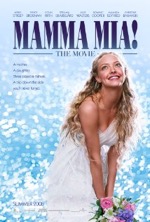
Starring: Meryl Streep
July 2008
“Thank You for the Music, But What About the Story?”
Having never seen the theatrical version of Mama Mia! I didn’t know what to expect from the new film version, other than I was going to see a musical. And a musical it is; songs permeate and dominate all but about fifteen minutes of the film, so if you’re not a person who enjoys musical movies this definitely isn’t for you. As an unrepentant Chick Flick and an uninhibited musical, the film is clearly marketed toward the female set, so most men (those dragged kicking and screaming into the theater by their female companions) will have a hard time swallowing or following the movie’s song-a-minute storyline.
The movie’s slogan is: “A Mother. A Daughter. Three Possible Fathers.” Believe it or not, that’s about all there is to the plot. The vast majority of the story is told via nineteen songs from ABBA’s catalog—some bouncy, some groovy—which are sung by the stars along with a host of extras performing over-the-top choreography and wearing Juicy Fruit smiles. Of course, after about the fourth or fifth musical number all of the songs start sounding like a broken record…er 8-track, and while I applaud the film’s use of the actors’ actual singing voices, some of the solo work is flower-wilting bad. Besides the movie’s overabundance of musical numbers, the biggest disappointment is the utter absence of character moments. However, the acting, directing, music, choreography and technical elements make up for any lack in the story department, and the on location filming on an idyllic Grecian island is a significant factor in the film’s overall mood and aesthetic.
The movie’s casting was spot-on and veterans Meryl Streep, Pierce Brosnan, Colin Firth, Stellan Skarsgard and Christine Baranski, along with newcomer Amanda Seyfried, deliver delightful performances. Streep is her usual stellar self as mamma-with-a-past Donna, but it’s Seyfried as Donna’s debutante daughter, Sophie, who steals the show with her zest for life and inextinguishable desire to discover her dad. In a strange case of role reversal, Sophie provides maturity, responsibility and just good common sense to balance out her flighty, wild and emotionally needy mother. Though the movie stays on the periphery of meaningful issues like empty-nest syndrome, regret over lost love and paternal responsibility, it wastes much of its efforts on bawdy jokes and obscene gestures; most of them perpetrated by Donna and her lusty gal-pals.
Mamma Mia! is a light, breezy jukebox musical that fulfills its promise to be a two hour dance party and is the feel-good movie of the summer. It’s a story about young love and rekindled love; in fact, it’s all about love. How fitting that, despite its vacant narrative, Mamma Mia! is a movie you can’t help but love.
Rating: 2 1/2
WALL-E (G)

Starring: Ben Burtt
June 2008
“Animated Triumph Takes Us to Infinity and Beyond”
The latest feature film from Disney/Pixar may be an animated movie, but it certainly isn’t a kid’s movie. That’s not to say that kids won’t enjoy it or that it’s inappropriate for children, because that certainly isn’t the case. What I mean is that Pixar has delivered its most adult film to date; a hauntingly beautiful, elegantly whimsical and poignantly instructional CGI tour de force.
WALL-E tells the story of the last “living thing” on earth (other than cockroaches, of course) after humans abandoned their trashed and thrashed home world in search of greener pastures in the heavens. WALL-E (Waste Allocation Load Lifter-Earth), the eternally curious, binocular-eyed robot, has been assigned the unenviable task of cleaning up the desolated surface of our planet all by himself. WALL-E’s existence is fairly routine—gathering trash, compacting refuse into waste cubes and constructing veritable mountains out of the cubes—until a mysterious ship literally lands on top of him. The alien vessel dispatches a probe and quickly shoots back into space.
WALL-E is immediately stricken by the alabaster, egg-shaped probe, whom he soon learns is named EVE (WALL-E pronounces her name “Eva”). EVE barely acknowledges WALL-E’s existence until, in a desperate act to impress the mission-minded probe, WALL-E presents EVE with a gift—the solitary shoot of a plant potted inside an old boot. EVE snatches the plant, stores it inside one of her compartments and immediately shuts down. Try as he might, WALL-E fails to snap EVE out of her self-imposed trance; EVE is completely lifeless, save for a green flower symbol flashing on her sleek surface. Once again, WALL-E is relegated to a life of loneliness.
From that brief synopsis of the movie’s opening act, many would perceive WALL-E to be a dark, dismal, despondent, dystopian yarn, but nothing could be farther from the truth. I know this is quite a boast, but WALL-E has more heart than any previous Pixar picture, which is ironic since it prominently features emotionless, whirring robots as its main characters. Some humans appear in the story, but they certainly don’t resemble our race at present, although the story is clearly warning us against becoming the shallow, convenience and consumer-driven society portrayed in the film. WALL-E, set 700 years in the future, is clearly a cautionary tale, but instead of simply leaving humans to wallow in the slough of our own making, the film illustrates the indomitable spirit of our race; the film powerfully illustrates humanity’s ability to adapt and aspire. Of the few lines of dialog in the film, the best one comes from the captain of the space cruise liner, Axiom. Once his eyes are opened to how life was on Earth, pre-apocalypse, the captain exclaims, “I don’t want to survive, I want to live!”
At the heart of the film is the improbable, unconventional, yet deeply moving romance between WALL-E and EVE. Built upon sacrifice and simple acts of kindness, their artificial relationship is more emotionally resonant than the majority of human love affairs that populate modern cinema. I never thought I’d tear up at an animated film, especially one centered on two lovebird robots, but at times I couldn’t help it. So great is Pixar’s mastery of narrative, and anthropomorphized characters, that it can seemingly control a spectator’s emotions at whim. Pixar artisans are truly digital alchemists.
It almost goes without saying that the movie’s animation is stellar, but Pixar has taken CGI to new heights in WALL-E, especially during the beautifully choreographed fire extinguisher in space sequence. Pseudo-documentary quick zooms infuse the prologue with some energy and the Chaplin-esque physical humor, along with Ben Burtt’s inspired vocalizations, makes for some captivating and amusing vignettes, like when a confused WALL-E places a spork in-between his spoon and fork collections.
From the movie’s lyrical opening to its unconventional resolution, WALL-E is an instant masterpiece and a triumph in feature length animation. What started out as the most dubious Pixar film, judging from the film’s insular trailer, has turned out to be the studio’s most ambitious effort with the biggest payoff; the film is, hands down, the most profound animated movie ever made and very nearly qualifies as the Citizen Kane of its form. Though unabashedly bleak in spots, WALL-E is an affirmation and celebration of life in any form, even the most inconsequential. Hand over the Oscar for Best Animated Movie. WALL-E is out of this world!
Rating: 3 1/2
Made of Honor (R)
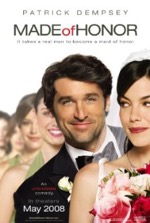
Starring: Patrick Dempsey
May 2008
“McDreamy Vehicle is Run-of-the-Mill Rom-com”
Everything that’s old will be new again. Eighteen years ago: Peter (Tom Selleck) grapples with how and when to profess his love to Sylvia (Nancy Travis) in Three Men and a Little Lady. Sylvia, an actress, returns from an overseas shoot with a rock on her finger, much to Peter’s chagrin. And yet, he just can’t summon enough gumption to express his true feelings to Sylvia. Sylvia’s fiancé, an effete, affluent British chap, is actually a decent guy…just not the right one for her. Peter tries pulling Sylvia away to talk to her, but there never seems to be a good time. On the day of the wedding, Peter frantically drives a motorcycle cross-country, crashes (literally) the wedding and professes his love for Sylvia. Sylvia, who’s simply been waiting for Peter to commit, leaves her fiancé at the altar and marries Peter instead…and they live happily ever after.
Now: In Made of Honor, playboy Tom (Patrick Dempsey) finally decides to settle down with longtime friend Hannah (Michelle Monaghan), but she returns from a six-week trip to Scotland with a ring on her finger and a man at her side. Her fiancé can sing, hunt and play the bagpipe…he also happens to be a wildly wealthy duke. He’s the perfect guy, just not the perfect man for her. Tom tries to tell Hannah how he feels, but one wedding crisis or another prevents him from doing so. On the day of the wedding, a frantic Tom rides a horse through the countryside and is tossed off, landing in the back of the chapel. Tom professes his love for Hannah, they kiss…and you can guess the rest.
Are you detecting a pattern here? Granted, there’s nothing new under the sun and love stories are often the hardest to write and execute because everything’s been done before, but the similarities between these two films are impossible to ignore. Sure there’s an unconventional twist—Hannah asks Tom to be her maid of honor—but it makes for an infeasible premise to hang an entire plot on.
Released a few months ago, a rom-com named 27 Dresses focused on Katherine Heigl’s “always a bridesmaid, never a bride” plight. With forced smiles and clenched fists, she agrees to be maid of honor for her best friend…who’s engaged to the man of her dreams. As much of a pushover as Heigl is in her movie, Tom is ten times more of a patsy in this movie because he simply doesn’t have the cojones to tell Hannah what she’s been dying for him to say. His agreeing to be Hannah’s maid of honor reveals just how mentally wan and emotionally weak Tom really is.
There are some fine supporting performances, like Tom’s six-marriage dad played by veteran director Sydney Pollack, but it’s all wasted effort on a contrived, implausible story. Made of Honor is an average romance held back by its run-of-the-mill storyline.
Rating: 2 1/2
Leatherheads (PG-13)
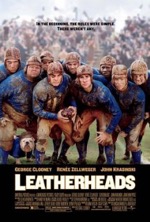
Starring: George Clooney
April 2008
“Screwball Football Farce Reveals Clooney’s Looney Side”
George Clooney’s budding romance with period pieces has blossomed into a love affair in Leatherheads, a comedic look at the early days of professional football, circa 1925. Before rules and regulations “ruined” the game, the players were much more colorful and simply played for love of the game. The money and crowds were as insubstantial as their padding and helmets, but the price was well worth the sacrifice, especially when the alternative was working in the factory, field or mine.
Moving up to the pros was also an outlet for college standouts that refused to hang up their pads after graduation. Such is the case for dashing Princeton running back, Carter “The Bullet” Rutheford (John Krasinski), who’s conscripted by charismatic Dodge Connolly (Clooney) to play for his Duluth Bulldogs. Carter, a war hero of Sergeant York proportions, appears on billboards and stadium advertisements throughout the country. Dodge hopes that such celebrity and visibility will help reinvigorate his failing sport.
On his quest to legitimize pro football, Dodge meets Lexie Littleton (Renee Zellweger), a spitfire news reporter for the Tribune who’s following a lead that will expose Carter’s heroic war story as a hoax. The ensuing love/hate relationship between Dodge and Lexie features some of the finest rapid-fire dialogue to grace a film in recent years. There are numerous scenes where the couple’s spirited bickering takes center stage and almost makes us forget we’re watching a football movie—especially during the passionate argument in Lexie’s cabin, a throwback to Cary Grant and Eva Marie Saint’s tryst on a train in Hitchcock’s classic North By Northwest. Though the movie’s middle chapters are addled by slow pacing, there are several amusing subplots that help keep the film on track: a love triangle forms between Dodge, Lexie and Carter, Dodge and Lexie evade a Keystone Cop-like police pursuit and Dodge and Carter engage in a gentleman’s fistfight where each man itemizes injured areas for the other to avoid.
The climactic game pits dotting Dodge against former teammate Carter on a muddy field in Chicago. The new commissioner’s edict that the contest be played without Dodge’s usual on-field antics forces the aging player to use all of his ingenuity in drawing up a game-winning play. Taking a cue from Carter’s grossly exaggerated war record, Dodge dubs the play the “Sergeant York.” The unconventional, yet not entirely illegal, play caps a slobber-knocker contest and a wildly entertaining film.
Leatherheads is classic comedy told on a timeless canvas, bolstered by directorial panache and acting acumen. Above all, it’s good old-fashioned filmmaking that pays fitting tribute to Hollywood’s Golden Age.
Rating: 3
Definitely, Maybe (PG-13)
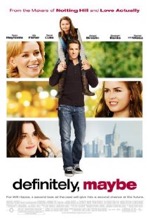
Starring: Ryan Reynolds
February 2008
“You Must Choose, But Choose Wisely!”
Premise:
A father tells his inquisitive daughter the story of how he met her mother.
Synopsis:
When the usual bedtime story fails to captivate precocious preteen, Mya (Abigail Breslin), she coerces her father, Will (Ryan Reynolds), into regaling the story of how he fell in love with her mother. The movie unspools in a series of flashback vignettes which introduce us to three of Will’s old flames: Emily (Elizabeth Banks), April (Isla Fisher) and Summer (Rachel Weisz). Will renames the women to make his story more of a mystery, but Mya, obviously, knows who her mother is. However, one of the movie’s inherent thrills is that we in the audience are kept guessing who mommy is until the very end, and even then, there’s a significant twist before the movie fades to black.
Creative Contributions:
Looking at the film from a production standpoint, the first thing that stands out is the remarkable cast. Breslin is her normal, adorable self, but it’s Reynolds who steals the show with his disarming sarcasm and charming brand of helplessness. Will’s three, pitch-perfect paramours are simply smoking, especially Weisz, who’s come a long way from the geeky librarian in The Mummy. Honorable mention (and Oscar consideration) goes to Kevin Kline for his colorful portrayal of book-writing boozer, Hampton Roth. Hampton’s torrid love affair with his student, Summer, takes a strange twist when she falls in love with Will; the ensuing love triangle further muddies the waters with respect to Will’s ultimate choice for a mate. Besides relational matters, the movie’s political commentary is also engaging. Overly idealistic and highly opinionated Will starts off as a lackey at Bill Clinton’s campaign headquarters and eventually works his way up to a power position by the president’s second term. Will’s progression from ambitious upstart to disillusioned sideliner makes for a fascinating character study.
Evaluation:
My initial reaction to the trailer for Definitely, Maybe was “Maybe, If I Must.” However, the film is a superior love story because it doesn’t constrain itself to the standard conventions of the genre: faux pas, awkward moments, startling revelations, relational gags, etc. The performances are all outstanding and writer/director Adam Brooks’ first-rate script is wildly entertaining and highly provocative—think of Definitely, Maybe as the perfect marriage between a chick flick and a Woody Allen dramedy. The end result here is far superior to other recent romance films and is definitely worth seeing.
Rating: 3
Fool's Gold (PG-13)
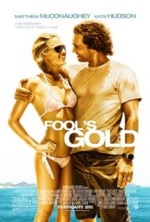
Starring: Matthew McConaughey
February 2008
“How to Lose an Audience in Ten Minutes”
The movie’s opening is quite clever: the wind sweeps up a piece of paper inside the main cabin of a yacht and fatefully carries it to the rear of the boat where it sets the sheet down on top of a struggling generator. Sparks from the generator set the paper on fire and soon the boat is ablaze. When the fire reaches a propane tank, the entire ship goes up in a fulminating inferno.
Ben “Finn” Finnegan (Matthew McConaughey) and his Ukranian sidekick, Alfonz, (Ewen Bremner) are searching for treasure on the ocean floor when pieces of the boat begin “raining down” on them. The ensuing underwater argument is amusing, and even though the story seems as shallow as the water Finn and his partner are swimming in, the scene actually marks the movie’s highpoint: like the sunken ship that descends to its watery grave, it’s all downhill from here.
After eight years of following her zealous husband around on one treasure hunt after the next, Tess (Kate Hudson) has decided to pull the plug on their marriage. When Finn arrives late to the divorce proceedings, he forfeits all of his possessions to Tess, including the boat that he just sent plummeting to the bottom of the sea. However, the boat’s sinking is serendipitous in a way; the ship’s impact on the ocean floor dredges up part of an ancient plate, which is the first clue to a nearby treasure.
You don’t need to be a fortuneteller to see where the story goes from here. Finding a fabled treasure, reconciling a failed marriage, staying one step ahead of competing treasure seekers (led by Moe, Finn’s former partner, played by Ray Winstone)…as they say, it’s all in the script. A simple and simpleminded script, the story spends far too much time on the expository history lesson, too much effort on the frenetic, freewheeling climax and not enough energy on fleshing out its characters.
McConaughey and Hudson, who were charming together in How to Loose a Guy in 10 Days, surprisingly have an utter lack of screen chemistry here…their relationship seems forced and unnatural. It’s almost like they’re trying too hard. The finest performance in the movie belongs to Donald Sutherland, who plays the wealthy boat owner that ferries the leads around on their treasure quest, most likely because he needs a diversion from dealing with his spoiled brat granddaughter, Gemma (Alexis Dziena).
Fool’s Gold is an unremarkable film that banks on its star power to please its audience. In the end, this rom-com/adventure movie more than lives up to its name: those who view it will find iron pyrite instead of pure gold. Don’t be fooled!
Rating: 2
27 Dresses (PG-13)
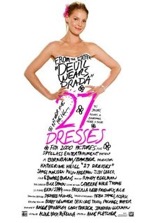
Starring: Katherine Heigl
January 2008
“Adorable Heigl Anchors Standard Rom-com”
Premise:
A woman who’s been a bridesmaid for twenty-seven friends longs for her own special day.
Synopsis:
People pleasing Jane Nichols (Kathryn Heigl) denies her own happiness even to the extent that she plans her sister’s wedding to the man she’s madly in love with.
Creative Contributions:
As would be expected, there are a lot of dresses in the movie. As such, the costuming is hard to ignore when evaluating the movie’s production virtues. Additionally, there are some nice locations and a few interesting sets, apart from the movie’s many wedding/reception venues. However, there’s little else to talk about below the line. As the movie’s central figure, Jane is an interesting character study in what it’s like to be a human welcome mat, and Heigl’s pitch-perfect performance anchors the movie in charming and meaningful ways. The movie’s perfect man, Kevin (James Marsden), is, ironically, a jaded newspaper columnist who would rather be thrown from a plane without a parachute than get hitched (he refers to marriage as “the last legal form of slavery”). Of course we all know he’s eventually going to come around and that Jane will be the catalyst to opening his eyes to new horizons of love, but the process of how Kevin succumbs to one of Cupid’s arrows is half the fun of the movie. It’s a difficult role that easily could have been knocked off course by a tidal wave of smarminess or insincerity, but Marsden pulls it off in surprising fashion…surprising when you place this turn next to his groan-inducing performances in the X-Men movies. They say you can’t catch lightning in the same bottle twice. You would’ve expected that tapping the writer of box-office smash and critical darling The Devil Wears Prada, Aline Brosh McKenna, would have guaranteed a surefire hit here. Unfortunately, the sum of its parts doesn’t even come close to capturing the same movie magic that Prada had in spades.
Evaluation:
27 Dresses is the old expression “Always a bridesmaid, never the bride” on speed. It’s a diverting, if overstated, look at how a cynical man and weak willed woman can fall in love and live happily ever after, and is, therefore, a modern fairy tale. Even though it’s as predictable as every other romantic comedy out there, 27 Dresses does feature a unique take on love and marriage and also has some engaging performances. In short, you should take in 27 Dresses.
Rating: 2 1/2
Juno (PG-13)
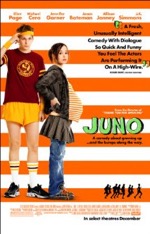
Starring: Ellen Page
December 2007
“Well-written Script Makes For a Well-rounded Drama”
Young Juno McGuff (Ellen Page) nervously paces back and forth in her living room as her expectant parents wait with bated breath for Juno’s announcement—they think she’s been expelled from school. Expulsion, a word Juno employs as if she learned it on a flashcard in the womb, is the least of her parents’ worries. As tension builds, Juno summons enough courage to exhale those two words that every parent of a teenage daughter fears to hear, “I’m pregnant.” Shell-shocked, her parents launch into a series of contingency plans—prenatal vitamins, etc.—and then wryly ask themselves why it couldn’t have been something simpler…like drugs.
Thus begins the indie dramedy of precocious teens and world-weary adults. The movie has many subtle messages woven into its seemingly innocuous narrative. Issues like teenage pregnancy—and by extension abortion vs. adoption—and marital (in)fidelity are all handled with relative ease by screenwriting newcomer, Diablo Cody, a former exotic dancer. My only criticism of Cody’s work is that the dialogue she puts in Juno’s mouth—laced with SAT words, modern expressions and enough societal references to fill a dictionary of cultural literacy—seems a little too advanced for a sixteen-year old girl. That’s not to say that teens like Juno don’t exist, but exactly what percentile are we talking about? Still, it’s nice to see a movie that exemplifies a young person who is intelligent and well-adjusted…imagine a society in which Juno was an average teenager!
Besides the groundbreaking performance by Page, some wonderful supporting performances are turned in by the eclectic ensemble. Allison Janney and J.K. Simmons play disappointed but supportive parents who handle Juno’s indiscretion with a surprising degree of equanimity. Simmons, in particular, brings charm, humor and sagacity to his part. There’s a great father/daughter scene, where Simmons’ character tries giving Juno advice, that’s amusing in its awkwardness and touching in its genuineness.
Jason Bateman and Jennifer Garner play the young couple who desperately want to adopt Juno’s baby; they discover the knocked up teen’s ad in the Penny Saver paper. Bateman and Garner are pitch-perfect in the film’s most complex roles; Garner is delightfully understated and Bateman is a portrait of ambivalence in a marriage riddled with relational subtext.
Director Jason Reitman (Ivan’s son), equipped with a superlative script and excellent performances, has helmed an effort that’s shifted the paradigm for teen angst pictures. You can bet this original storyline, masterfully executed and promulgated by Reitman, Cody and Paige, will be emulated without success for years to come, ad nauseam. But for now, enjoy the blissfully sweet beginnings of a new movement in film.
Rating: 3
Dan in Real Life (PG-13)
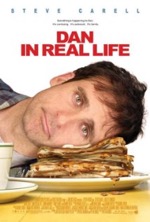
Starring: Steve Carell
October 2007
“Unexpectedly Poignant Dramedy from the King of Camp”
The family reunion movie has been done a thousand times before, but thankfully number one thousand and one saw the green light of day, because Dan in Real Life is a genuine gem filled with adult angst, familial strife and guffaws aplenty.
Dan Burns (Steve Carell), a well-known parenting expert who has his own radio program, whisks his three daughters off to his parent’s house in Rhode Island for a get-together. If Meet the Parents was set around a family reunion and only had a quarter of its clumsy mishaps, you’d have a pretty close approximation of Dan in Real Life. Whereas Ben Stiller’s Greg Focker was the very personification of Murphy’s Law, Dan merely has brushes with misfortune, like the occasional run-in with the same cop.
At the heart of the story is a painful-to-watch love triangle. Dan, who’s been a widower for four years, is just starting to work up enough courage to start dating again. Dan meets Marie (Juliette Binoche) in a bookstore and makes an instant connection with her. Hope is rekindled in his heart…a hope that’s quickly dashed when Dan learns that his new crush is actually his brother’s (Dane Cook) girlfriend. What a cruel world!
Dan spends the rest of the movie trying to stay out of Marie’s way while desperately trying to keep her out of his head; he manages to accomplish neither. Every time Dan sees Mitch and Marie’s public displays of affection, he mentally retches. Mitch and Marie are as mismatched as two people possibly can be; on the other hand, Dan and Marie are an eminently better suited couple…something everyone sees but no one voices. As Dan’s feelings for Marie intensify his behaviors become more extreme, and in the end Dan manages to alienate his family, loose the respect of his daughters and sabotage his best chance at rediscovering true love. Again, what a cruel world!
Despite instances of his patented, comedic shtick, this is Carell’s most serious role to date and he’s very effective at engendering sympathy from the audience as the black sheep of the family—Dan’s parents put him up in the laundry room and assign him to dish detail. Carell plays the pariah to the hilt; Dan is so hapless you just can’t help but feel sorry for him. Two must-see moments are the shower and burnt pancake scenes.
The movie’s synopsis is as basic as they come and its plot is unpretentious and uncomplicated, and yet the story contains some truly fine character studies and familial discoveries—the movie’s most effective attribute is its complexity amid streamlined simplicity. A family film that’s comical and inspirational, Dan in Real Life is one of the finest dramedies that’s come along in recent years. Highly recommended!
Rating: 3 1/2
No Reservations (PG)

Starring: Catherine Zeta-Jones
July 2007
“Bittersweet Treat with a Dash of Romantic Tension”
I once knew a guy who possessed an almost unnatural insight into cooking: as if reciting an Emeril show, he instructed me on what steps and which ingredients needed to go when and where to produce a savory meal…which he had just conjured up in his head and instinctually created right before my very eyes. A similar, if more professional, display of culinary genius is showcased in No Reservations, a dramedy centered on a 5-star eating establishment in NYC.
Catherine Zeta-Jones plays Kate, a workaholic chef whose ineptitude at raising children is magnified to frightening new levels when her niece, Zoe (Abigail Breslin), comes to live with her. Kate, who knows nothing about making meals for kids, serves Zoe duck for lunch and a fish (with head and tail still attached) for dinner.
Kate’s rival at work is insouciant sous chef, Nick (Aaron Eckhart). Nick’s unpredictability and fun-loving manner comes off as irreverence to Kate, especially when Nick shows up to work in his pajamas and conducts an opera with soup ladles. Kate’s problems surmount when Zoe takes a shinning to Nick and her intensifying feelings for Nick boil over, setting up some amusing interplay between the principle characters.
There’s nothing flashy about No Reservations, and that’s probably what makes it charming rather than cloyingly sentimental. The performances are sincere and bring balance to a story that easily could have digressed into a mawkish tear-fest were it not for sure-handed direction by Scott Hicks and a solid screenplay by writers Carol Fuchs and Sandra Nettelbeck. Zeta-Jones plays high-strung and lovelorn Kate to perfection and Eckhart imbues Nick with the perfect blend of boyish charm and rugged refinement. Breslin (Little Miss Sunshine) shows her serious side in her portrayal of a grieving pre-teen trying to accept the death of a loved one while adjusting to new house rules.
Though the film is a tad heavy-handed in the “tug-on-your-heartstrings” department, it’s a feel-good love story that’s sure to be a crowd-pleaser. Effectively balancing light-hearted moments with mature themes, No Reservations has all the right ingredients. As such, I have no reservations about recommending the film. Soup’s on!
Rating: 3
Hairspray (PG)
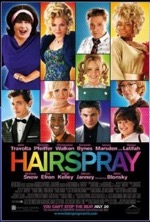
Starring: John Travolta
July 2007
“A Musical Comedy That Really Takes Hold”
Based on the earlier film (1988) and Tony Award-winning Broadway musical (2002) of the same name, Hairspray’s filmic second coming is a delightful, toe-tapping romp. Boasting a luminous cast, including: John Travolta, Michelle Pfeiffer, Christopher Walken, James Marsden, Amanda Bynes, Brittany Snow, Zac Efron, Allison Janney and Queen Latifah, the film also introduces exuberant newcomer, Nikki Blonsky, who plays “pleasantly plump” Tracy Turnblad…the big girl with big dreams of being a dance star.
Tracy faces stiff competition (from significantly slimmer women) when auditioning for the American Bandstand clone, the Corny Collins show—the highest rated program in its time slot on the local access channel in Baltimore, MD, circa 1962. Tracy’s father Wilbur (Walken), a struggling novelty store owner, is supportive of Tracy’s dream, whereas her mother, Edna (Travolta in drag), a stay-at-home laundress, attempts to quash Tracy’s dreams to protect her daughter from the pain of rejection.
Why Hairspray’s brain trust saw fit to cast Travolta as Tracy’s mom is anyone’s guess, but the Grease vet is surprisingly convincing in the role and shines in the “Timeless to Me” number; Walken, drawing upon his musical theater background, is also delightful in the scene. Pfeiffer, another Grease alumna, is delicious as the arrogant TV producer, and Marsden, as the cheesy dance show host, has never looked or sounded better onscreen—maybe he should quit his day job. As for Blonsky, she was working at Cold Stone Creamery in her hometown of Great Neck, New York when she was selected to play the ebullient youth. Blonsky was the natural choice to play persecuted Tracy; while growing up, the actress had endured similar teasing from her perfectly proportioned classmates. It’s nice to see a good girl finish first, especially one with genuine talent.
The movie’s musical numbers are first-rate, especially the dance floor jigs for the Corny Collins Show and the Hairspray Pageant. Serving as commas to the brilliantly choreographed dance songs are some surprisingly meaningful character moments and poignant social issues, such as: marital fidelity, interracial relationships, prejudice over race or weight and the battle for social progress. Amazingly, the story is just as relevant today as it was in ’88 when John Waters penned the original script; proof positive that the more things change, the more they stay the same.
They say hairspray is bad for the environment, but this Hairspray is a can of good, clean fun. While many will find the film entertaining, if even a few come away with a better understanding of the dangers of marginalization, so much the better. Spray away!
Rating: 2 1/2
License to Wed (PG-13)
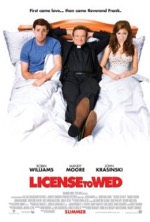
Starring: Robin Williams
July 2007
“License and Rolaids Please”
Premise:
To prove their compatibility as marriage partners, a young couple must endure the intensive, invasive and unorthodox marriage counseling methods of a radical minister.
Synopsis:
Sadie (Mandy Moore) insists on being married in the church her grandfather built, much to her fiancé, Ben’s (John Krasinski), persistent protestations. However, Reverend Frank’s (Robin Williams) calendar is so packed that he can only marry Sadie and Ben in three weeks…or sometime next year. Opting for the quicker course, Sadie and Ben are subjected to Rev. Frank’s extreme marriage prerequisite course which includes a variety of bizarre exercises. Rev. Frank’s lesson in communication sees Sadie driving blindfolded while Ben gives directions from the back seat. Rev. Frank bugs Sadie and Ben’s apartments to safeguard the couple against consummating their relationship before the honeymoon. Ben must contend with creepy robot baby twins which secrete all manner of fluids at random times in order to prepare him for fatherhood. These challenges drive Sadie and Ben further apart, which is, of course, all part of Rev. Frank’s plan. The couple breaks up, but will true love bring them back together in time to take the final exam?
Creative Contributions:
The film’s most obvious deficit is the anemic script. The premise is flimsy and the story isn’t substantial enough to hold up under its own preposterous notions. Ken Kwapis’ TV sitcom sensibilities shackle the story and William’s stale shtick kills any chance the movie has of being a charming, lighthearted look at prenuptial stress and strife. The Seed of Chucky demon-babies are downright disturbing as is Frank’s consistently deplorable behavior (just how many of Williams’ recent performances have involved eavesdropping, spying, voyeurism, etc.?)
Evaluation:
With unmistakable shades of Meet the Parents, License to Wed is a mindless rom-com that had the opportunity to explore the complexity of relationships in a mature and respectable manner, but settled for the cheap laugh instead. The formidable line-up of stars, along with solid assists from veterans like Peter Strauss and Wanda Sykes still couldn’t right the severely listing ship. Williams is regrettably hackneyed and is becoming more irrelevant with each successive role. Mandy Moore, bless her heart, has had terrible luck with her comedies at the box office this year. Better luck next year!
Rating: 1 1/2
Lucky You (PG-13)
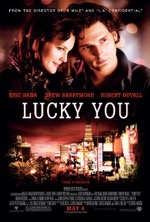
Starring: Eric Bana
May 2007
“Bana and Barrymore Are a Winning Pair”
Movies that try to create an epoxy out of disparate story elements (like Treasure Planet’s pirates in space conceit) typically fail to bond either because the elements aren’t complimentary or because spectators would enjoy seeing a film about one or the other, but not both together. In Lucky You, director Curtis Hanson—along with a star-studded cast including Eric Bana, Drew Barrymore, Robert Duvall and Debra Messing—has defied the odds with his surprisingly robust romantic drama that revolves around poker.
Huck Cheaver (Bana) is a fast-living, thrill-seeking poker addict, who lives life on the edge and lets the chips fall where they may. Estranged from his father, L.C. (Duvall), Huck has refined the art of smooth-talking, especially with women, but his lack of commitment coupled with his gambling habit has relegated him to a life of loneliness in his Spartan house, which boasts a high-end entertainment system but has less furniture than a motel room.
The movie’s romantic leads first meet when Huck rescues Billie (Barrymore) from a sleazy schmoozer. Huck soon learns that Billie is the younger sister of one of his acquaintances, Suzanne (Messing). Despite Suzanne’s warnings, Billie becomes involved with Huck, but it doesn’t take her long to discover Huck’s score: Hustle = 10, Commitment = 0. As someone who doesn’t fall for his patented spiel, Billie challenges Huck with, “You say whatever you want people to hear.” As Huck’s feelings for Billie intensify, he finds himself at a crossroads; his budding relationship now stands in direct opposition to his dream of competing in the World Series of Poker.
For some, Lucky You will feel like a feature-length version of a TV poker tournament; others will see the film as an extended seminar on the finer points of Texas Hold ‘Em poker. However, there’s more here than just a high-stakes card game. The movie is extremely instructional at revealing the gambler’s mentality: the competition and compulsion that compels the gambler to risk it all on a bet (one of Huck’s male acquaintances looses a wager and is made to walk around with false breasts).
Bana and Duvall are a very good father and son pairing and have excellent chemistry—L.C. is a two-time W.S.P. champion and Huck has lived his life in the shadow of his father’s accomplishments—the friction between the two is nearly palpable. There’s an excellent scene where L.C. shows up at the café where Huck and Billie are having breakfast. Billie, feeling awkward about the unexpected intrusion, excuses herself to make a phone call. Father and son engage in a war of words as they play a fast-paced variation of poker. Besides the action onscreen, what makes the scene crackle with intensity is the knowledge that Billie will soon return and find them playing poker. When Billie does return, her reaction—which ranges somewhere between shock and revulsion—reveals the perspective of an outsider who, for the first time, sees the mental illness that inflicts those with a gambling habit.
Duvall, like fine wine, continues improving with age—his performance here is easily the most textured and intricate in the film. Bana and Barrymore are a feasible couple and both shine in their respective roles. Though Barrymore is the beneficiary of some fine dialogue, written by Eric Roth and Hanson, she still holds her own in a role more demanding than her usual teeny-bopper fare. Parts like this just might make a serious actress out of her…time will tell.
The biggest challenge the movie faces is timing, which on the face of it sounds ignorant since timing is crucial to every movie. Texas Hold Em’ reached the height of its popularity, at least on TV, about two years ago. Had the movie been released at that time—or even six months ago so that it could cash in on some of Casino Royale’s success—Lucky You may have stood a better chance of winning big. As things are, Lucky You is a solid hand that plays up to its potential, but unfortunately doesn’t get the best of it.
Rating: 3
Amazing Grace (PG)
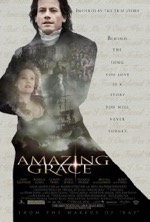
Starring: Ioan Gruffudd
February 2007
“Inspiring and Moving, but Not Quite Amazing”
You would naturally think that a movie named after the venerated church hymn would feature the song’s writer, John Newton, but, as Miracle Max from The Princess Bride would say, you’d only be “mostly” correct. Though Newton does appear in the film in a minor role (Albert Finney plays the blind composer with the appropriate degree of nobility and sagacity), the movie’s main character is William Wilberforce (Ioan Gruffudd, Reed Richards from Fantastic Four), an idealist championing social reform in Britain circa 1797. While fighting for the abolition of slavery, Wilberforce also contends with a debilitating illness which ultimately claims his life.
There are a number of memorable scenes in the film, but two standout moments reveal the ways in which good can overcome evil, even when using less than virtuous methods (See: Star Trek’s “The Savage Curtain”). The first instance of righteous chicanery occurs near the middle of the movie when Wilberforce instigates a poignant object lesson under the guise of an extravagant lunch served aboard a sailing ship drifting along one of London’s channels. Wilberforce tricks the assembled members of high society into experiencing, firsthand, the plight of African slaves when the elaborate vessel pulls alongside a slave ship. The inhuman conditions that exist on such ships, which have produced what Wilberforce terms the “smell of death,” confront the affluent onlookers with a graphic tableau of how the other half lives. There’s a bit of populist pride that creeps in when Wilberforce demands the wealthy spectators to lower the handkerchiefs from their noses and deeply inhale the fetid aroma. It’s a brief sequence that makes an indelible impression on the memory.
The other episode of legerdemain takes place near the end of the movie when Wilberforce tries pushing though legislation that will abolish the country’s slave trade policies. The strategy he uses to manipulate Parliament into getting the motion passed is a stroke of genius…it’s the stand and cheer moment of the movie. Even though his stunt is highly deceptive, the cause is just: Wilberforce’s tactics surely would’ve met with approval by the great emancipator himself, Abraham Lincoln. Hopefully, as a result of viewing this film, many will now esteem Wilberforce as the slavery abolitionist from over the pond.
Although it’s quite obvious from the outset that the film isn’t a big budget extravaganza, director Michael Apted (Nell) does an excellent job of maximizing what little star power and budget he has at his disposal in crafting this inspirational tale of Wilberforce’s unwavering courage and conviction in the face of unspeakable evil. Apted also effectively capitalizes on the strength of the exceptional supporting cast: Michael Gambon, Ciaran Hinds, Rufus Sewell and Toby Jones are all well-known and well respected British actors who perform their respective roles with the requisite degree of competence and brilliance. Aside from the cast, the bulk of the film’s meager budget was allocated for location shooting and period appropriate sets and costumes, and though the results have a decidedly Hallmark look to them at times, the overall production is bolstered by the film’s fine performances, an engaging narrative and Apted’s sure-handed direction.
With another marvelous performance turned in by Gruffudd, I guess we now must consider which superlative will accompany the title of his next project. After all, his most recent films have been fantastic and amazing. Regardless of what his next movie is named, I’m sure it’ll be stupendous.
Rating: 3
Music and Lyrics (PG-13)
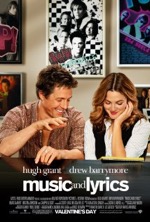
Starring: Hugh Grant
February 2007
“Romantic Melody with Dramatic Harmony”
Prosody. It’s a word music producers toss around that refers to the perfect marriage between lyrics and music. The characters in writer/director Marc Lawrence’s new film, Music and Lyrics, desperately search for prosody, both musically and relationally, and find a rare blend of artistry and intimacy over and under the piano.
Alex Fletcher (Hugh Grant), the former lead singer of the mullet-coifed 80’s group, Pop, has been commissioned to write a song for Cora (Haley Bennett), the newest sensation in pop music (think Britney but more seductive…if that’s possible). Cora gives Alex the hook line and tells him to deliver the song by Friday; Alex clears his schedule, gladly canceling a guest spot on the TV series, “Battle of the 80’s Has-beens.” Alex, who has no skill at writing lyrics, calls upon one of the industry’s finest lyricists to bail him out; but when it becomes painfully obvious that the partnership isn’t working, Alex turns to the substitute plant lady, Sophie (Drew Barrymore), who absentmindedly raps off some lines that perfectly fit the song while watering the petunias.
Alex and Sophie immediately hit it off and even though you can divine early on where the story is headed, credit Lawrence with making Alex and Sophie’s lovelorn journey a bumpy and unconventional one. In fact, the most enjoyable aspect of the movie is that the romantic interludes take a backseat to the compelling drama, which skillfully steers the plot. Case in point: there’s an excellent scene where Sophie tells Alex her back story over breakfast in a quaint bakery—it’s one of those magical moments which, unfortunately, are seldom given the chance to develop in most modern movies where special effects, not character development, rule the day.
As joined at the hip as the music and motion picture industries are, it’s refreshing to see a movie portray the music business honestly and unapologetically. Alex’ commentary at Cora’s pre-recording party—where he bursts Sophie’s idealistic bubble—is harsh but accurate, “In the end it’s all just business.” The thinly veiled caricature of Cora as a Britney/Christina/Shakira clone is perhaps a bit exaggerated but reveals the selfish tendencies and shallow propensities of many spoiled rotten pop stars who seem to make headlines (often negative) every day. Cora’s sensual, Indian-flavored songs were clearly written as tongue-in-cheek parodies of modern hits, but how similar are they to the vast majority of uninspired, cookie-cutter tunes that dominate today’s pop charts? It’s in these brilliantly insidious scenes where the screenplay is most instructive and effective. Unfortunately, the movie’s solid setup gives way to a standard happy ending that’s sure to make women sigh in ecstasy and men groan in agony.
Barrymore is in familiar territory here, and though she’s convincing, isn’t she getting just a bit typecast with these one-size-fits-all chick flicks? Could it be that there’s more in her than lighthearted dramedies? As for Grant, he simply steals the show with his charisma, charm and quick wit; his comedic timing is impeccable and his dramatic range is also impressive. The film is also augmented by its superb supporting talent: Brad Garrett takes on the role of Alex’ overprotective agent and Kristen Johnston plays Sophie’s sister, a lifelong Pop fan who absolutely worships Alex…especially when he’s in his tight black leather pants.
Music and Lyrics is a slightly better-than-average romantic comedy that strikes all the right notes with great performances and incisive dialogue. Whether or not the movie has achieved prosody, however, is a matter of opinion—after all, art, and especially music, is anything if not subjective.
Rating: 2 1/2
Because I Said So (PG-13)
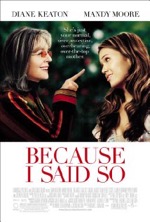
Starring: Diane Keaton
February 2007
“‘Because I Said So’ is Not Sufficient Reason to See it”
Boasting a decorated cast and an estrogen-infused screenplay, Because I Said So tells the story of a meddling mother and her three beautiful daughters; one married and two in desperate need of mom’s services as self-appointed matchmaker.
Daphne Wilder (Diane Keaton), an overbearing, overprotective divorcee, feels it incumbent upon her to find a husband for her listless and lovelorn daughter, Milly (Mandy Moore). Daphne takes a cue from MTV’s Date My Mom by interviewing prospective mates for Milly; young men who are responding to an online profile Daphne filled out for her daughter. The hapless suitors, expecting to meet Milly at an exclusive restaurant for lunch, unwittingly fall into Daphne’s web of control and are grilled about their respective careers, interests, political/ religious views, etc. As usually happens in these instances, Daphne selects someone she loves, Milly is unsure about and the audience absolutely loathes.
Lauren Graham and Piper Perabo are solid in their supporting roles as Milly’s sisters and Stephen Collins is functional as Daphne’s new beau, Joe. The acting can’t be faulted, nor can Michael Lehmann’s direction. The movie’s failure falls squarely on the shoulders of writers Karen Leigh Hopkins and Jessie Nelson, who’ve churned out one inconsequential piece of tripe here…the story is as shallow as the characters it features. When the dialogue isn’t inane, it’s filled with crude remarks and potty humor. References to reproductive organs or anything pertaining to human reproduction flow as easily from the female characters in the movie as a conversation would in a men’s locker room. Such is the movie’s degrading sense of humor, which relies on peer pressure to produce laughs because very few people would naturally chuckle at punch lines so crass and depraved. In fact, any laughter that does occur during the movie, judging from the audience I sat in, is reserved, forced or halfhearted.
Other than Milly’s wedding at the end, there’s an utter lack of progression in the film, and it’s obvious that Daphne’s supposed reformation will be short-lived. As for Keaton, her shelf-life as a leading lady may have just expired. Besides the fact that she’s starting to show her age, the normally stellar starlet steps beyond the boundaries of believability with a one-dimensional performance marked by emotional extremes in over-the-top scenes. Keaton can’t be blamed for the obnoxious character she portrays, be she can be faulted for selecting the role in the first place. If Daphne has any redeeming characteristics, they’re harder to find than a mate for Milly; especially when one considers the scenes where Daphne tails Milly on a date, views porn at home or holds up Milly’s wedding because she’s doing the horizontal mambo with Joe.
If Moore ever hopes to be taken seriously as an actress, she must resist the impulse to take the easy path and accept roles like the one she effortlessly slips into here. Of course, changing the course of her career at this point could be tantamount to steering the Titanic around an iceberg. And we all know how that ended. If she’s not extra careful, she could end up typecast…if she isn’t already?
Because I Said So is the kind of movie that gives chick flicks a bad name; it’s crude, simplistic and unsophisticated. Daphne’s erratic behavior and controlling nature are finally explained when she confesses to Milly, “I just wanted to protect you from becoming me.” I’ll protect you by issuing this warning: avoid this movie at all costs. Why? Because I said so!
Rating: 1 1/2
The Holiday (PG-13)
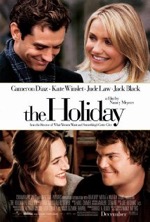
Starring: Kate Winslet
December 2006
“Emotionally Satisfying Rom-Com Delivers Seasonal Cheer”
Iris (Kate Winslet), a columnist living in England, gives her ex-boyfriend Jasper (Rufus Sewell) a present but he fails to reciprocate, barely acknowledging her existence at an office Christmas party. Though recently engaged to another woman, Jasper still professes his love for Iris. For obvious reasons, Jasper wants to keep Iris on the hook. Though she despises his philandering ways, Iris is utterly blind to her emotional dependence upon Jasper and holds on to a desperate hope of getting back together with him. Exasperated, Iris comes to the conclusion that she needs a break from her life.
Amanda (Cameron Diaz) is a self-assured movie trailer editor, who lives in L.A. After breaking up with her pigheaded boyfriend (Edward Burns), Amanda just wants to leave her troubles behind for a while. While searching for vacation destinations online, Amanda discovers a house swap option that gets her wheels turning. After an extensive IM conversation, Amanda and Iris agree to swap houses for the holidays.
If that oversimplified plot outline didn’t grab you, I urge you to disregard my Jack and Jill synopsis and give The Holiday a chance to warm your heart with its sincere performances, emotionally complex story and astounding direction by Nancy Meyers (The Parent Trap). Meyers is a master at gradually layering characters’ emotions which yield intense payoffs later in the film. She can even achieve such satisfying results with shallow characterizations such as Sewell’s unrepentant boor. Despite the occasional schmaltzy scene or line of dialog, the film is deeply moving in ways more subtle than obvious.
You would naturally and justifiably expect a lot out of a cast including Diaz, Winslet, Jack Black and Jude Law, and they all live up to their billing, especially Black, who turns in his most endearing performance as a movie composer…very few actors could’ve pulled off the “accidental boob graze” scene with as much charm. Additionally, the scene where Miles (Black) serenades Iris in a video store is an instant classic (keep an eye out for a Hollywood mega-star, who gets one of the biggest laughs in the film).
What puts it over the top for me is a subplot focusing on Iris’ serendipitous friendship with a retired motion picture screenwriter named Arthur Abbott (Eli Wallach). Abbott’s commentary on the current state of Hollywood, in light of its glorious past, is a fascinating aside that Meyers didn’t have to include, as it has very little bearing on the overall story. The fact that Meyers took the time to develop this storyline, along with all of the leading characters, is what differentiates this project from the run-of-the-mill rom-coms that seem to pop up like weeds at the Cineplex these days. Meyers’ screenplay has some meat, some meaning, along with healthy doses of comedy and romance.
Words sometimes fail when attempting to describe The Holiday because it’s a movie that has to be experienced, not merely discussed. There’s a lot of movie magic here, which hopefully will translate into generous box office. With instant name recognition and A-list headliners, here’s hoping The Holiday will be cherished as a seasonal favorite for many years to come. For those who appreciate intuitive direction, believable performances and organic writing, Christmas has come early this year.
Rating: 3 1/2
The Illusionist (PG-13)
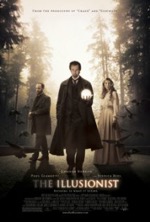
Starring: Edward Norton
September 2006
“Like Lucky Charms, It’s Magically Delicious”
As I started jotting down notes at a screening of The Illusionist, my pen abruptly died. After exhausting every conceivable strategy of coaxing ink out of the depleted stylus, I settled on an alternate note-taking strategy. I wrote my observations with a firm hand and later retrieved them by rubbing pencil lead over the page, which revealed the text in reverse. When I started writing this review, it suddenly occurred to me that such basic science might be commonplace to you and me, but to a five-year old child it might appear as…magic!
The magic performed by Eisenheim the Illusionist (Edward Norton), however, is a tad more sophisticated than my pencil-rubbing trick. It is said that, as a boy, Eisenheim was inspired by a traveling magician who showed the lad a few illusions before disappearing into thin air. Magic consumed the Eisenheim during his formative years, but his focus expanded the day he encountered the beautiful duchess, Sophie. Despite their disparity in social standing, Eisenheim and Sophie were inseparable growing up; “One day we’ll run away together,” she promised.
As an adult, Eisenheim plies his trade as an illusionist in small, but packed theaters in Vienna, garnering the esteem of many prominent patrons, including the inquisitive Chief Inspector Uhl (Paul Giamatti). During that fateful performance, the magician asks for a volunteer, and, much to his surprise, Eisenheim is reunited with his childhood sweetheart when she glides onto the stage. After the show, Eisenheim learns that Sophie (Jessica Biel) will soon be engaged to Leopold (Rufus Sewell), the crown prince. Sensing the potential threat posed by Eisenheim, Leopold orders Uhl to “shut him down” (surely a common phrase during that period). With Uhl watching his every move and Leopold seeking his life, Eisenheim creates a new show that must confound the audience, foil Leopold’s plans and win back Sophie’s heart before it’s too late.
As the movie’s slogan suggests, “Nothing is what it seems.” This is certainly true as the movie never reveals its hand until the very last scene. Based on a short story by Steven Millhauser entitled “Eisenheim the Illusionist,” writer/director Neil Burger does an excellent job of managing this gothic tale, which certainly would have floundered in the hands of someone less visionary. The costuming, makeup and historic props and sets all exude authenticity and Burger’s use of a sepia-hued palette, aged film stock effects and old-fashioned circle wipes is extremely effective. Also, the revelation scene—where Uhl mentally deconstructs Eisenheim’s ultimate illusion in a montage of shots—is a brilliant way to illustrate the Chief Inspector’s flow of deductive reasoning.
Norton (The Italian Job) is a bit subdued here, but plays the part of Eisenheim with deftness equal to the skilled magician. Impressively, Norton did most of his own tricks in the movie (with the assistance of magician David Blaine), and what’s more, very few of the movie’s illusions received a CG touch-up.
Biel and Sewell (A Knight’s Tale) work fine as an improbable couple and their performances, as secondary characters, properly garnish the juicy ménage trios subplot—Biel soars here, leaving behind her 7th Heaven chrysalis. Though all of the actors shine, Giamatti’s performance stands out like a lighthouse beacon on a stormy night. Giamatti’s range is awe-inspiring; I’m thoroughly convinced that if someone put a white, fluffy wig on the actor’s head and said, “Be a Q-Tip,” he would not only pull it off but add unexpected nuance to the part. For The Illusionist, Giamatti adopts a European accent and a resonant baritone; he speaks softly, but with authority. Sporting a full beard and slicked back hair, viewers may fail to recognize Giamatti at first glance. Whereas Norton is the film’s heart and soul, Giamatti is its conscience and backbone…the versatile character actor has turned in yet another memorable performance.
Due to the constraining nature of a period piece featuring a magician, the movie, though entertaining and thought-provoking, is far from Best Picture caliber. However, the movie does boast one of the most satisfying twist endings to come along in quite some time. Anchored by a superior cast, The Illusionist juggles character development with breathtaking cinematography and an intricate plot that contains just the right amount of romance, political intrigue and brow-furrowing mystery. Now that’s a trick!
Rating: 3
Click (PG-13)
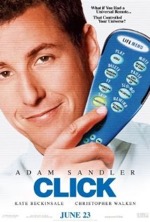
Starring: Adam Sandler
June 2006
“Not Even Remotely Entertaining”
The word tripe, as defined by Merriam Webster, is: something poor, worthless, or offensive. This definition more than adequately describes Adam Sandler’s Click. Finding even one redeeming quality in the movie would make hunting for a needle in a haystack an enjoyable pastime. Many of the movie’s themes and gags are abhorrent (i.e., the family dog repeatedly humping a large stuffed duck), and potty humor runs rampant throughout this severely modernized and significantly dumbed-down variation on Charles Dickens’ classic A Christmas Carol. Click, much to its detriment, suffers from the same brand of lowbrow idiocy that seems to plague the majority of Sandler’s films.
The story focuses on one man’s struggle to juggle the various aspects of his life; family, work, recreation, hobbies, etc. Michael Newman (Sandler) just can’t seem to get it right; the more he tries to organize his life, the more he falls behind and the angrier he becomes. But everything changes the day he falls asleep on a demo bed in a Bed, Bath & Beyond store. Waking up, Michael sees a door marked “Way Beyond.” Opening the door, Michael enters a gigantic warehouse filled with crates, a la Raiders of the Lost Ark, and meets eccentric scientist, Morty (Christopher Walken). Morty has the solution to Michael’s chronic busyness; a remote control that can control Michael’s life…remotely.
At first, Michael has so much fun with the remote control—he pauses a conversation with his boss (David Hasselhoff) and gives the man a migraine by slapping him silly, adjusts the color to make himself look like the Hulk and fast-forwards through whole arguments with his wife—that he fails to see its detriments. As time continues flying by and the remote’s preference mode skips ahead to major events in his life, Michael realizes he’s missing out on meaningful moments with those he holds most dear.
Though I can appreciate the film’s carpe diem sentiment, I just can’t abide Michael’s selfish preoccupation and obnoxious behavior; both character flaws are off-putting and significantly undermine Michael’s status as protagonist. While the movie’s moral is universally relevant, the story’s execution is ill-conceived and overly pedestrian. Still, the greatest narrative crime committed in the remedial screenplay, written by Steve Koren and Mark O’Keefe, is the utilization of the notorious “it was only a dream” twist…we can forgive Dickens for using it, but no such grace can be extended here.
Click passes up on a prime opportunity to tell a truly poignant tale and also squanders quality supporting performances by Kate Beckinsale, Sean Astin and Henry Winkler. Some will consider Click quality entertainment, but for me, I’d rather change the channel.
Rating: 1 1/2
The Lake House (PG)
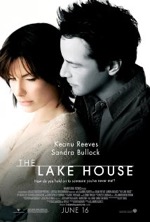
Starring: Keanu Reeves
June 2006
“Timeless Romance with ‘Speed’ Stars”
This type of movie has been done before, most notably in Frequency (2000), which starred Dennis Quaid and a pre-Jesus Jim Chaviezel as father and son separated by time but able to communicate via a HAM radio, which receives an ethereal signal boost from unusual solar flare activity in both time periods. At one point in that movie, Quaid, living thirty years in the past, places a wallet in a Ziploc bag and hides it under a loose floorboard, telling his grownup son in the future where to find it. Chaviezel immediately retrieves the wallet and uses it as a clue to track down a serial killer.
Mailing across time is taken to a whole new level in The Lake House, director Alejandro Agresti’s temporal romance starring Speed duo, Sandra Bullock and Keanu Reaves. Kate Forrester (Bullock) is a doctor at a large Chicago hospital; seeking refuge from the frenetic pace of city life, Kate moves into a lake house on the north shore. Once settled in, Kate finds a forwarding note from the previous tenant, Alex Wyler (Reaves), inside the mailbox (which becomes the focal point of the movie and the conduit through which the characters communicate with each other). Mistaking the note as a prank, Kate writes a response to Alex, sets the letter inside the mailbox and raises the flag. As soon as Kate turns to go, the flag drops. Inside the mail box is another message from Alex, ardently claiming veracity on his part and belying any notion of a practical joke. As Kate and Alex continue exchanging notes over the next few days, they make an astonishing discovery—though Kate and Alex inhabit the same physical space, they exist in two different times. Kate lives in the present day (2006), but Alex is writing her from 2004.
Though the movie’s plot is a little too convoluted at times, it’s a tight yarn with an interesting character study, particularly in Kate’s case. At some point, Kate realizes she’s falling for a man she can never have; a bitter reality that exemplifies her life and ongoing struggle to find fulfillment. One of the finest scenes in the movie is when Alex takes Kate on a virtual walk with the assistance of a map and prerecorded cassette tape; Alex’ commentary is conveyed in a series of voice-overs, and, as an architect, he describes some of Chicago’s landmark buildings in great detail. It’s a touching moment, but when complications surmount and a relationship with Alex seems more and more impossible, Kate severs all communication with Alex. Kate concludes that Alex was “just a beautiful fantasy where time stood still,” and decides to move on by letting go of the past.
The movie’s unconventional resolution caps off a moving, thought-provoking love story that succeeds by placing emphasis on plot and character and not on a contrived or commonplace romance…the fact that the leads barely encounter each other aids the movie in subtle yet powerful ways, producing yearning in the characters as well as the audience. Some mysteries remain unexplained, however; such as how the couple can communicate in the first place. It may seem coincidental that both Kate and Alex have the same pet, a female dog oddly named Jack, but I believe the canine is the key to their ability to communicate with each other across time. Jack barks and runs away when Alex’ friend, Mona, makes a pass at him and the dog leads Alex to Kate’s birthday party where couple first meet. At times, the dog almost seems sentient. Could it be that Jack (an alien or supernatural being in disguise) is orchestrating events to bring the lovelorn couple together? It’s as good an explanation as any, I suppose.
Though the pacing is slow at times, the movie has great atmosphere—Agresti makes excellent use of the breathtaking lake house set, built, according to the story, by Alex’ absentee father, Simon (Christopher Plummer). Simon’s discourse on the proper use of light in architecture is memorable, though not necessarily crucial to the story. As for Bullock and Reaves, their acting isn’t memorable in the least, but that’s exactly what the script requires…less-nuanced performances would have overpowered the plot and distracted the audience from what turns out to be a first-rate love story, garnished with a sprig of suspense and seasoned with a sci-fi paradox.
Jane Austen’s Persuasion is referenced on several occasions in the movie and that novel’s themes of waiting for the right time and receiving a second chance find modern expression in The Lake House.
So the next time you go outside to mail a letter, if your mailbox flag suddenly drops after you raise it, it’s probably just a loose screw, the pull of gravity or a stiff breeze. But just in case, check it anyway.
Rating: 3
Just My Luck (PG-13)
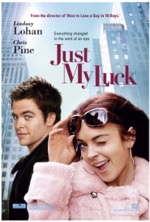
Starring: Lindsay Lohan
May 2006
“Polar Opposites Attract in Lucky Lohan’s Love Story”
Years ago I had a roommate who was unbelievably lucky; if it wasn’t for the fact that he was such a genuine, charismatic, decent, all-around good guy who deserved every gift that was ever lavished upon him, I probably would have gone stark raving nuts. Were it anyone else, I would have been nauseous every time the woman behind the bakery counter gave him an extra cookie for free, or when a generous stranger sold him a car for a dollar after learning he was without transportation (the honest to goodness truth). But, I can’t begrudge my ex-roommate any of this; he’s a quality person, someone who can walk right up to anybody and become their best friend within five minutes. The funny thing is…his ability to seem helpless, and thereby receive countless acts of charity, was completely lost upon him until I pointed it out to him. He eventually came to the realization that his was truly a charmed life. Perhaps you know someone like this.
When it comes to luck, Ashley Albright (Lindsay Lohan), reminds me of my ex-roommate. A spirited and overly-optimistic debutante, Ashley has everything going for her; beauty, talent, wealth and most of all, luck…the second she steps outside into a downpour, the rain, as if sensing her presence, ceases to fall. Ashley’s never known a loosing lottery ticket and when she hails a taxi, every cab in the vicinity converges upon her position. Her polar opposite, Jake Hardin (Chris Pine), is a walking calamity; Jake’s an affable, well-intentioned young man who just has terrible luck…when it’s not raining on him, pigeons are pooping on him. And, just when it looks as if his fortunes might change (Jake finds a five dollar bill in the trash can), he discovers that fate has played a nasty trick on him (he picks up the bill and gets warm, mushy poodle poop all over his hand).
Ashley and Jake eventually meet at a masquerade party. Jake ushers Ashley onto the dance floor, and in a fateful moment of passion, they engage in a lingering kiss that reverses their luck. Ashley becomes a hapless klutz and gets a taste of how folks live on the other side of the luck spectrum…she’s fired from her job and thrown in jail for unwittingly setting up her boss (Missi Pyle) with a male escort. Jake’s fortunes immediately change for the better; he saves the life of a big shot record producer and secures a contract for the band he’s been promoting, McFly (an obvious homage to Back to the Future). McFly is poised for their big break, but when Ashley kisses Jake to get her good luck back, things come crashing down upon Jake and the band. Ashley’s conscience forces her to make a terrible (by chick flick standards) choice: In order to get the man of her dreams, she must give up her life of ease and forever be unlucky.
Lohan has come a long way from her Parent Trap days, but it’s as if she’s got one wing outside the cocoon and is just waiting for the right role to come along to free her from her teeny-bopper chrysalis and establish her as a full-fledged movie star. Lohan is superstitious in real life, which perfectly plays into her part and the story in general; but we’ve seen the whole “role reversal” gimmick before in some of her other movies, most notably, Freaky Friday. It’s high time for Lohan to turn over a new (tea) leaf, and play a part that has some depth and believability.
Pine is a breath of fresh air in the movie, and if the film is successful in any way, it’s due in large part to his skilled portrayal of a young man plagued by Murphy’s Law. We can identify with his character more than Lohan’s because he’s a guy who’s making his way in the world while just trying to make it through the day…Lohan’s debutante is a spoiled brat who deserves her comeuppance when she looses her luck.
Director Donald Petrie (Miss Congeniality) has served us up a reheated version of Danny Glover and Martin Short’s Pure Luck. In that film, unlucky Short is hired to find the missing daughter of a wealthy businessman. In the end, the theory that one unlucky soul will find another is proven true in the highly amusing tale. Whereas, Pure Luck is a comedy; Just My Luck is a chick flick replete with silly scenes like the sudsy explosion in Jake’s laundry room or the sequence where Ashley kisses twenty guys in an attempt to find the man who stole her luck. The movie tells us that “the wheel always spins back.” Maybe the wheel can give me back my two hours…that would be lucky!
Rating: 2
She’s the Man (PG-13)

Starring: Amanda Bynes
March 2006
“Gender-bender with a Twist of Teeny Bop”
Viola (Amanda Bynes) is an incurable teenage tomboy who would rather be playing beach volleyball than helping out in the kitchen, much to her mother’s eternal chagrin and disapproval. Viola is also an excellent soccer player, the best on the team in fact; but Viola’s dream of carrying her team to a championship is abruptly shattered when she learns that the women’s soccer team at her high school has suffered sudden death.
Viola’s mother isn’t very sympathetic when she receives the “bad news;” with soccer cancelled, Viola’s mom strongly encourages the youth become involved with woman’s socials to learn the finer points of being a woman. When Viola stubbornly refuses, her exasperated mom replies, “Sometimes you’re just like your brother.” In that instant, a plan coalesces in Viola’s mind; her twin brother, Sebastian (James Kirk), will soon be taking an extended trip to Europe, leaving an open roster spot on the men’s soccer team at the upper-crust academy he attends.
Yep, you can guess what happens from here. Gender confusion creates most of the problems, and humorous situations, in the movie, i.e.: Viola falls in love with her hunky roommate, Duke (Channing Tatum), while the hottest, most popular girl in school, Olivia (Laura Ramsey), falls for Viola…disguised as Sebastian. There’s an amusing scene at a carnival where Viola, as herself, anticipates a rapturous lip-lock with Duke, who’s manning a kissing booth. As fate would have it, Duke is rotated out one girl before Viola. Dejected, Viola changes back into her Sebastian disguise, but then her mom shows up and she has to quickly change back; the scene recalls Robin Williams’ cross-dressing high jinx in Mrs. Doubtfire. The nerve-wracking complexities of leading a double life are painfully multiplied when Sebastian arrives home a day early and inadvertently ruins all of Viola’s well-laid plans.
Bynes does an amazing job of approximating male speech and mannerisms; the movie’s success is largely due to her role-reversing performance. Her comedic timing is dead-on, especially in the scene where Duke’s friend discovers her stash of tampons and she has to quickly improvise her way out of the jam—funny stuff!
Though She’s the Man is little more than a teenybopper movie, which is loosely based on Shakespeare’s Twelfth Night, the excellent lead performance in tandem with a surprisingly respectable plot renders the movie enjoyable instead of merely tolerable. I commend the film for steering clear of any uncomfortable or controversial issues: there is gender-bending without breaking in a storyline that could’ve crossed lines, but didn’t.
She’s the Man is a bona fide crowd-pleaser, a popcorn movie in the truest sense and a message-free examination of the life of one teenage girl. Uh, boy. Uh, girl.
Rating: 2 1/2
Failure to Launch (PG-13)
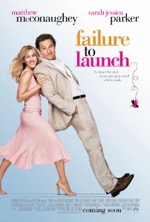
Starring: Matthew McConaughey
March 2006
“Aptly Named Rom-com Never Gets Off the Ground”
From a marketing standpoint, someone should’ve pointed out the dangers of using such a negative word in the title: failure. Besides the negative connotation the word conjures up, the potential for a self-fulfilled prophesy should have prompted studio executives to demand—in no uncertain terms—a name change. As things stand, the titular condition is the perfect diagnosis for the movie’s halfhearted performances and a story that, despite its best efforts to take flight, never achieves liftoff.
Finding anything redeeming here, much less entertaining, is nearly impossible. For starters, Matthew McConaughey and Sarah Jessica Parker have absolutely no chemistry whatsoever, which makes buying into the romance subplot extremely difficult. Also, Tripp’s (McConaughey) overprotective parents—meddling mom, Kathy Bates and daft dad, Terry Bradshaw—are one breakdown shy of the loony bin. This, of course, begs the question of why an adult would choose to live with such certifiable progenitors. One can only put up with so much in exchange for free room and board. I mean, if my father insisted on walking around the house in the buff as Tripp’s dad does (for several excruciating, eye averting minutes of onscreen time) I’d pack my things and take up residence on a friend’s couch before you could say nudist.
Tripp’s buddies play the usual well-meaning, advice-giving friends, but are one-dimensional stock characters whose sole purpose in the movie is to provide comic relief. The only peripheral cast member who actually offers some depth of character is Paula’s (Parker) sister, Kit (Zooey Deschanel). Kit is a lonely young woman with real emotions and real needs. A movie centered on her character’s plights would have been eminently more satisfying.
The movie has a modicum of clinical psychology and a ton of hyper-real situations that are designed to keep the audience rolling in laughter for two hours so that they don’t realize that they’ve been duped into enjoying a movie that has no plot. Failure to Launch is a prime example of what ails modern comedy films: it delivers the sizzle when audiences paid for a steak.
In all fairness, there are a few scenes that divert attention away from the insipid love story and the dysfunctional arrangement on the home front, but these moments are few and far between. Though the paintball skirmish and rock climbing wall excursion add some much needed energy to the stuck-in-neutral narrative, both sequences rely too heavily on standard comedy gimmicks and only garner cheap laughs which make them instantly forgettable. Sad to say, but either of these “action” scenes could be dropped into any other modern rom-com and they would work just as well. As such, Failure to Launch is just another “template” story (see my review for Eight Below).
In the end, Failure to Launch desperately tries to be clever but fails miserably with its anemic screenplay and characters that annoy more than they interest. Even the movie’s considerable star power couldn’t deliver enough thrust to get the leaden plot payload off the ground. Hollywood, we have a problem…we need a better script!
Here’s a scary thought: with the earth’s increasing population and the diversity of styles and tastes that pervade our culture, Failure to Launch is bound to be someone’s favorite film. Be very afraid!
Rating: 1 1/2
Joyeux Noel (PG-13)

Starring: Diane Kruger
March 2006
“Inspiring True Account of History’s Most Miraculous Truce”
Based on the incredible true story of the night peace and good will visited the trenches of French, Scottish and German soldiers during WWI, Joyeux Noel (aka Merry Christmas) chronicles the events surrounding history’s most astonishing ceasefire. On Christmas Eve, 1914, a German tenor started singing “Silent Night” and, upon recognizing the sacred Christmas carol, French and Scottish soldiers added their voices to the multicultural chorus from across the blood-soaked, corpse-littered battlefield. A miraculous event transpired when white flags ascended and soldiers from both sides descended upon the soiled plain; soon mortal enemies were communicating with each other (with only gestures in some cases), trading valuables and proudly showing off pictures of loved ones.
At the conclusion of a solemn Latin mass officiated by a Scottish priest, the three leaders had a summit and mutually agreed to lay down arms and sort out the fallen soldiers the next day. On Christmas day, one soldier ironically observed, “We’re burying the dead on the morning when Christ was born.” The day after Christmas presented a perplexing challenge as many of the soldiers on both sides struggled with resuming combat—men with whom they had played a friendly game of kickball the day before were now lined up in their crosshairs. Having seen the face of the enemy, many were reticent or flat-out refused to fight.
The irony of the story is how perspective can paint or taint our reality. For many of the soldiers, once the floodgates of friendship and mutual understanding had been flung aside, there could be no going back to the clear-cut, good guys/bad guys patriotism that prevailed in their home countries. The repercussions of treating the enemy with the tiniest shred of humanity were severe—most of the soldiers were sent home in disgrace, branded as traitors and replaced by fresh troops who were all too eager to raise the Sword of the Lord against the unholy hoard that was the German army. Though this makes for a bittersweet ending, Joyeux Noel, as a whole, is uplifting and inspirational, and the movie’s salience, in light of current events, is profound.
Despite the exemplary effort exhibited by the costuming, props and art departments, the movie suffers from slow pacing and static direction from writer/director Christian Carion, especially in the early goings. The only familiar face among the cast is Diane Krugger (National Treasure), who plays Anna Sorensen, an opera singer and wife of the German soldier who initiates “Silent Night.” The rest of the cast is comprised of foreign actors who adequately inhabit their roles with three standout performances: the singing German soldier, the French commander and the Scottish priest, who is the beneficiary of the best lines in the movie.
Joyeux Noel will undoubtedly find its place among the vast catalog of seasonal treasures, but the movie will be remembered more for its political commentary than for its Christmas-related story elements, which, though vitally important, comprise a very small part of the overall plot. They say music is the universal language, and if sworn enemies can find fellowship and common ground in the midst of the hellish realities of war, the adage is supremely accurate.
Rating: 3
Memoirs of a Geisha (PG-13)

Starring: Ziyi Zhang
December 2005
“Finely Mounted Retrospective of Oriental High Art”
Essentially an Asian Cinderella, Memoirs of a Geisha, based on Arthur Golden’s bestselling novel of the same name, is a visual masterpiece; effectively combining authentic sets, vibrantly colored costumes and sweeping cinematography that literally can take one’s breath away, the movie transports spectators into the brutal, yet exhilarating world of a young girl living in a Japanese fishing village on the eve of WWII.
The movie opens with blue-eyed waif, Sayuri (Ziyi Zhang), being sold into slavery and separated from her sister, Pumkin. Just like the downtrodden step-daughter in Cinderella, Sayuri is blamed and punished for every familial mishap and has no purpose in life or hope for the future until she’s sold to Mameha (Michelle Yeoh), a stern matriarch who sees the young girl’s potential and trains her to be a geisha.
Though the movie’s earlier stages are plodding, the training sequences are extremely engaging and serve as a window into mid-twentieth century Japanese mores and customs. In a scene reminiscent of the horserace in My Fair Lady, Sayuri must prove herself as a full-fledged geisha by catching the eye of a prominent chairman (Ken Watanabe) at a sumo match; selling herself to the highest bidder is how a geisha earns her stripes.
The movie takes an abrupt left turn with the onset of WWII; the effects and ramifications of the war, as seen through the eyes of Sayuri and the other geisha girls, affords the audience a unique perspective on the war and the turbulent rebuilding process. This dark time—when geishas, accustomed to the perks of high society, find themselves working in the rice fields in order to survive—is one of the more interesting chapters in the film.
The word geisha means artist, and geisha girls are judged as moving works of art; in addition to extensive training in dance and creative movement, an experienced geisha will also have the ability to stop a man dead in his tracks with just one look. It’s fitting that a story so focused on art should excel at acting, directing, set decoration, costuming, makeup and cinematography. Also, John Williams’ oriental-flavored score perfectly accents the gorgeous, finely crafted film, and is worthy of Oscar consideration.
Though the movie suffers from slow-pacing and is, perhaps, a bit too long, it approaches high art with all the grace and elegance of a highly-skilled geisha thanks to an excellent script by Robin Swicord and superlative direction by Rob Marshall (Chicago). Memoirs of a Geisha is a touching story of integrity amid fierce rivalry and is a visual spectacle unlikely to be surpassed in the near future.
Rating: 3
The Family Stone (PG-13)
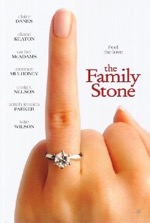
Starring: Dermot Mulroney
December 2005
“Diamonds Are Forever…Dysfunctional Dramedies Aren’t”
If Meet the Parents was recast and rewritten as a drama, the result would be The Family Stone, director Thomas Bezucha’s bittersweet Yuletide portrait of the pun intended Stone family. Though the gags here aren’t nearly as plentiful or outlandish as those seen in Meet the Parents, there are some humorous lines and situations sprinkled in among the hard-hitting, issue-driven narrative.
The entire plot hinges on the relationship between Meredith Morton (Sarah Jessica Parker) and Everett Stone (Dermot Mulroney). Meredith is on the stiff and stuffy side, whereas Everett and his entire family, consisting of dad, Kelly (Craig T. Nelson), mom, Sybil (Diane Keaton), sister, Amy (Rachel McAdams) and brother, Ben (Luke Wilson) are on the spontaneous, accepting and fun-loving side of the spectrum. So when the Stone’s find it difficult to accept Meredith, there’s big trouble for Meredith and Everett’s relationship, a problem that continues to intensify with each additional faux pa (like when Meredith shows her true, perfectionist colors during a game of charades), misunderstanding or ideological difference.
The crux of the movie, as one would gather from the title, is the Stone family wedding ring which has been passed down as an heirloom for generations. Cybil is reticent to hand over the ring because she isn’t convinced that Meredith is “the one” for her son. Everett comes to the same conclusion when Meredith insists on sleeping in a separate room from him and when he later develops feelings for Meredith’s sister, Julie (Claire Danes). Cupid throws another relational curveball when Ben gets Meredith drunk at a bar and the couple is discovered in bed together the next morning.
Further spiking the eggnog is an incendiary subplot involving the Stone’s adopted son, Thad (Tyrone Giordano), who, in addition to being deaf, is also gay. At the dinner table, Meredith recklessly walks into a lion’s den when she asks Cybil if she ever wished her son wasn’t gay…to spare him any psychological discomfort or social stigma. Meredith, oblivious to the growing hostility around her, persists in pushing her values on the Stones until red-faced Kelly explodes in anger and storms away from the table. The scene seems utterly unnecessary and is too politically-charged for i7ts own good; but I suppose the writers felt it necessary to add this incident to the ever-growing list of grievances the Stone’s hold against Meredith.
Therein lies the movie’s greatest miscalculation; as a main character, the audience is inclined to like Meredith, but the script requires her to be at constant odds with the Stones. Since the film has no antagonist (its most glaring deficiency) Meredith, with her air of superiority and annoying throat-clearing tick, is made villain by default.
I have no qualms with the acting, directing or other production values in the movie, but the story’s pacing is nearly catatonic at times, even when compared to other dramedies of this kind. To its detriment, The Family Stone focuses too much of its attention on issues and not nearly enough of its time on the peripheral characters. Whether The Family Stone becomes the next Christmas classic remains to be seen, but its status as a run-of-the-mill drama is secure.
Rating: 2 1/2
King Kong (PG-13)

Starring: Naomi Watts
December 2005
“Lots of Art, Not Much Heart”
Peter Jackson’s King Kong in a word? BIG! There’s nothing small about the movie…the scope, scale and vision are unparalleled, save for Jackson’s The Lord of the Rings trilogy. The movie is a dazzling spectacle, a modern masterpiece and a throwback to Hollywood’s Golden Age all wrapped up in one hairy, king-sized package.
I suppose the prevailing question surrounding the high-profile, highly-anticipated film is, “Why another remake of the B tier creature-feature, first released some seventy-two years ago?” The quick answer is that Jackson fell in love with the original as a wee lad; it was his profound admiration for the clunky stop-motion classic that inspired him to become a motion picture director. The real answer is…who’s going to deny Jackson anything? After sweeping all eleven statuettes at the 2004 Academy Awards ceremony for the final LOTR installment, The Return of the King, Jackson could film a blue screen for three hours and we’d still watch it.
While surveying the well-established, highly-eclectic cast, the biggest surprise (and bone of contention among pre-premier fans) was the decision to tap slapstick comedy actor, Jack Black (School of Rock), for the title role. After viewing the film, however, most people probably will agree that Black does a superb job of fleshing out the young, brazen film director, Carl Denham. The ambitious auteur, as drawn by Jackson and Black, is frighteningly similar to a young Orson Welles; and you can be sure that such similarities aren’t lost upon either director or actor. Denham’s narcissism drives him to lie, cheat and cajole in order to get his picture made. The character possesses an eerie brand of fearlessness…even with dinosaurs charging toward him, Denham keeps the camera rolling, and it’s ultimately Denham who throws the bottle of chloroform that KO’s the angry gorilla. Denham is devastated when his camera is destroyed, but shows no remorse, whatsoever, for his fallen comrades. So severe is his megalomania and so entrenched is his need to be loved by the masses (Citizen Kane), that Denham revels in the opportunity to showcase the gigantic gorilla in an exhibition when they arrive back in NYC; taking credit for capturing the ferocious beast whenever he can, of course. Denham’s unbridled ambition and lust to provide his audience with a spectacle is a fascinating character study; in this memorable turn, Black is flawless.
Adrien Brody is adequate as renowned playwright, Jack Driscoll, but it’s Naomi Watts, in the pivotal role as struggling actress, Ann Darrow, who really steals the show. Though she never threatens to dethrone Fay Wray, Watts does an excellent job of emoting only when necessary. There’s a wonderful scene where Ann performs dance movements for Kong to entertain him (and keep him from eating her)—Kong soon grows bored and knocks her down to amuse himself. After repeatedly being shoved to the ground, a furious Ann strikes back at Kong, pricking his finger with a branch. Kong goes berserk and nearly destroys everything around him until a boulder falls on his head and dazes him. In that moment, the beast realizes the beauty isn’t afraid of him…an emotional bond forms between them. This touching moment, like the sad goodbye before Kong tragically plummets to his death, allows a ray of humanity to break through the cloud of CGI. Sadly, these intimate segues are few and far between in the film.
Andy Serkis (who makes a cameo as the ship’s cigar-chomping cook) is masterful as Kong. He brings the full gamut of motions, emotions and facial expressions to the colossal gorilla—in the same way he did for LOTR’s Gollum—by donning the blue sensor suit that’s become a second skin to the actor. Serkis will go down in motion picture history as the CG man…a truly unique and unsung talent.
The excellent performances bring the movie to life and the script (slightly tweaked from the original) is engaging, but it’s clearly the special effects that drive the film. Jackson earned the title “FX Wizard” while working on the LOTR movies, but in the words of Emeril Lagasse, he’s “kicked it up a notch” for King Kong, unleashing the creative masterminds from his Weta Workshop upon his dream project (many of the skilled artisans have worked with Jackson for the past decade now).
The iconic battle between Kong and the fighter planes atop the Empire State Building has received a facelift here, but seems like a no-brainer to storyboard. More impressive are the scenes involving the natives kidnapping Ann, the dinosaur stampede, Kong overturning the giant tree bridge and the scene where colossal slugs and bugs attack the explorers (easily the most disgusting tableau I’ve seen in a non-horror movie for quite some time—a full four minutes of creepy-crawly nastiness). One of the most deftly executed action sequences ever to grace the silver screen occurs near the movie’s midpoint…Ann desperately tries to escape the reckless pursuit of three Vastatosaurus Rex’ (think T-Rex with acne and bad dental work), faux dinosaurs dubbed by the clever minds at Weta. The sequence where Kong takes on all three Rex’ while tossing Ann from hand to foot, etc., is pure kinetic euphoria, and the scene where they all fall though the vines (Ann comes within inches of a Rex’ snapping jaws) is the creative high point of the film. There’s a great moment at the conclusion of the fight when Kong separates the Rex’ jaw from its head and beats his chest in defiance. Take that, you overgrown iguana!
For all of its technical achievement, however, King Kong misses the point by missing the human element of the story. Character development is inexcusably cursory in the film (which weighs in at 3 hours and 7 minutes) and everyone except for Denham and Darrow is overpowered by the movie’s unrelenting, mind-blowing effects. Though the story is a bit plodding before the Venture reaches Skull Island, the action achieves break-neck pace on the island, leaving little room for meaningful conversation unless you consider screams of terror to be finely-crafted dialogue.
Maybe we’ve come to expect too much from the story in the first place. The notion that a gigantic simian can fall in love with a woman (and a knock-out at that) will always remain a silly one, but King Kong, somehow, makes that improbability feasible and accessible with convincing performances and skilled direction. Jackson’s King Kong is finely-mounted, keenly-focused and larger than life in most respects. Whether or not it captures the heart and soul of the original is up to personal opinion. One thing is for certain, however, Jackson’s take on the classic story doesn’t monkey around.
Rating: 3
Yours, Mine and Ours (PG-13)
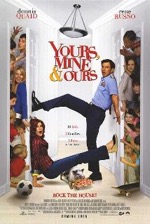
Starring: Dennis Quaid
November 2005
“Underachieving Retread of ‘Opposites Attract’ Classic”
As a rule, remakes never live up to the original: that axiom certainly holds true with the new Yours, Mine & Ours. The original movie, based on the real-life experiences of Helen Eileen Beardsley, was released in 1968 and starred Lucille Ball and Henry Fonda. Touted as one of the best family films of the 60s, the original far surpasses this flaccid update—we can thank a snake-bitten Hollywood (still reeling from the ’05 box-office bust) for playing it safe and green-lighting such a mediocre affair.
The percussive opening is one of the only highlights in the movie, but, unfortunately, the rest of the score is standard fare. As the story unfolds, we are introduced to starched and pressed Admiral Frank Beardsley (Dennis Quaid) and his eight kids and free-spirit purse designer, Helen North (Rene Russo) and her ten kids (six were adopted, but who’s counting?). Frank and Helen run into each other at a restaurant and the old flame is rekindled (they were high school sweethearts). While catching up on old times, Frank and Helen learn that they’ve both been widowed, and anyone who hasn’t fallen asleep at this point can figure out where the plot is headed. Frank and Helen are married a short time later and then the real fun begins…integrating the two households. Frank’s rank and file kids immediately clash with Helen’s spontaneous children, who are used to free expression. The blended family moves into an old lighthouse and must work together to refurbish it, while adhering to a rigid bathroom schedule and the admiral’s “house rules.” The Beardsley’s and the North’s bicker, fight and prank each other until they wise up and unite against a greater enemy—their parents.
What could have been witty and charming is witless and alarming in the hands of director Raja Gosnell (Mrs. Doubtfire). A tried and true story was in place and two A-list leads were on tap, but Gosnell clumsily mismanaged everything at his disposal…the end result is a movie that desperately tries, yet utterly fails, to entertain.
Quaid has become the consummate bipolar thespian…we’ve seen him in far meatier roles (Far From Heaven), but here he’s simply hitting his marks and collecting a paycheck—his entire performance is delivered on cruise control. Besides sibling rivalry, the one thing that does work in the movie is the chemistry between the leads—Quaid and Russo have some great scenes together where they grapple with their extreme personalities: Helen calls Frank a military robot, and Frank refers to Helen as a “free to be you and me flake.” What Helen calls decorations, Frank calls vandalism. Helen tells Frank, “A house if for free expression not for good impressions,” a philosophy that flies in the face of everything he believes in. These scenes had the potential for some meaningful character interplay, but the script dumbs down the drama and settles for the quick laugh/fix instead of anything that remotely resembles genuine human emotion.
What ails the film is familiarity...we’ve seen all of this before in such TV series as The Brady Bunch and Eight is Enough. There’s very little originality here and the tenuous plot is predictable at every turn. Yours, Mine & Ours, familial anarchy presented in a series of pedestrian gags, is far from shipshape and is one movie you must not watch. That’s an order!
Rating: 2
Rent (PG-13)
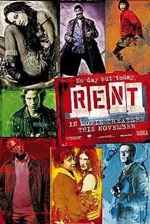
Starring: Taye Diggs
November 2005
“525,600 Reasons to Love This Multifaceted Musical”
Based on Puccini’s opera “La Boheme” and Jonathan Larson’s Pulitzer and Tony award-winning musical, Rent, which follows the lives of a group of friends in N.Y.C. over the course of one year, has finally made its way to the big screen. Many members of the original Broadway cast appear here, including show-stoppers Anthony Rapp (A Beautiful Mind) and Idina Menzel (“Wicked”).
The movie is a rock opera that focuses on the various aspects of struggle—the struggle to find love and acceptance, the struggle to overcome prejudice and loss and the struggle to make rent while trying to stay warm in a drafty East Villiage flat during the frigid winter months. Interspersed among the exceptional musical numbers are dramatic vignettes involving some very human, and therefore, very messed up characters. Take roommates Mark (Rapp) and Roger (Adam Pascal), for example. Mark is an aspiring movie director, whose ex-girlfriend, Maureen (Menzel), left him for another woman. Roger is numb from a recent loss and has a hard time opening up and letting anyone into his wounded heart. African American computer whiz, Tom Collins (Jesse L. Martin), faces the bitter reality that his cross-dressing lover, Angel (Wilson Jermaine Heredia), will soon die of A.I.D.S.
Though some of the subject matter is unabashedly adult in tone and content, Rent is an excellent window into the turbulent realities of inner-city life. Director, Chris Columbus, who’s known more for his family-friendly fare (Home Alone, Mrs. Doubtfire), stays true to the overall feel of the play, while skillfully translating it to the silver screen. Borrowing talent from the Broadway musical was a stroke of genius by the casting department—chemistry is hard to manufacture and the Rent ensemble is simply astounding. Besides the exceptional vocal performances, the movie also boasts brilliantly choreographed sequences, which really amp up the movie’s frequently somber storyline.
When all is said and done, the opening number “Seasons of Love,” by itself, is worth the price of admission. So, if you didn’t get a chance to see the movie in the theater, you owe it to yourself to go out and Rent it.
Rating: 3
Pride & Prejudice (PG)
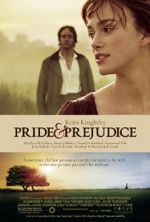
Starring: Keira Knightley
November 2005
“Carried By Source Material if Not by Leads”
When I saw the trailer to this newest big screen foray based on Jane Austen’s timeless novel Pride and Prejudice, my reaction was, “Why do we need another one of those?” Having seen the 1940 B&W masterpiece with Sir Laurence Olivier and the 1995 sprawling, yet engrossing, five hour mini-series starring Colin Firth, I saw little reason, much less room, for yet another film on the subject. For the most part, my initial reaction was allayed by a movie that entertains while upholding the artistic integrity intrinsic in the source material.
There’s no doubt that the acting and creative elements in the movie are superb (a finely-crafted update of Austen’s classic romance, to be sure), but the apparent chink in the proverbial armor here is the story’s abridged content and rapid pacing—anyone familiar with the novel or previous movies will feel like this version is permanently stuck on fast forward. But, perhaps leaner is better…the main thrust of the story remains intact without the usual afternoon teas that drag on ten minutes or the extensive character development of peripheral players. What, at first, appears to be a drawback might actually be the finest attribute of the film—a streamlined plot.
Keira Knightley is certainly the most comely Elizabeth Bennett ever to grace the silver screen and her acting, arguably, is tantamount in distinction. On the flip side, Matthew Macfadyen is the most lacking Mr. Darcy yet…but in all fairness, he had some colossal shoes to fill. Macfadyen’s Darcy is more dour, distant and miserable than the previous interpretations of the character and if his performance succeeds at any point it’s the movie’s excellent (adapted) dialogue that allows him to accomplish this more than any other single factor. The character’s thinly-veiled sarcasm isn’t rocket science—when Elizabeth asks Darcy if he dances, any decent actor could have pulled off the sardonic retort, “Not if I can help it.” Donald Sutherland’s Mr. Bennett is more aloof and less quarrelsome with his wife here and, unfortunately, is a virtual non-factor in the movie.
As mentioned before, the movie’s costumes and sets are Oscar-caliber and the choreography for the dance sequences is absolutely brilliant. Like two ships of the same era firing cannonballs at each other, Elizabeth and Darcy speak in short phrases—incisive jabs shrouded in civility—as they pass each other in the dance line…one of the movie’s most amusing sequences.
This Pride and Prejudice may not measure up to previous efforts with the same title, but it’s still a literate and artistic film that appropriately updates Austen’s supreme romance and certainly will stand the test of time…at least until the next movie arrives.
Rating: 3
Walk the Line (PG-13)
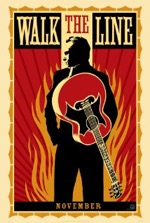
Starring: Joaquin Phoenix
November 2005
“Honest, Accurate Portrait of the Man in Black”
Following up last year’s smash-hit biopic, Ray, would be a daunting task for any movie, but Walk the Line, the tumultuous story of Johnny Cash’s passions and pitfalls, holds its own with remarkable performances and a screenplay that exudes authenticity thanks to its source material—Cash’s autobiography—and input from son and co-producer, John Carter Cash. Ray is referenced here because there are striking similarities between both movies, similarities that beg a closer examination.
Both Ray Charles and Johnny Cash were artists who not only rose to the highest pinnacle of the music industry, but also redefined their respective genres with charisma, innovation and sheer honesty born of tragedy. Both men battled infidelity on the road and both struggled with their addiction to drugs. Most strikingly, however, is that both men shared the same traumatic childhood event—through inaction, both Charles and Cash lost their brother to a senseless accident. It could be argued that the guilt and self-recrimination they experienced drove both men to drugs as a way of sublimating their emotional pain.
The events of Johnny Cash’s life certainly are powerful and dramatic, but the script is constrained by the need for veracity: what the story gains in authenticity, it looses in spontaneity, especially for those already familiar with the ups and downs of Cash’s career. In that regard, the movie would be easy to forget if not for the stellar performances delivered by the cast in general and the leads in specific. Reece Witherspoon is amazing as June Carter and Joaquin Phoenix is astounding as Cash—both portrayals are made all the more extraordinary by the fact that both actors did their own singing for the movie (like in Ray, musical interludes form the timeline and structure of the story and are enjoyable and memorable excursions from the film’s dramatic episodes). Witherspoon’s experience with playing upbeat debutantes really serves her well here, and Phoenix’s dramatic training on Gladiator and the Shyamalan films has clearly paid dividends in what is arguably the stand-out performance of the year.
Though his acting is fine, I just can’t bring myself to accept Robert Patrick as Johnny’s father, Ray Cash. About a year ago, I saw Patrick and Phoenix together in Ladder 49, and though Patrick is clearly the older of the two, he seems more like an older brother or uncle to Phoenix than a father figure. Further, I don’t feel the make-up department did a very good job of aging Patrick, especially in the final scene.
Stand-out scenes are plentiful in the movie and are certainly not limited to these: Cash auditioning with a local record producer who challenges Johnny to write songs that can change people’s lives, Cash’s ongoing struggle with substances climaxing with his meltdown and collapse on stage, Carter being verbally pummeled in a general store by a local woman who disapproves of her recent divorce, Cash’s manic attempt to free a brand new tractor from a mud pit only to land it and him in a nearby lake, Cash’s legendary concert at Folsom Prison where he makes a crack about the yellow water, and any scene that has the phrase “Where were you?” in it.
Director James Mangold (Identity) does an adequate, if not excellent, job with the paint-by-numbers script—Cash walking down the same dusty road as a boy and later as a man is a nice touch—but one wonders what the movie could have been with a more established/renowned auteur at the helm. The film runs a bit too long—the coda is unnecessary other than to show a mending relationship between Cash and his father. Mangold would have done better to freeze-frame the embrace between Cash and Carter—after Cash finally wears Carter down and she agrees to marry him in front of a live audience—and include a line about Cash’s reconciliation with his father in the concluding footnotes.
Walk the Line should receive numerous Oscar nods: besides excellent performances, the movie is inspirational in its offering of hope to anyone who, like Cash, has made some poor choices in life (who among us is immune to this condition?). Johnny Cash may have hurt himself and others in his lifetime, but he also found redemption in his later years and will be remembered for his humanness and musical brilliance for decades, and hopefully centuries, to come. Who said good guys never wear black?
Rating: 3
Elizabethtown (PG-13)
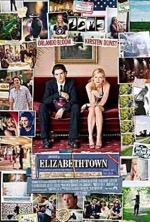
Starring: Orlando Bloom
October 2005
“Interminable Dramedy Is Nothing to Crowe About”
Every once in a while, a movie comes along that you really want to like, but you just can’t. The acting, directing, etc. is fine, but the sum of the movie’s parts leaves you dubious, disappointed or downright confused.
Speaking of confusion, the “Huh?” factor is ubiquitous in the latest five-course banquet served up by writer/director Cameron Crowe (Jerry Maguire). Dubbed Elizabethtown—a sprawling, writhing piece of dramatic/romantic yarn that tells an involved tale with little lasting value—the movie features some amusing vignettes, but ultimately neglects to provide an overarching theme.
Sneaker designer, Drew Baylor (Orlando Bloom), has created a new, cutting-edge tennis shoe that’s been rejected, en masse, by the shoe-buying public, causing the company he works for to eat a million dollars. Drew is in the process of attempting suicide when his frantic sister calls—Drew’s father has died. Volunteered by his immediate family to make the funeral arrangements, Drew catches a red eye flight to Lexington. An ebullient stewardess, Claire (Kirsten Dunst), befriends (virtually stalks) Drew, tries out some pop psychology on him and gives him a map of Kentucky and her phone number as he debarks the plane.
Drew experiences severe culture shock when he arrives in Elizabethtown: his entire extended family envelops him, each relative brimming with colorful stories about his deceased father whom he hardly knew. Drew is soon drawn into the middle of a heated debate regarding his father’s upcoming funeral: should his father be buried or cremated? Amid the craziness, Claire pops up again, but only to string Drew along some more until she finally deals with her commitment issues and allows the bud of her romantic feelings for Drew come into full bloom.
After two hours (which feels like two days), the movie, at last, brings us to the long-awaited and unconventional funeral, which features a swooping, flaming boar and a head-scratching tap dance by Drew’s mother, played by Susan Sarandon (I nearly checked out here). Most of the funeral belongs in a slap-stick comedy and feels incongruous with the rest of the movie.
When the funeral finally, mercifully concludes (my friend turned to me in the theater and whispered, “As far as I’m concerned, it’s not over.” He was right. The movie drags on for another half hour), Drew undertakes a journey of self-discovery and emotional healing—which is what the movie should have been about from the very beginning. As Drew drives across the central U.S., following clues that Claire has placed for him in advance, he works things out with his dad; talking, laughing and yelling at the ash-filled urn sitting in the passenger seat. This sojourn is the most enjoyable part of the movie, but, unfortunately, it can’t bail out the previous two hours, which are filled with exhausting character development of shallow lives and events both random (Chuck and Cindy’s wedding) and commonplace, all of which brings the viewer to a mental state similar to Drew’s before his sister calls.
Elizabethtown is an insipid comedy, a dense drama, a frequently aimless character study and a plodding quagmire of subplots all rolled into one—there’s no clear sense of place or purpose until the very end. Crowe’s direction is ponderous and the overall effect of the film is like a shot of Novocain in the brain—the numbness eventually wears off, and in a few hours, the spectator has no recollection of the movie whatsoever.
Bloom is fairly convincing and Dunst does her giggles and dimples best, but their solid performances fail to elevate the superfluous storyline and leaden dialogue, which is an amalgamation of the worst B-movie lines ever written. The most distracting element in the movie (besides Dunst’s atrocious Southern accent) is the voluminous soundtrack; a veritable Time Life collection of pop tunes that can be heard at regular intervals (generally every two to five minutes) throughout the film, the music feels less like a score and more like a juke box with a broken record.
In short, Elizabethtown is an utterly meaningless film that’s entirely too long (like this review). But, hey, it could be worse…the first cut of the film was eighteen minutes longer.
Rating: 2
Just Like Heaven (PG-13)
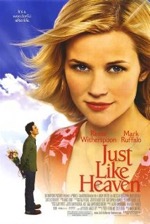
Starring: Reese Witherspoon
September 2005
“Metaphysical Love Story is Comely if Not Heavenly”
Elizabeth Masterson (Reese Witherspoon) has it all. She’s a young, beautiful, successful doctor, who is widely admired and resides in a quaint bay view apartment in San Francisco. The only thing she doesn’t have is the one thing she wants the most—a great guy she can settle down and start a life with; everything would be heavenly then. On one rainy night, Elizabeth, in a hurry to get home and change for a blind date, crashes into the side of a semi-truck.
Enter David Abbott (Mark Ruffalo), an architect who is searching for a new dive when a flyer advertising Elizabeth’s place blows right into his face. Taking that as a sign, David moves in and makes himself at home (spilling chips and soda on the sofa), much to Elizabeth’s dismay and disapproval. Inevitably, the two tenants meet and the sparks immediately start flying. After a vehement argument, David eventually proves to Elizabeth that she’s dead—he can see her, but nobody else can.
David begrudgingly assists Elizabeth in tracking down clues about her life—it’s a journey of discovery for the pair as they strike up an uneasy friendship that deepens as they continue picking up loose threads together. There are plenty of “crazy man talking to someone who’s not there” scenes (the bit where David gives a choking man first aid with instructions from Elizabeth is extremely funny), but ultimately they end up at the hospital where Elizabeth had previously worked. While David grills a nurse who worked with Elizabeth, the spectral Elizabeth passes through a wall and discovers the movie’s first major twist—she sees herself on a hospital bed lying motionless in a coma.
David later learns from his best friend that Elizabeth was the one he was supposed to meet on the blind date that fateful night—somehow, even though they never met, there’s a spiritual connection between David and Elizabeth, which you would never guess from the way they constantly toss acidic barbs at each other.
The last major twist, which gives the trolling plot a much-needed jolt of urgency, comes when Elizabeth’s sister, Abby (Dina Waters), reluctantly decides to sign the papers authorizing the hospital staff to pull the plug. Now it’s a race against time as David, translating Elizabeth’s words from beyond (a la John Edward), tries to convince Abby that Elizabeth is still alive.
Based on the book If Only It Were True by Marc Levy, Just Like Heaven has undeniable shades of Ghost and Heaven Can Wait, and though often derivative, the movie is carried by strong performances and an accessible story that packs an unexpected, emotional punch. The movie’s director, Mark Waters (Mean Girls), has crafted the quintessential dromedy, which should appeal to a wide audience with its wit, pathos and uplifting fifth act.
If you can deal with the metaphysical quagmires in the story, Just Like Heaven is a heart-warming tale that exemplifies the unquenchable human spirit and is easily one of the finest examples of its genre ever crafted. Just Like Heaven? Not quite. But for earthly entertainment it’s a sweet and charming repast.
Rating: 3
Bewitched (PG-13)
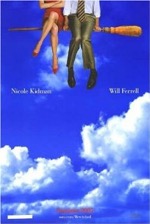
Starring: Nicole Kidman
June 2005
“Adds Modern Ingredients to the Old Witch’s Brew”
Instead of simply upgrading the 60’s sitcom to the big screen, this new, improved Bewitched takes the viewer inside the casting process and tedious production of a new TV series and the drama that swirls around the re-telling of a classic show. Sound confusing? It’s not; in fact, the entire movie is dull and overly simplistic—it doesn’t take a crystal ball or tea leaves to figure out the paint-by-numbers plot, and the one area of the movie where magic should have fulminated like a fireworks finale—the relationship between Jack Wyatt (Will Ferrell) and Isabel Bigelow (Nicole Kidman)—is pedantic and predictable.
To be sure, Ferrell and Kidman are fine actors, but their chemistry here is scanty—like the amount of onscreen time actually dedicated to the romantic subplot—and their relationship is asserted not shown. Very little character development is conjured up in the movie, save for Isabel’s struggle against her insatiable desire to get whatever she wants by using magic...she’s a reformed witch. Her antagonizing father (Michael Caine) pops up from time to time (as the Gorton’s Fisherman or Jolly Green Giant in the freezer aisle—the most creative visuals in the film), and heckles her over the futility of eschewing her magical powers. Though hard-fought and heart-felt, Isabel’s internal battle with her own nature is a loosing effort; she abandons the kenosis and is soon back to her old lobe-wiggling tricks.
The scene where Jack meets Isabel in a café—Jack observes Isabel’s natural ability to do the “nose twitch” and convinces her to audition for the new Bewitched show, Isabel agrees because she mistakenly thinks Jack is the perfect man—is utterly doltish...in fact, most of the scenes on the TV set are downright silly. Shirley MacLaine’s character, an undercover witch, is really more of a nuisance than a supporting player. Uncle Arthur’s (Steve Carell) random appearance serves as a voice of reason for Jack, who clearly needs to catch a clue about Isabel’s attraction to him, but the scenes are so teeth-grindingly annoying that after Carell’s character exits the screen, you have to scratch your head and wonder what the heck it was you just saw. There are only two standout scenes in the movie: 1. On the set, red-faced Isabel tells Jack he’s a jerk, and 2. Jack fails to realize Isabel is a “real” witch until she pulls out her broom and takes flight.
Though Bewitched casts a weak spell, it somehow works as mindless entertainment. As bad as the movie is, it would have been even worse if the producers had taken the easy route and simply made Bewitched a retread of the original series. Either way, Bewitched suffers from remake-itis…there’s little magic here.
Rating: 2 1/2
The Perfect Man (PG)
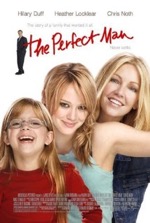
Starring: Hilary Duff
June 2005
“Average Love Tale is Anything But Perfect”
The normal response to a breakup is a desperate rebound or a period of profound depression. An extreme or dysfunctional reaction to a severed relationship is when you pack up your troubles and move to a new town. Such is the repeated and unhealthy pattern of Jean Hamilton’s (Heather Locklear) tumultuous love life. After the latest in a long line of failed relationships, Jean uproots her family, again, and moves them to Brooklyn. Jean’s teenage daughter, Holly (Hillary Duff), has a personal website that lampoons her family—on it she grouses about her transitory life and her mom’s predilection for botching relationships and, indeed, choosing losers in the first place.
It’s not long before Jean attracts a well-leavened doughboy at the bakery where she works—a needy, heart-on-the-sleeve type named Lenny (Mike O’Malley), who employs such lines as, “Where did you buy those pants…Hottie.com?” Eventually, Lenny wears Jean down and takes her to a Styx concert—he cries nostalgic tears through the entire performance and uses her sleeve as a handkerchief. Jean is so desperate for the perfect man—or any man, for that matter—that she looks past Lenny’s neurotic behaviors and seriously considers saying yes when he serenades her from the fire escape and proffers her an engagement ring.
Holly detests Lenny and goes into emergency split up mode, especially when she meets her new girlfriend’s uncle Ben (no pun intended, I’m sure). In Holly’s mind, Ben (Chris Noth) is the perfect man, but if her mom ever meets him, she’ll find a way to sabotage the relationship—as she always does—and Holly and her younger sister will be forced to move again. Holly begins sending letters and emails to her mom as Ben and begs Adam (Ben Feldman), her high school crush, to call her mom posing as Ben. Jean admits that Ben sounds like the perfect man, but Holly’s plan backfires when Jean wants to meet him. “Ben is a beautiful idea, but you can grow old with an idea,” Jean reasons.
Though Holly consistently displays more common sense than her mother in the movie, the writers involve her in some silly matchmaking scenes like the orchid delivery or the mishap at the restaurant where she sets off the fire suppression system to prevent her mom from encountering Ben—these sequences attempt to generate peril and move the slogging plot along, but to no avail. As the script would demand, Jean and Ben finally meet at the movie’s gloaming, but the casual manner in which they speak to each other tells us what we’ve known all along…there’s no guess work here, no mystique, no panache, only a foregone conclusion.
The movie’s entire premise is a sick one—an abnormal scenario that should repulse most viewers. The Perfect Man is contrived, formulaic and predictable at every turn, with a hurried and unsatisfactory ending and performances that match the mediocre script. It’s never explained why Jean keeps relocating her family every time a relationship ends; did her father abandon her when she was young? Did Jean’s mother also run away every time her heart was broken? A much better story would have been: Jean and Ben hook-up earlier in the movie but Jean panics the first time their relationship hits a speed bump and falls back into the old pattern of wanting to run away. Ben confronts Jean and opens her eyes to her insecurities; they work through her issues and then they live happily ever after. Though such a dramatic tangent would dull some of the chick-flick edge, at least it would lend the movie some semblance of a plot.
Romance movies are among the hardest to pull off on the big screen and The Perfect Man is the perfect example; the movie plummets even with the two cuties (Locklear and Duff) and debonair Noth. Just as it was kismet that Jean and Ben would meet at the end, it was also destiny that the film would fail to meet our expectations.
Rating: 2
Mr. & Mrs. Smith (PG-13)

Starring: Brad Pitt
June 2005
“Smith Happens in This Paranoid Bullet-Fest”
Brad Pitt and Angelina Jolie are big-screen eye-candy—a built-in box-office draw for ogling members of both genders—but it’s too bad the script they had to work with here wasn’t as sweet. Mr. & Mrs. Smith is one paranoid affair: for five or six years, John (Pitt) and Jane (Jolie) Smith have maintained the semblance of a perfect marriage while leading double lives as assassins for two different covert agencies. Jane always has dinner ready when John gets home at seven pm, and they dispassionately discuss their days’ like two news anchors covering a human interest story—their table talk is peppered with so many generalities and pleasantries, you’d swear the pair just met for the first time. The escalation of knives sequence is amusing as is Jane’s oven armory, but these scenes soon grow tiresome because the audience is in on the joke, but the Smith’s aren’t.
At the thirty-minute mark, the first hint of a plot surfaces when John and Jane are assigned the same mission by their respective agencies. The operation is bungled and the match is a draw, but the evidence left behind leads the Smith’s to a startling discovery (one that we’ve known about since we saw the trailer)…their spouse is an enemy agent. There’s a scene—which becomes tedious after the first volley of bullets—where the Smith’s make Swiss cheese out of their house while trying to kill each other with an arsenal of guns, knives and any other weapon they can get their hands on. When attrition finally sets in and a stalemate becomes evident, the Smith’s realize all the blood, sweat and passion is a turn on and they begin making out amid the rubble; but the reunion of lovers is short-lived as another group of assassins arrive and put more holes in the walls.
Having sat through the first half of the movie in chronic boredom and utter disappointment, I found the last half to be a vast improvement: the Smith’s team up against a common enemy and finally open up and share the truth about their sordid pasts. I found their banter to be especially amusing during the car chase scene—Jane admits to having hired stand-in family members at their wedding—and the final, destructive showdown in the warehouse is an elegant death dance with Matrix-style action shots.
Vince Vaughn plays his standard wide-eyed weirdo as John’s best-friend-turned-enemy and Kerry Washington briefly pops up as one of Jane’s aides. I have no qualms about the acting, but the trouble with Mr. & Mrs. Smith, besides its skewed reality of extreme deception and destruction, is that it becomes a parody of itself. Perhaps this story would have worked better as a sci-fi film, as our disbelief would already be suspended to lofty heights. In the real world, this kind of paranoid farce only flies if you’re watching Alias at a fondue party—and you don’t have to pay ten dollars for that!
Rating: 2 1/2
Guess Who (PG-13)
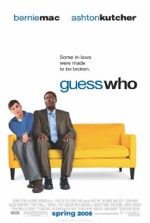
Starring: Ashton Kutcher
March 2005
“A Mediocre Meet the Parents Rehash”
The movie’s title asks a question anyone who’s seen the trailer knows the answer to. Unfortunately, like most movies these days, the best scenes from Guess Who were spoiled in the trailer, which promised a light-hearted romantic comedy dedicated to watching a young white man squirm as he meets the parents of his black girlfriend.
Guess Who is the latest in a long line of feeble attempts at “modernizing” classic movies—in this case, Spencer Tracey’s 1967 melodrama, Guess Who’s Coming to Dinner. Here, races are reversed and Simon Green (Ashton Kutcher) must stare down his girlfriend’s watchdog father, self-styled bank loan officer, Percy Jones (Bernie Mac). At first, Percy can’t stand Simon and does everything in his power to make Simon’s life miserable, including sleeping with him on a hide-a-bed in the basement and padlocking the basement door. Over time, Percy begins warming up to the idea of Simon and his daughter, Theresa (Zoe Saldana), being together, but not before the stubborn pair become embroiled in spats, accidents and a lonely night apart from their sweethearts.
A movie of this kind, clearly, had more social relevance in the turbulent 60’s than it does in present-day America—the racial tension the script seeks to employ has marginal effectiveness in our world of increasing tolerance. As a result, the movie is an insipid comedy that tries to be funny, receiving meager support from its middlebrow premise and anemic screenplay. Granted, there are a few chuckles to be had, but other than Mac and Kutcher’s on-screen chemistry (which is better than Kutcher’s chemistry with Saldana), the film is a ponderous dirge of maudlin moments and slapstick situations—I found myself forcing an occasional laugh just to help the movie along.
Besides borrowing thematically from the aforementioned Guess Who’s Coming to Dinner, Guess Who also bears a striking resemblance to two other modern films from the same genre: Father of the Bride and Meet the Parents (even the poor sequels to those movies are better than Guess Who). Sad to say, if it wasn’t for Bernie Mac’s pitch-perfect portrayal of the disgruntled, overprotective father, Guess Who wouldn’t even be worth the stock it was filmed on.
With its countless contrivances, predictable plotline and knee-slapping one-liners, Guess Who is a middling comedy that fools audiences into thinking they’ve had a good time, while failing to service them in any significant way. If the producers think they’ve created a feel-good, crowd-pleasing romantic comedy, they should guess again.
Rating: 2
Hitch (PG-13)
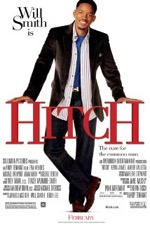
Starring: Will Smith
February 2005
“Educational Love Tale Wastes It’s Time on Silliness”
Alex “Hitch” Hitchens (Will Smith) is a smooth operator—perhaps too smooth for his own good. He has all the insights into the female psyche that elude the common man and knows just what buttons to push to gain a desired response from the fairer gender. Fittingly, his occupation is romance counselor and the movie opens with Hitch accepting a tough assignment—a very stiff suit named Albert Brennaman (Kevin James), who is head-over-heels for affluent and radiant socialite, Allegra Cole (Amber Valletta). To say that Allegra is way out of Albert’s league would be the understatement of the year, but Hitch is equal to the task and immediately begins training the stocky, soft-spoken klutz, who seems to have a perpetual dollop of mustard on his shirt.
All goes according to script until Hitch encounters steamy Sara Melas (Eva Mendes), a gossip columnist who plays hard to get, but ultimately gives in to Hitch’s charms. Sara is a bit of a challenge, though; Hitch’s normal repertoire of flattering phrases and clever lines has little effect when he tries to crack her icy exterior. Their first date is a disaster—Hitch accidentally kicks Sara in the head, unwittingly dredges up an unwanted reminder of her family’s shady past and looses his top shirt when it gets caught in a cab door.
All of a sudden, Allegra is warming up to Albert (despite some minor missteps) and the Date Doctor is struggling just to keep his foot in Sara’s door. This is when the fun begins…the novice is rounding first base, while the master is royally botching what should be an easy conquest. Hitch is faced with the fact that he has no long game and realizes he’s the expert on something he really doesn’t understand. The resolution is a bit standard for a romance film, but humorous situations and solid acting sustain the light-hearted story.
Some of the humor works well (the vehement vegetable toss in Hitch’s apartment and when Albert tosses his inhaler and plants one on Allegra), but some of it is so unrealistic that it belongs in a slapstick comedy (the food allergy sequence is sophomoric and brings to mind a swollen-faced Martin Short in Pure Luck). Smith and James have great screen chemistry and play the “dancing” and “kissing” role-playing vignettes extremely well. Mendes’ character comes close to being fully realized, but her screen boss (Adam Arkin) is little more than set dressing.
In the end, Albert does everything wrong and still wins over Allegra and Hitch learns that there are no clear-cut rules when it comes to relationships. One wonders if there will be a sequel, and if so, will Sara and Alex get Hitched?
Rating: 2 1/2
In Good Company (PG-13)
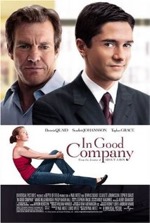
Starring: Dennis Quaid
January 2005
“Lighthearted Dramedy is Good, But Not Great”
The changing face of corporate America! That pretty much sums up the plot to In Good Company. Oh, and never date the daughter of a man you just demoted.
Neither an all-out comedy, nor a full-on drama, In Good Company won’t be mistaken as a barnburner, but it certainly isn’t a bad way to spend two hours. Dennis Quaid plays Dan Foreman, veteran ad man at Sports America magazine; husband to Ann (Marg Helgenberger) and father to Alex (Scarlett Johansson). The company that owns the periodical is sold to a rival corporation and callow upstart, Carter Duryea (Topher Grace) is sent to head up the advertising department where he promptly supplants Dan and fires half the staff.
Carter relies heavily upon Dan, his “wing man,” for marketing advice, because he’s way out of his depth: the only thing Carter knows how to do is talk—his improvised motivational speeches and ad hoc solutions get him out of one jam after the next. Being a quick thinker and fast talker has always gotten him by in the past, but Carter quickly realizes he’s a sham; his recent divorce from his wife (Selma Blair) makes that painfully obvious (now he sleeps on a couch at work). After his promotion, Carter buys Porsche, but gets in an accident the moment he drives it off the lot (he doesn’t even know how to use a stick shift), presenting the image of a man so driven by the need to succeed that he’s never taken the time to learn anything on the way up.
A word that pops up a lot in the movie is “synergy,” and while the film’s pacing often lacks it, the incisive commentary on the capricious nature of the business world is amusing and didactic. Revered financial maven, Teddy K. (Malcolm McDowell), delivers a sermon on synergy at a staff meeting and uses an array of high-sounding words to mesmerize a pack of “yes men” at the office, but Dan isn’t bamboozled and stands up to the blathering businessman. This risky move results in Dan getting his old job back and Carter and his cronies getting fired. Though his failed relationship with Alex provides him with some clarity, it’s Dan’s firm hand (and right cross) of guidance that brings Carter to a place of self-discovery. In the end, poetic justice is served—the young man so bent on getting ahead in life, ends up with nothing.
Morality lesson aside, the movie has some great character moments—like when Dan and Carter first meet and compare ages, or when Carter invites himself over for dinner. However, for some inexplicable reason, In Good Company never fully realizes its potential, despite excellent performances and a decent storyline. Like it claims in the title, the movie isn’t great, nor is it poor—it’s simply “good.”
Rating: 2 1/2
Meet the Fockers (PG-13)
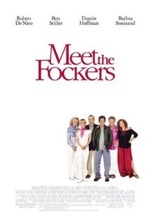
Starring: Ben Stiller
December 2004
“Great Performances Fail to Save Unoriginal Sequel”
The movie opens with a sequence of fortunate events for Greg Focker (Ben Stiller) and Pam Byrnes (Teri Polo)—someone gives up their cab for the couple, all the stoplights turn green for them on their way to the airport, and Greg’s oversized carry-on is taken to the captain’s personal storage locker. Of course, we all know this streak of good luck won’t last for long…and it doesn’t.
Meet the Fockers, the sequel to the popular one-disaster-after-the-next flick, Meet the Parents, is a nothing more than a retelling of the original—the only new element is the addition of Greg’s parents into the dysfunctional mix. Bernie Focker (Dustin Hoffman) is a semi-retired lawyer who sports a dark tan and an array of Hawaiian shirts and his wife, Roz (Barbara Streisand), is a sex therapist for the geriatric set.
Robert DeNiro is back as the stiff and ever-paranoid former C.I.A. agent, Jack Byrnes, and his screen wife, Dina (Blythe Danner) remains the only voice of reason in the midst of calamitous family get-togethers. Greg and the Byrnes’ pile into Jack’s new, state-of-the-art R.V., which is tantamount to a fine motel room on wheels (complete with hidden spy suite), and head to the Focker house in sweltering gator territory. Jack’s grandson from his other daughter joins them on the road trip, and it quickly becomes clear that the only purpose the child serves is to provide a cute face and some comic relief.
If there is a part of the movie that plays well, it’s the friction between Jack and Bernie; from the moment Bernie hugs Jack and pecks him on the cheek, you know it’s going to be a long visit. These fathers—and families—are diametrically opposed when it comes to lifestyles and worldviews and the sparks fly high and often during “family times.” As if things aren’t going rough already, the startling revelation that Pam is pregnant sends both families reeling. Of course, issues are worked out and relationships are mended or built by movie’s end and a humorous wedding wraps up the zany storyline. Owen Wilson reprises his role as Pam’s former fiancé and is the priest that marries the happy couple (Wilson singing in Hebrew is a hoot).
To its own detriment, Meet the Fockers returns to the same well that spawned its predecessor—the Murphy’s Law sequences feel forced and their predictability really detracts from the movie’s intended impact. The film is loaded with crude humor and some scenes are just plain wrong. It’s truly unfortunate that this amazing array of talent was wasted on such pedestrian fare. I guess the most fitting reaction to the movie is right on the poster.
Rating: 2
Wimbledon (PG-13)

Starring: Kirsten Dunst
September 2004
“Surprisingly Fresh Sports/Romance Story”
At first glance, a movie with an identity crisis between a sports flick and a love story is a pretty bad thing. On the one hand, you run the risk of loosing male interest to some sappy romance and on the other hand, females not interested in sports will spend their movie money elsewhere. Wimbledon is a balancing act that, somehow, manages to pull off the difficult feat of becoming a successful sports/romance movie.
There are several contributing factors to this winning formula. First, the leads are attractive, intelligent and have great chemistry together. Paul Bettany (Master and Commander) plays Peter Colt, a thirty-something, nearly washed-up tennis player who’s taking his last shot at winning Wimbledon. Bettany imbues Colt with a brand of charisma that’s believable and endearing—his voice-overs, containing his innermost thoughts, really serve to humanize the character and provide an honest and refreshing portrayal of a struggling sports star.
Dunst (Spider-Man) plays Lizzie Bradbury, a serious newcomer to tennis who has a track record of being distracted by men during big tournaments. She falls fast and hard for Colt (the whole tennis connection), and a torrid romance ensues, much to the disapproval of Lizzie’s overprotective father, Dennis (Sam Neill).
The movie’s climax is predictable, yet uplifting; Colt wins Wimbledon, and, after weathering a series of relational storms, wins Lizzie’s heart. Colt retires, but Lizzie will continue pursuing her dream of becoming a champion at Wimbledon. And, as would be required of such a tale, they live happily ever after.
The star’s contribution to the movie cannot be overstated, but several supporting characters aid and abet Bettany in making Wimbledon a crowd pleaser. The aforementioned Dennis Bradbury (Neill) is solid, as is Peter Colt’s fanatical father, Edward (Bernard Hill of The Return of the King), and the young heartthrob Jake Hammond (Austin Nichols), who serves as fellow tennis competitor and underdeveloped antagonist. Also making cameo appearances are John McEnroe and Chris Evert, who provide some additional celebrity and credibility.
As an independent film, Wimbledon is a small release and will most likely not receive the attention its due. It’s a shame, because Wimbledon is a feel-good flick that reaffirms the notion that it’s never too late to achieve in life.
Rating: 2 1/2
Bobby Jones: Stroke of Genius (PG)
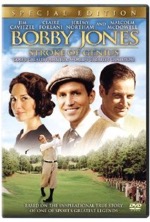
Starring: Jim Caviezel
April 2004
“Inspiring, True Story is a Hole in One ”
Football has Remember the Titans and Rudy. Basketball has Hoosiers and Space Jam. Hockey has Miracle and The Mighty Ducks. Baseball has The Rookie, The Natural, The Sandlot, Bull Durham, Field of Dreams, A League of Their Own and too many others to mention here. Now golf has Bobby Jones: Stroke of Genius, the definitive film on the subject.
Bobby Jones was arguably the greatest golfer to ever play the sport—he’s the only person in history to win all four major golf tournaments (the Grand Slam) in the same year. He was sickly as a child, but fell in love with golf at an early age, watching many golf legends play at nearby St. Andrews Golf Course in Scotland. By age fourteen, Bobby was a golf prodigy, but he retired at twenty-eight due to continued failing health and his desire to start a family.
James Caviezel (The Passion of the Christ) plays Bobby Jones, and his pitch-perfect performance reveals Jones’ many passions…both good and bad. Jones’ biggest detriments on the fairway were his explosive temper and potty mouth, both of which became manifest every time the ball went somewhere he didn’t want it to go. As a means of dealing with his debilitating condition, Jones also consumed great amounts of alcohol, which, of course, produced many additional problems. On the flip side, Jones was a decent and fair man, sometimes to a fault…at one tournament, he called a penalty on himself.
The supporting cast in the movie is exceptionally strong. Claire Forlani (Meet Joe Black) plays Jones’ supportive wife, Aidan Quinn (Practical Magic) portrays one of Jones’ golf heroes, and Malcolm McDowell (A Clockwork Orange) is Jones’ mentor (think Obi Wan with a golf club). Also appearing in a cameo role is well-known evangelist, Alistair Begg, who plays Stanley, friend of the family and a great golfer in his own right.
Stroke of Genius is a straightforward drama film that has little action, and, therefore, will seem boring to some moviegoers. The plot contains no major twists but does posit a tidbit of social commentary; Jones’ mentor makes the assertion that money is ruining amateur sports. In recent years, we’ve seen just how prophetic that statement was. Bobby Jones: Stroke of Genius is entertaining and heartwarming, but it certainly won’t go down as the greatest sports movie ever made.
Rating: 3
Welcome to Mooseport (PG-13)
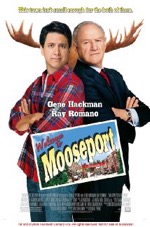
Starring: Gene Hackman
February 2004
“Welcome to Mediocre Entertainment”
Acting:
I don’t know what’s more amazing, the fact that this movie has a stellar cast or that a stellar cast would agree to do this movie. And stellar is no understatement. Movie stalwarts Gene Hackman (Runaway Jury) and Marcia Gay Harden (Mystic River) add their talents to the film, but seem out of place amid such pedestrian fare. Television hacks, Ray Romano (Everyone Loves Raymond), Maura Tierney (ER), Christine Baranski (Cybil) and Fred Savage (The Wonder Years) round out the cast, but there’s no stand out performance—here is a solid group of actors who desperately try to give weight to their roles but can’t because of the poorly written…
Screenplay/Story:
The scenario of a newly retired president of the United States running for mayor against the local plumber in a sleepy burg in Maine is just about as far-fetched as they come. Did the writers stop to answer the “Who cares?” question before they attacked their keyboards? Of course not! The only story element that gives Welcome to Mooseport any spice is the jealousy factor. Ex-president, Monroe “Eagle” Cole (Hackman) asks out Sally Mannis (Tierney) who is dating Handy Harrison (Romano). Sally is waiting for Handy to get the gumption to ask her to marry him, so she spites Handy and accepts the dinner invitation with Monroe. Now Monroe and Handy are fighting for the same office and the same woman. The date between Monroe and Sally also elicits jealousy from Monroe’s assistant (Harden), who has secretly admired the ex-pres. for years. In the end, Handy proposes to Sally and Monroe and his assistant hook up. And, with the exception of a thinly veiled election twist, that’s the extent of the plot.
Final Analysis:
Welcome to Mooseport tries to be funny, but isn’t. This is Ray Romano’s big screen debut and with a performance like this, he should stick to the small screen where he has great comedic success. The movie screams “low budget”…there are very few sets and the characters never leave the stifling confines of Mooseport. It’s too bad the story couldn’t support the caliber of actors it features and that its writers couldn’t come up with something more original and engaging.
Rating: 2
Intolerable Cruelty (PG-13)
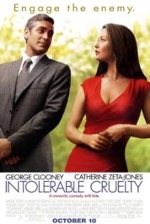
Starring: George Clooney
October 2003
“Undeniable Stupidity”
Intolerable Cruelty truly is the best phrase to describe this film, because, after fifteen minutes of watching this mind-numbing display of unbridled avarice and over-the-top acting, you’re ready to sign your life away just to get out of the theater. George Clooney plays shifty divorce lawyer, Miles Massey, who never looses a case until he looses his heart to his kindred spirit, Marilyn Rexroth, an alluring divorcee portrayed by Catherine Zeta-Jones.
As the movie progresses, it gets zanier by the minute as Rexroth leaves behind a trail of affluent, but easy-to-dupe husbands who make her filthy rich with prenups. As kismet would have it, Massey marries Rexroth, and, in a display of undying love, he rips up the prenup. on their honeymoon night. Rexroth betrays Massey, of course, and leaves him lovelorn and homicidal; but in the end, she comes to her senses and decides to return to Massey. And they live happily ever after…or something like that.
Intolerable Cruelty leaves you searching for a meaning behind its quirky and murky plot. It flirts with a message (love’s supremacy over the lust for money), but the story is so muddied by ambition, deception and shady morality that anything virtuous is undetectable when looking back on the film as a whole.
There’s a ton of foul language in the movie and the dialogue, when clean, is excessively stilted, employing quotes from Shakespeare and other literary giants in order to convey basic concepts. This renders the movie verbose, trite and unreachable. The movie tries to be funny, but it fails miserably—like the “sitting before the judge before” scene with Edward Herman as the cornball, Mr. Rexroth.
The major problem with the film is its lack of a protagonist—Massey’s exploits are hardly laudable and Marilyn Rexroth is a manipulative minx. And we’re supposed to cheer when they finally get together? What were Clooney and Zeta-Jones thinking when they accepted this script? Intolerable Cruelty is a terrible waste of star power and an egregious waste of time.
Rating: 1 1/2
Under the Tuscan Sun (PG-13)
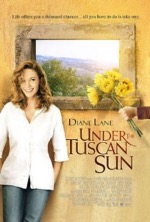
Starring: Diane Lane
September 2003
“Average Romance Shot in Timeless Tuscany”
Under the Tuscan Sun is a heartwarming romance that, mercifully, balances out the love story with artistic and dramatic panache, along with touching moments of genuine humanity. The movie’s success can be attributed to Diane Lane’s wonderfully organic performance and to the awe-inspiring Tuscany countryside which serves as breathtaking backdrop and nonhuman star in the film. Audrey Wells directed the movie and also wrote the screenplay, which is based on the memoirs of Frances Mayes.
Recently divorced, Frances (Lane) gets a wild hair and decides to relocate to Italy. Purchasing a modest home in a Tuscany villa, Frances finds the time for artistic pursuits as well as hosting parties when not renovating and maintaining her casa. After her heart has had the proper time to heal, Frances visits the coast and finds the man of her dreams—but even the perfect man, Frances learns, has his share of sordid secrets.
The movie’s pacing can make an insomniac drowsy, but Lane skillfully chews enough scenery to hold the audiences’ attention; the unconventional love story further aids in sustaining viewer interest. Under the Tuscan Sun is made memorable by the stunningly scintillating location work, but also by the uplifting story about a courageous young woman who ends one chapter of her life and boldly begins a new chapter on a different continent. Hope springs eternal…especially in idyllic Tuscany.
Rating: 2
Antwone Fisher (PG-13)
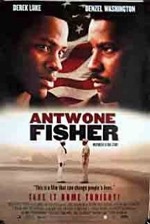
Starring: Derek Luke
January 2003
Denzel Washington’s directorial debut is—was there any doubt—a great piece of cinema. Based on a true story of the title character’s life, Antwone Fisher reveals the challenges of dealing with a painful past and the courage one can find when confronting those issues. Despite some heavy subject matter, Antwone Fisher is a triumph.
Rating: 3
Solaris (PG-13)
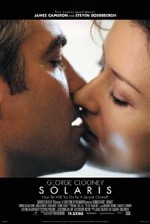
Starring: George Clooney
November 2002
It’s not often that I utterly despise a sci-fi movie, but here’s the exception. Dark, claustrophobic and static (not to mention, boring), the movie has no redeeming qualities. Solaris is pure, mind-numbing existentialism.
Rating: 1
Sweet Home Alabama (PG-13)
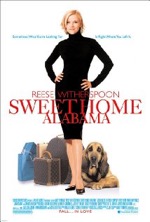
Starring: Reese Witherspoon
September 2002
There are a lot of things about this movie that are charming, and it’s nice to see a separated couple get back together, but some crass speech, foul language and crude humor really keep me from giving Sweet Home Alabama my full recommendation.
Rating: 2 1/2
The Four Feathers (PG-13)
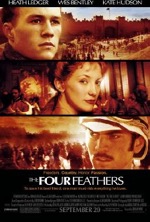
Starring: Heath Ledger
September 2002
This movie could have been so much more. Besides fudging on the history lesson, The Four Feathers failed to deliver on the emotion front. Static directing and uninspired acting add to the film’s malaise and render it mediocre at best.
Rating: 2 1/2
Serendipity (PG-13)
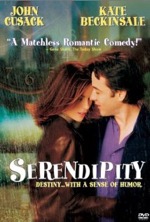
Starring: John Cusack
October 2001
A slightly better than average love story, Serendipity works because the romantic leads have great chemistry and because of the fateful book that reunites them. John Cusack and Kate Beckinsale are supported by some great performances by Jeremy Piven, Molly Shannon and Bridget Moynahan. The snow angel on ice scene stands out as one of the most memorable in the movie.
Rating: 2 1/2